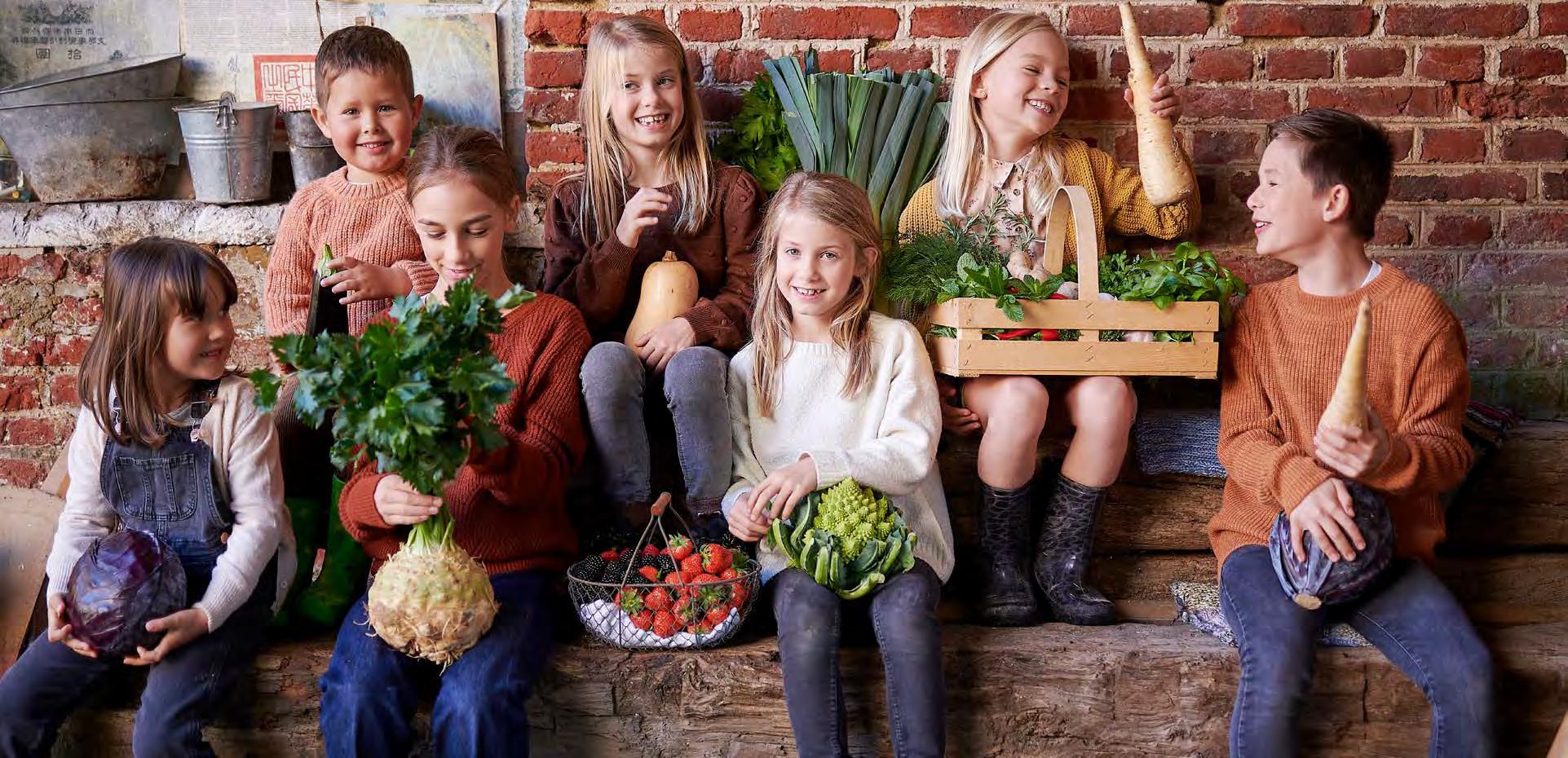
Ardo Corporate Sustainability Report 2023
About this report
This seventh Ardo Corporate Sustainability Report is the product of a journey that began in 2010. With this report, we aim to give external and internal stakeholders insight into our performance, strategy and material aspects regarding sustainability. The report discusses the social, environmental and economic aspects of sustainability for Ardo Foods NV, Ardo NV and any of their subsidiairies, hereafter referred to as “Ardo” and covers the fiscal year 2022-2023 (01/07/2022-30/06/2023) period.
If you have suggestions, comments or questions about this report and the sustainability strategy of Ardo, do not hesitate to let us know. E-mail: info@ardo.com
Find out more about our sustainability approach on the sustainability pages of www.ardo.com.
2
Foreword by the CEO
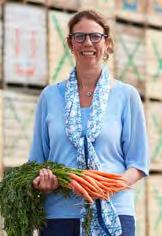
On the cover of this report, you are greeted by the joyous faces of a few of our team members’ children. They embody the future we strive to safeguard. The questions that echo in our minds, about climate, the future and the well-being of our children are catalysts for action. How do we ensure a world where nutritious food, nourished by the earth and sustained by responsible practices, is available for generations to come?
Our "Let's Meet in the Field" event last September was not just an event; it was a testament to our commitment to sustainability and regenerative agriculture. Over a week, we welcomed more than a thousand guests from our business ecosystem. During the event, we showcased our roots, beginning with two brothers, Edouard and Richard Haspeslagh, whose shared vision grew into the global force that is Ardo today. From the fertile lands of Ardooie to the acquisition of ArdoVLM in North America, we are proud to be a world leader in fresh frozen vegetables, fruit and herbs, distributing our products to over 100 countries.
Sustainability has been an integral part of our DNA since the very beginning. When Edouard started out, he was already focused on soil health and sustainable farming practices. As such, he paved the way for the sustainable agriculture practices we promote today. Now, we take pride in the fact that his granddaughter, Emilie Haspeslagh, will take this legacy to greater heights as our newly appointed Sustainability Director.
Sustainability is present in everything we do. It is the foundation on which we base our decision-making regarding customers, investments and the modernisation of our business. To stress our commitment, we have sharpened our purpose: it is our gift to the world to provide people nutritious, plant-based food, both today and for generations to come. All while preserving nature’s gifts and minimising our ecological footprint.
We want to share our take on sustainability in every way we can. That is why our achievements regarding sustainability and regenerative agriculture take centre stage in our new website, as well as in this new edition of our Sustainability Report.
Within these pages, audited figures tell a compelling story of our progress. A 20% reduction in our carbon footprint from 2020 sets the stage for an ambitious goal—a 40% reduction by 2030. We are contributing to a healthier plate by striving for zero residues on the final product. We achieved an impressive 78% for Ardo-grown vegetables in the past year and aiming for 80% by 2027.
Our commitment extends beyond statistics. We secured a sustainability-linked loan, reinforcing our dedication with two
environmental targets—carbon footprint reduction and residue-free production. We have embraced a circular economy, using recycled water reservoirs and biomethanisation to generate electricity from vegetable waste. And we are actively invested in enhancing the biodiversity in and around our growing areas through nature reserves, flower beds and beehives.
Regardless of all these positive realisations, we still see challenges. Climate change is increasingly disrupting our crop cycles, demanding innovative solutions. For this reason, we have launched MIMOSA+, our regenerative agriculture programme. Demonstrations during "Let's Meet in the Field" highlighted the main pillars of our MIMOSA+ programme, focusing on soil fertility, water conservation, enhancing biodiversity, cover crops and responsible fertiliser use. These practices collectively contribute to reducing our carbon footprint of field activities. It is our way of not just adapting but thriving in the face of climate change.
As you delve into these pages, remember, we cannot tackle these challenges alone. The impact of climate change resonates throughout our business ecosystem—from farmers and producers to Ardo, consumers, governments, banks and universities. Each entity plays a role, each voice contributes to the symphony of change. We invite you to join forces, to address the significant challenges ahead, to secure a future in which our children thrive. A future full of healthy fresh frozen vegetables, fruit and herbs. This will be the legacy we proudly pass on.
Let this report be a testament to our collective responsibility —a gift from Ardo to the world.
Gabrielle Kalkwijk, CEO Ardo
3
Our sustainability programme, aligned with the UN Sustainable Development Goals and EU Green Deal ambitions.
Our commitment to the UN Sustainable Development Goals (SDGs)
The SDGs are an integral part of our sustainability programme. They guide us in taking the appropriate decisions that ensure the future resilience of our business throughout our integrated value chain – from responsible sourcing and sustainable operations, to delivering healthy and nutritious food to the consumer’s plate.
Europe leads the way
The European Commission has translated the objectives of the Paris Agreement into the European Green Deal. This European growth strategy transforms climate and environmental challenges into opportunities, to ensure a just and inclusive transition for all. At the heart of this Green Deal is the European Farm to Fork Strategy, which strives to accelerate our transition to a sustainable food system. Ardo follows the ambition from Europe by reinforcing it's sustainability initiatives.









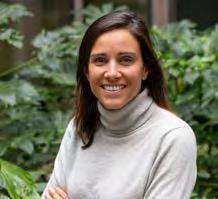
“Ardo aspires to support the needed transformation of the global food system.”
Emilie Haspeslagh Sustainability Director
Global food production is both a contributor to and a victim of climate change. A third of global greenhouse gas emissions as well as up to 80% of biodiversity loss are generated by food production and distribution. Simultaneously, over the last six years, we at Ardo have faced a decrease in field yields due to climate change. Furthermore, the global food system is implicated in a health crisis through insufficient food, lowquality diets and overconsumption.
All these trends underline the urgent need for a radical transformation of the global food system.
At Ardo, we aspire to contribute to this transition by offering nutritious, plant-based products to consumers and by reducing our own environmental impact during the production of these products. Our fresh frozen products can also positively contribute to the reduction of food waste. To demonstrate
our climate dedication, we have signed the commitment letter to the Science Based Target initiative (SBTi) on the 1st of December 2023.
We also aim to enhance our resilience to climate change through our MIMOSA+ programme, which focuses on restoring the health of our soils and the implementation of regenerative agriculture practices. Our "Let's Meet in the Field" event in September 2023 was a major milestone in our climate adaptation plan.
However, we cannot realise these ambitions on our own. We need to work together with our farmers, employees, customers and the wider community. We need people to come together more than ever to jointly address the challenges we face. WE NEED YOU!
4

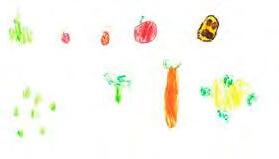
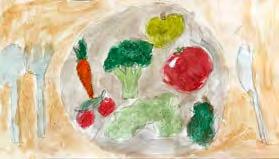
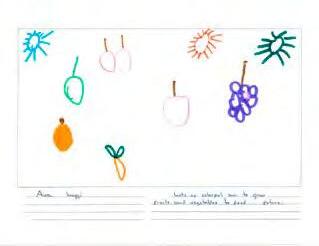
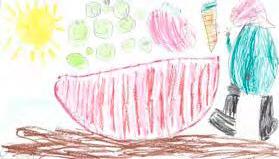
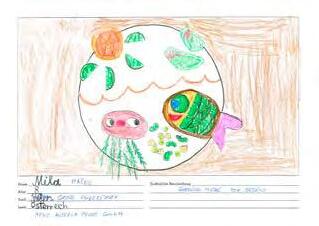
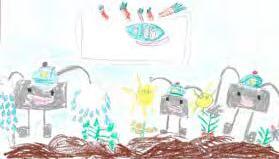
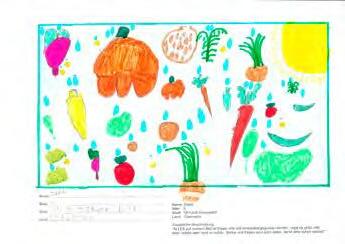
Ardo's mission through the eyes of children
Ardo feeds the future.
It is the common thread that runs through this Sustainability Report. It is also why we are listening to the next generation by encouraging the children of our employees to get creative.
We asked the children to depict what kind of food we will be serving in the future, how farmers will be working the land to grow healthy vegetables, fruit and herbs, what healthy eating means for them or what the food of the future will look like. Lots of children were inspired to make these beautiful drawings.
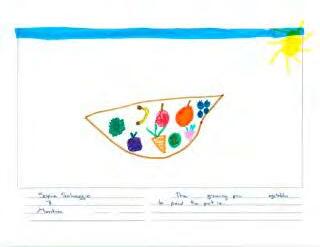
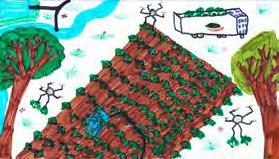
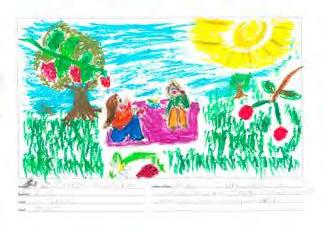
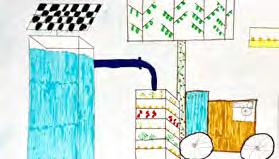
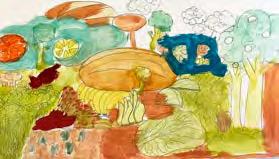
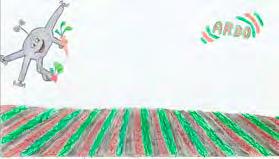
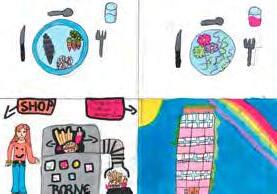

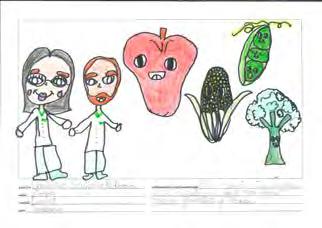
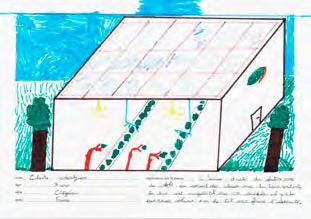
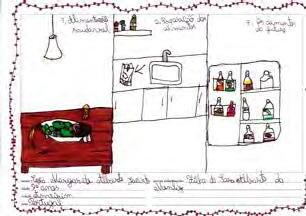
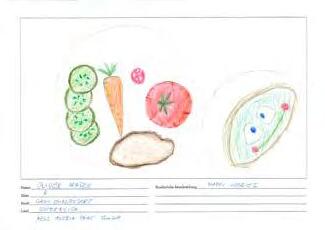
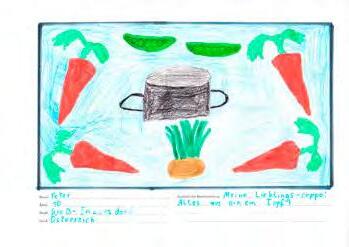


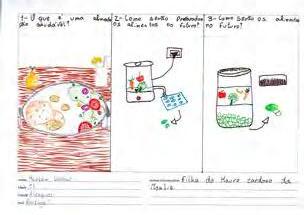

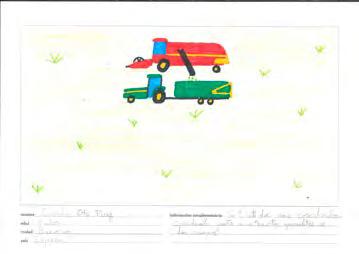
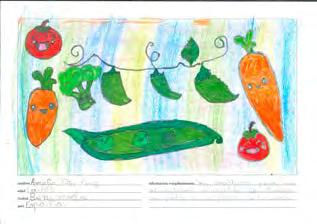
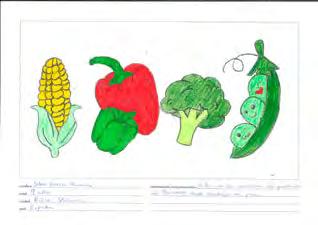
5
Noa, 9 years
Linde, 11 years Dominik, 9 years
Amélia, 6 years
Victor, 10 years Ava, 5 years Bastien, 5 years Sofia, 7 years Jeanne, 11 years
Arno, 6 years Mila, 9 years Marion, 8 years Clémence, 8 years
Claire, 7 years
Elle, 9 years Oliver, 10 years Peter, 10 years
Daniella, 7 years Sofia, 9 years
Lene, 8 years
Carlos, 9 years Silvia, 9 years
David, 6 years
Varla, 7 years
Miriam, 11 years
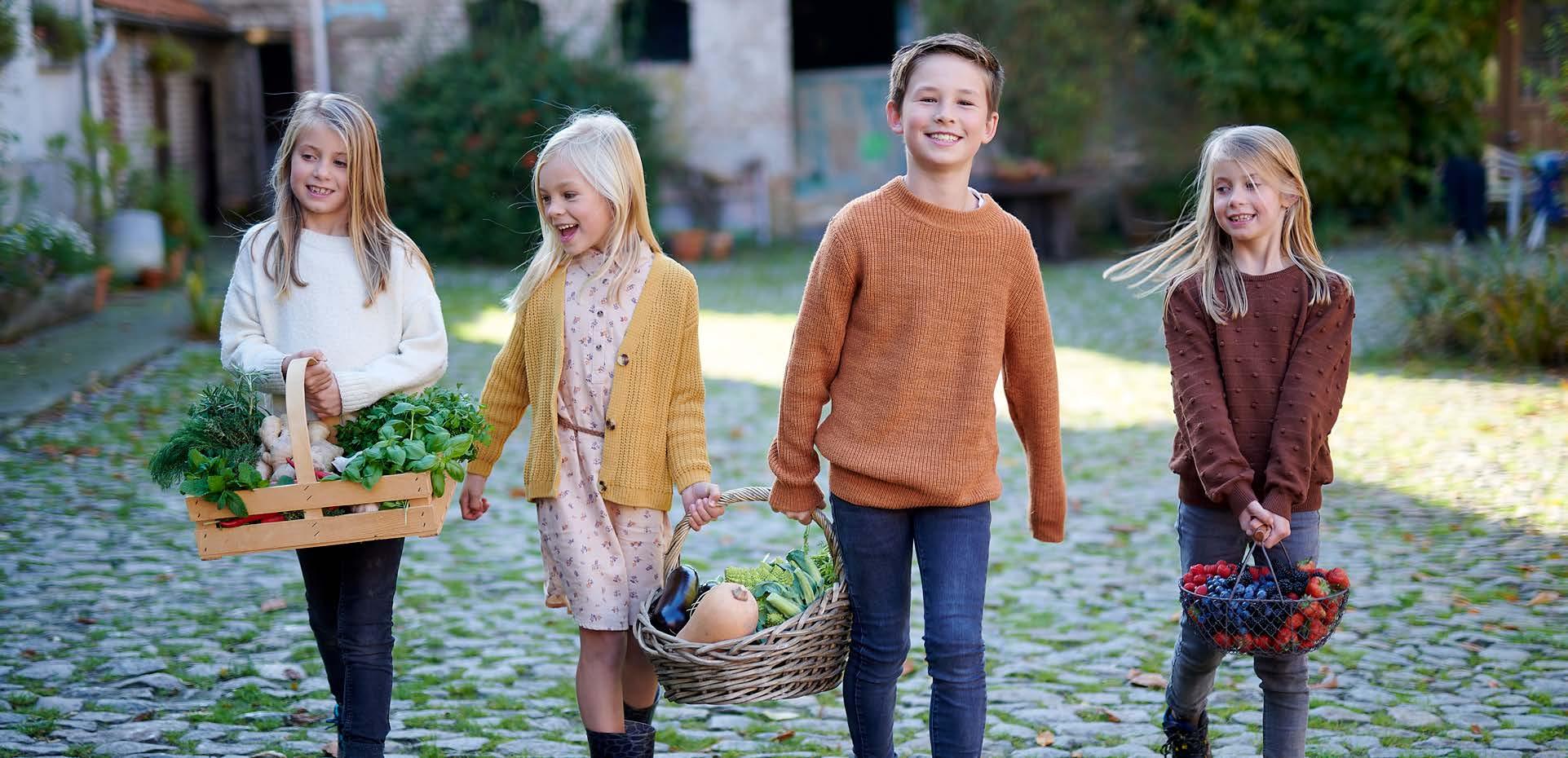
Step into the world of Ardo, a family company that produces a diverse range of fresh frozen vegetables, herbs and fruit. We believe in preserving nature’s gifts for future generations by providing fresh frozen, plant-based food while minimising our impact on the planet.
We are Ardo The path to a more sustainable food system
Food
safety, quality and innovation Respect for our employees Relationship with our stakeholders Good governance
6
Minimal environmental impact Agronomy MIMOSA+
1. Ardo in numbers
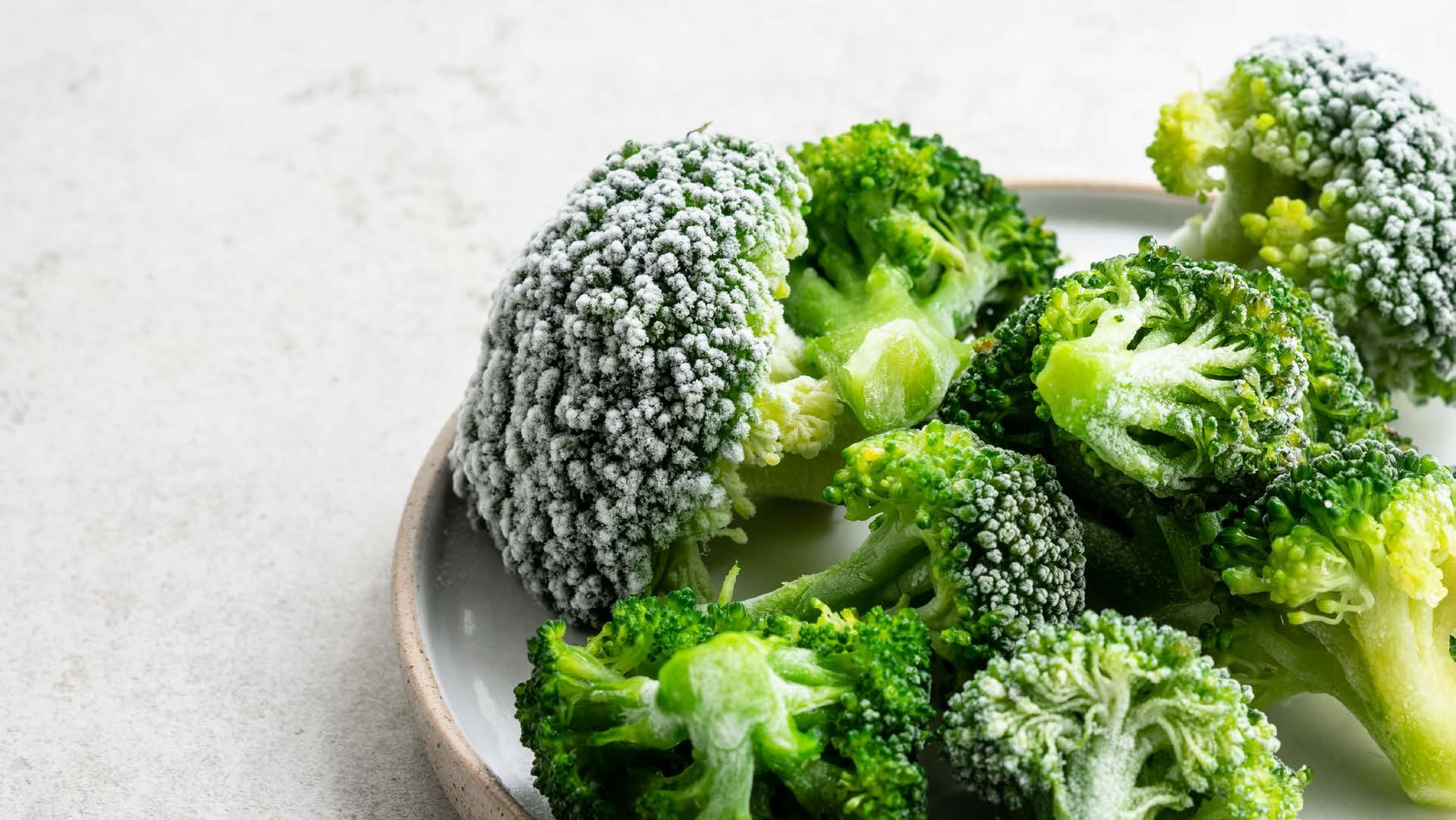
These figures showcase our global leadership in fresh frozen vegetables, herbs and fruit.
Operating across 17 sites in 8 countries.
Generating an annual revenue of €1.4 billion.
Distributing over 947,000 tonnes of frozen produce annually.
Exporting to 100+ countries.
Working together with more than 3,300 colleagues.
Partnering with 3,500 growers.
7
Food safety, quality and
Respect for our employees Relationship with our stakeholders Good governance Minimal environmental
We are Ardo
The path to a more sustainable food system
innovation
impact Agronomy MIMOSA+
We are
2. Ardo’s history


Sustainability in our DNA
Ardo’s history traces back to the pioneering spirit of two visionary brothers: Edouard Haspeslagh (Ardo), who initiated vegetable cultivation at the family farm in Ardooie and his brother Richard Haspeslagh (Dujardin), who started a parallel journey in Koolskamp.
In 2014, the Haspeslagh family united, paving the way for the formation of Ardo as we know it today. Just three years later, Ardo achieved a significant milestone with the acquisition of VLM Foods, marking the company’s entry into the United States and Canada and expanding its portfolio of local markets.
Haspeslagh family
From family farm to industry leader
Agricultural roots Family merger Expansion Americas Sustainability leadership
Ardo + Dujardin
Today, Ardo extends its reach to over 100 countries worldwide, establishing itself as a worldwide leader in the production of fresh frozen vegetables, herbs and fruit.
Throughout our history, we have always been committed to sustainability, as we have a strong belief that we need a healthy planet to provide us with healthy food. ‘We preserve nature's gifts’ has been our tagline for many years and we take it seriously. Freezing vegetables, herbs and fruit preserves them for later consumption. For Ardo it goes further than that. We want to limit the impact our operations have on the environment. By doing so, we will help guarantee our planet's survival for many generations to come.
Within this context, Ardo introduced the ‘MIMOSA+ programme’, emphasising Minimum Impact, Maximum Output and Sustainable Agriculture. This programme enables us to take further steps in making our crops more resilient to changing climate conditions, whilst minimising the carbon footprint of the growing of our crops.
We are Ardo The path to a more sustainable food system Food safety, quality and innovation Respect for our employees Relationship with our stakeholders Good governance Minimal environmental impact Agronomy MIMOSA+ 8
Edouard HaspeslaghRichard Haspeslagh
MIMOSA+ ArdoVLM 2014 1960s
2023 2017
Ardo
3. Our gift to the world
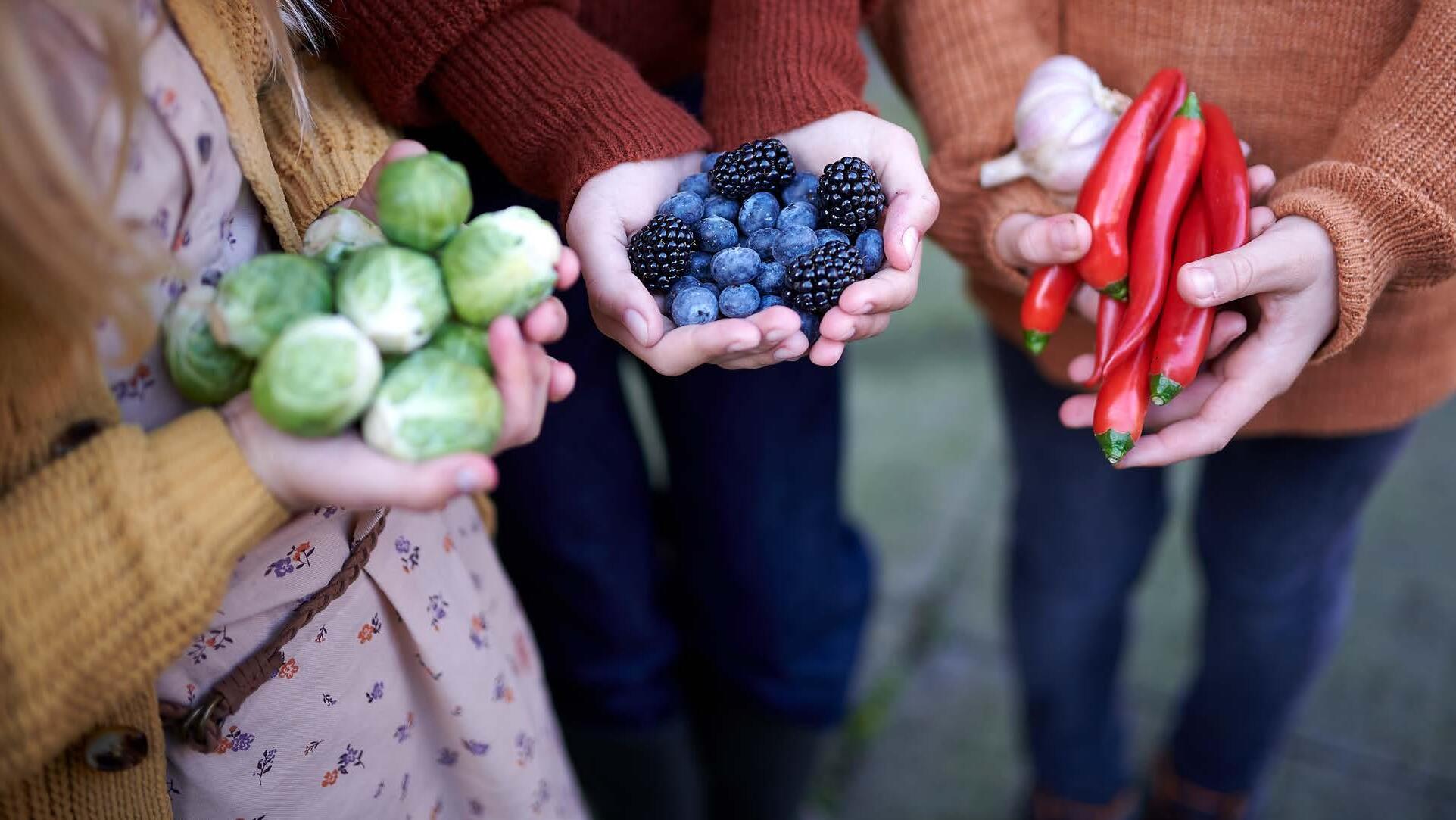
Our purpose
People need vegetables and fruit
We are committed to meeting the growing demand for nutritious, plant-based food. Both now and in the future.
We believe in preserving nature’s gifts for future generations by providing fresh frozen, plant-based food while minimising our impact on the planet.
are Ardo The path to a more sustainable food system Food safety, quality and innovation Respect for our employees Relationship with our stakeholders Good governance Minimal environmental impact Agronomy MIMOSA+ 9
We
Our values
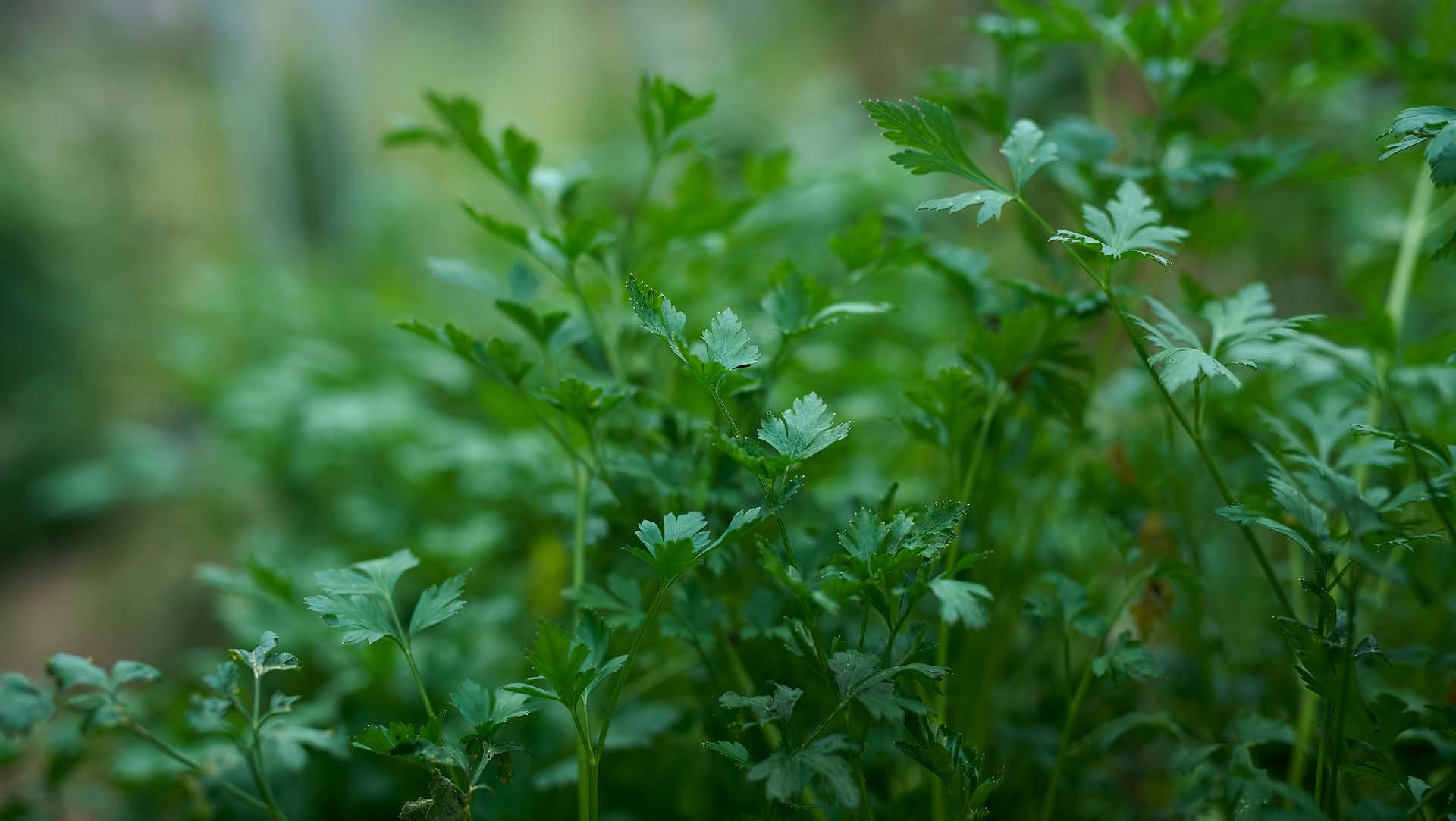
To realise our ambitions, we have embedded four fundamental Ardo values into our daily practices. These values serve as our guiding light towards a sustainable future. As the frontrunner in our industry, we are committed to feeding the future, paving the way for a sustainable journey that others can embrace. This commitment forms the basis of our purpose.

We are committed to our customers
Based on our diverse product portfolio, we strive to provide our customers with solutions that best meet their requirements.

We are passionate

We have a sense of ownership
We believe in the products we make and the values that our company represents. We approach our work with energy and enthusiasm, striving to ensure Ardo’s long-term viability.
We work with responsibility and pride, always looking for opportunities and improvements that will benefit Ardo. In our collaborative model, we support our colleagues across the group by working together as one team. We all keep the same goal in mind: to make Ardo succeed, now and in the future.

We are authentic
We are pragmatic, feel comfortable being ourselves and have a down-to-earth mentality. We are respectful of others, communicate openly and value each contribution made at every stage of the chain.
We
are Ardo The path to a more sustainable food system
governance
Food safety, quality and innovation Respect for our employees Relationship with our stakeholders Good
10
Minimal
environmental impact Agronomy MIMOSA+
By supplying the world with healthy, fresh frozen vegetables, herbs and fruit we commit to a nutritious, plant-based global food transition.
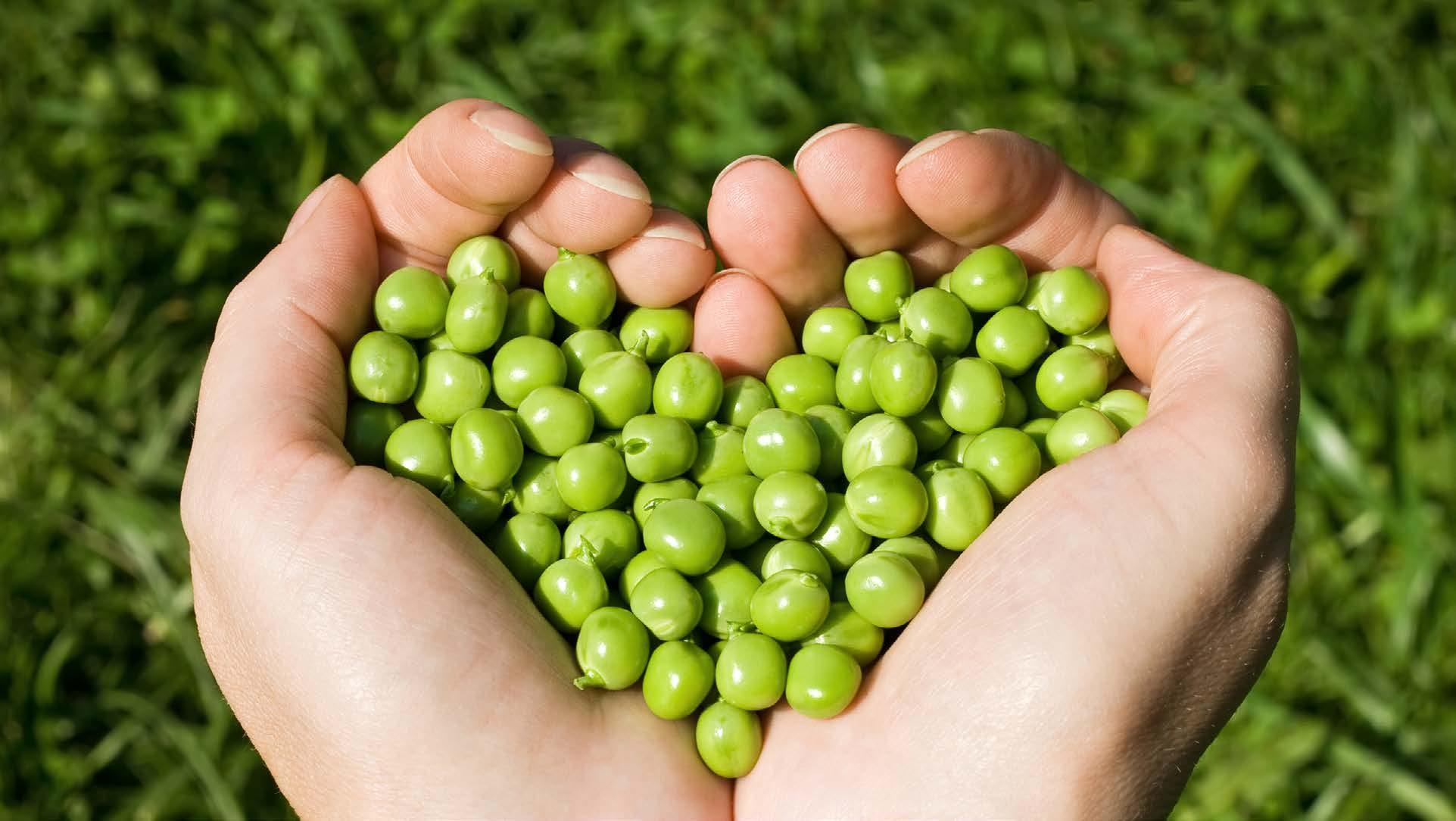
We strive for a double positive impact
We accomplish this by ensuring that our environmental impact is as limited as possible, while keeping future generations’ needs in mind.
are Ardo The path to a more sustainable food system Food safety, quality and innovation Respect for our employees Relationship with our stakeholders Good governance Minimal environmental impact Agronomy MIMOSA+ 11
We
From field to plate
Explore the journey of our fresh frozen vegetables, herbs and fruit - from the field to your plate. That’s how we feed the future!
Agriculture Production Procurement
3,500 farmers grow our fresh vegetables, herbs and fruit in open fields during the most optimal growing seasons. Our 65 agronomists guide farmers in implementing MIMOSA+ practices
We partner with ca. 10,000 global suppliers
Operating across 17 sites in 8 countries, with over 3,300 colleagues
We distribute over 947,000 tonnes frozen produce annually
Cold storage Packaging
Our packed goods are stored before shipping to our customers
Consumption Sales / Customers
Exporting to more than 100 countries and serving customers in Food Industry, Food Service and Retail
People are enjoying our innovative, high-quality, plant-based products all over the world
We adapt our product packaging to meet customer specifications, while ensuring optimal transportation and storage
Bulk storage
We store our products in bulk during the short production season to optimally allocate them to our customers throughout the year
path to a more sustainable food system Food safety, quality and innovation Respect for our employees Relationship with our stakeholders Good governance Minimal environmental impact Agronomy MIMOSA+ We are Ardo
The
Transport
12 UPSTREAM - ARDO'S ACTIVITIES - DOWNSTREAM
4. Thinking global, acting local
At Ardo, we are driven by a global vision, as we aim to make nutritious food accessible to people worldwide. To realise this ambition in a sustainable way, we embrace the principles of proximity:
Close to our crops
We operate 17 production, packaging and distribution facilities in 8 countries across Europe’s most fertile crop-growing regions. By keeping our factories close to our fields, we minimise the time between harvesting and preserving the natural goodness of our products in our freezers.
Close to our customers
We have sales offices in Europe and in the Americas. In this way, we ensure our customers always have a local Ardo representative nearby. This approach enables us to be proactive and respond quickly to the rapidly evolving needs and desires of our customers.
Global vision
Whilst having a local approach for growing our crops and serving our customers, we still aim to take advantage of our scale and enable the sharing of best practices across the group. Moreover, we try to leverage our geographical spread as part of our climate adaptation so that when one region is hit by extreme weather, production in other regions can compensate for the associated impact.
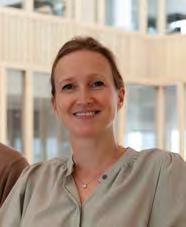
“Our ‘glocal’ approach means we can react more efficiently and anticipate our customers’ quickly developing needs and wants.”
Margot Haspeslagh Group Supply Chain Director
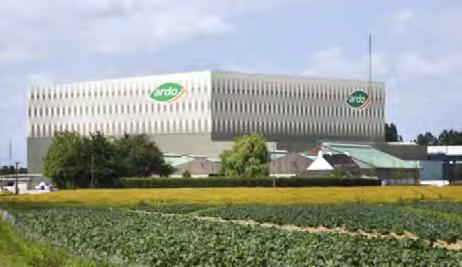
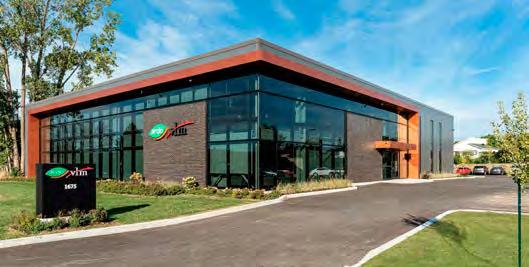
Over the past few years, we have expanded our global reach through strategic mergers and acquisitions. In 2014, Ardo merged with Dujardin Foods when the second generation of these two companies, founded by two brothers, decided to join forces. Three years later, we acquired VLM Foods, establishing our presence in the United States and Canada and, simultaneously, securing a substantial stake in Compañia Frutera La Paz, the leading processor of fresh frozen pineapple in Costa Rica.
Food safety, quality and innovation Respect for our employees Relationship with our stakeholders Good governance
environmental impact Agronomy MIMOSA+ 13
The path to a more sustainable food system
Minimal
We are Ardo
Our headquarters and production site in Ardooie (Belgium)Our sales office in Montreal (Canada)
Belgium
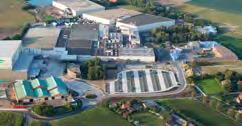
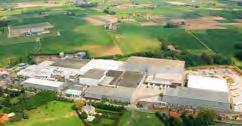
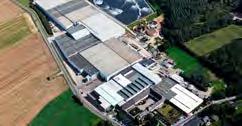
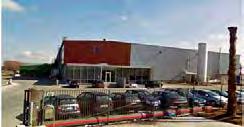
France
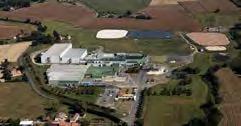
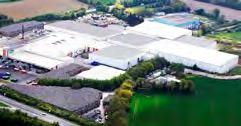
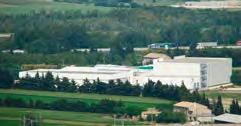
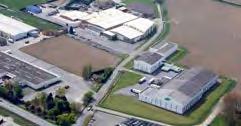
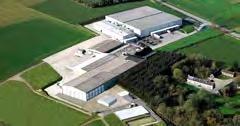
United Kingdom
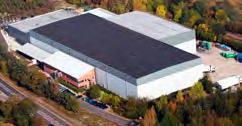
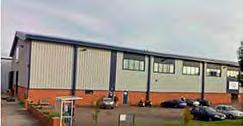
Spain
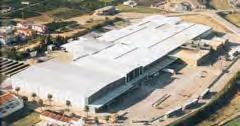
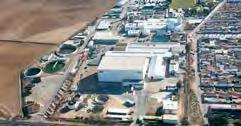
BADAJOZ*
& grilled vegetables
Portugal
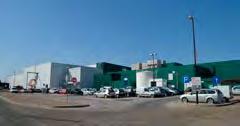
Austria
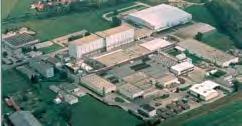
GROSS-ENZERSDORF
prepared vegetables, fried vegetables
The Netherlands
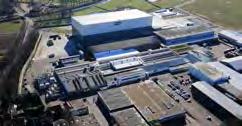
Costa Rica
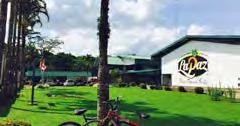
to
safety, quality and innovation Respect for our employees Relationship with our stakeholders Good governance Minimal environmental impact Agronomy MIMOSA+ 14 We are Ardo *Joint Ventures
The path
a more sustainable food system Food
ARDOOIE headquarters vegetables
KOOLSKAMP vegetables
GEER* vegetables, rice, pasta, potatoes, pulses
KORTEMARK
SAINT-SEVER vegetables
GOURIN vegetables, purees, soups, prepared vegetables
LA GARDE-ADHÉMAR mediterranean herbs
VIOLAINES vegetables, fried vegetables
LE MOUSTOIR herbs
ASHFORD EYE herbs
mediterranean vegetables, fried
BENIMODO mediterranean vegetables, prepared vegetables
ZUNDERT leaf and prepared vegetables
ALPIARÇA* mediterranean vegetables
vegetables,
PRODUCTION - PACKING - DISTRIBUTION
COSTA RICA* fruit
We are Ardo
We are Ardo The path to a more sustainable food system
Minimal environmental impact Agronomy MIMOSA+
Food safety, quality and innovation
Respect for our employees Relationship with our stakeholders Good governance
ARDO SALES OFFICES & REPRESENTATION
ARDO PRODUCTION, PACKING & DISTRIBUTION SITES
ARDO SALES OFFICES & REPRESENTATION, PRODUCTION, PACKING & DISTRIBUTION SITES
CANADA | USA
ArdoVLM
EUROPE
IRELAND
COSTA RICA
DENMARK
UNITED KINGDOM THE NETHERLANDS
GERMANY
BELGIUM FRANCE
SPAIN PORTUGAL
ITALY
POLAND
CZECH REPUBLIC
AUSTRIA
HUNGARY
SLOVENIA
ROMANIA
15
We
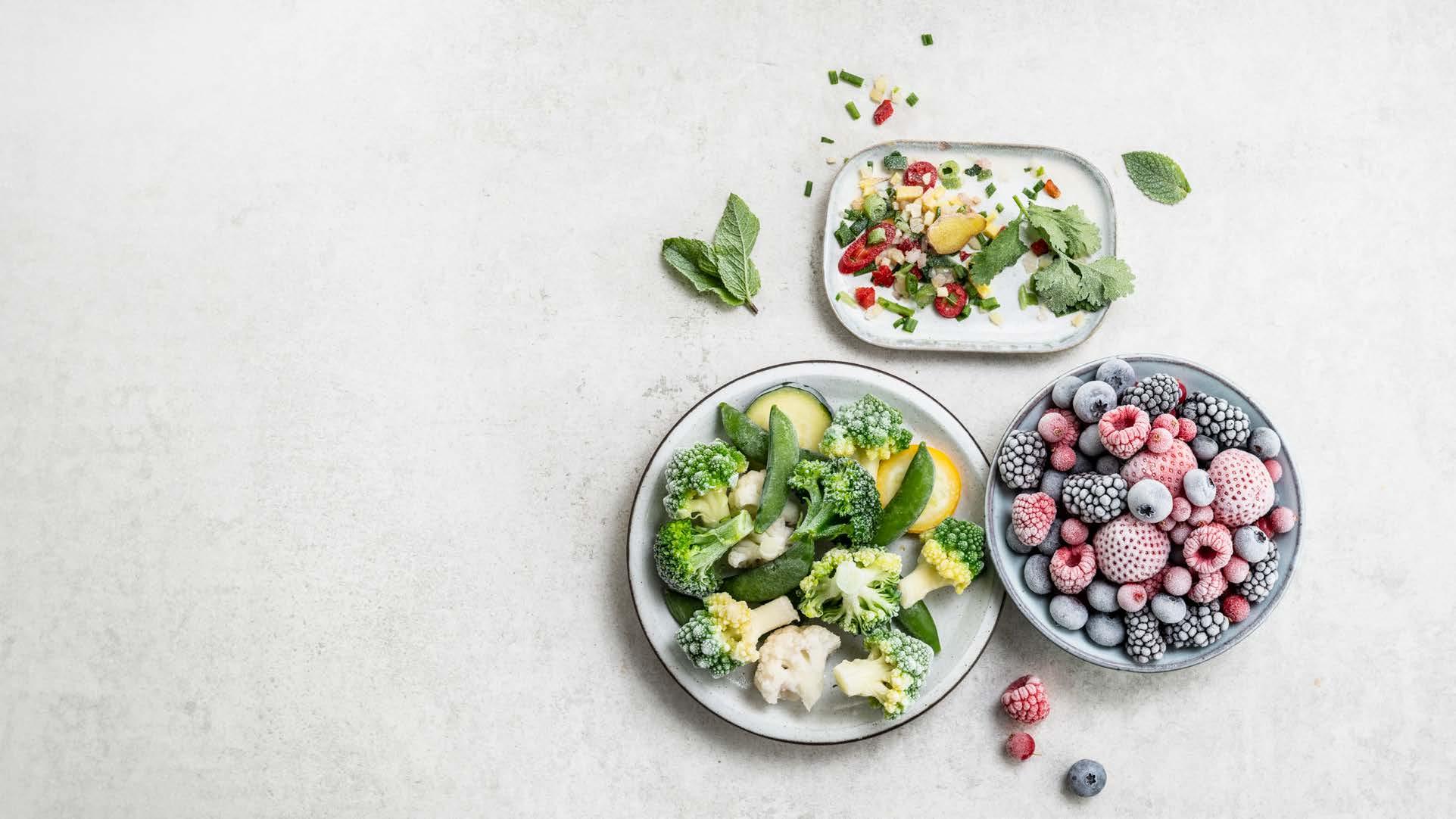
5. Providing a vast range of nutritious products
We provide an extensive variety of 100% natural fresh frozen vegetables, herbs and fruit, all grown, harvested and processed with care and dedication.
Based on our diverse product portfolio, we strive to provide our customers with solutions that best meet their requirements. Thanks to our global presence, we stay attuned to emerging trends and evolving market needs.
At our core, we offer vegetables, herbs and fruit in their pure form, preserving their inherent vitality. We want to support the transition to a nutritious plant-based diet by offering fresh frozen vegetables, herbs and fruit, in pursuit of a healthier future.
Food safety, quality and innovation Respect for our employees Relationship with our stakeholders Good governance Minimal environmental impact Agronomy MIMOSA+ 16
The path to a more sustainable food system
are Ardo
6. Servicing customers in various industries
Our product offering caters to the diverse needs of consumers across various sectors:
Food Service
We actively monitor consumer trends to develop products for our Food Service customers, bringing great taste, convenience and ease of preparation all under the Ardo brand. This results in a broad product range to fit all the culinary needs.
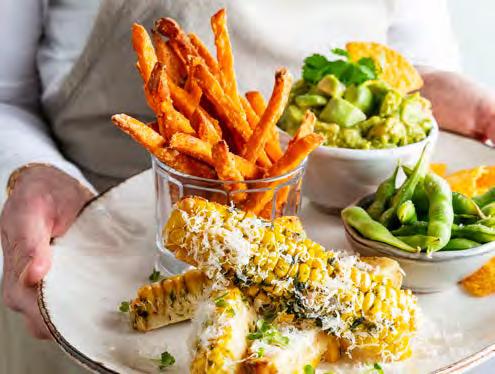
Retail
Retail customers can count on Ardo for a broad range that fits in perfectly with the consumer’s lifestyle and constantly changing habits.
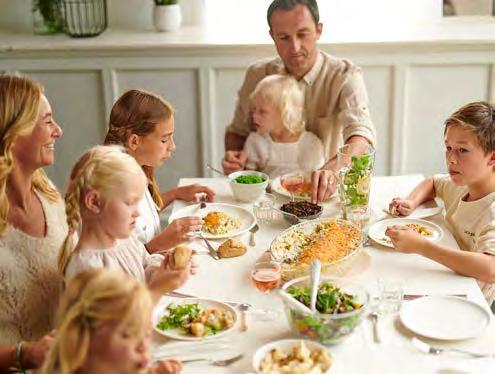
Food Industry
Our customers in the Food Industry segment rely consistently on Ardo’s top quality and freshness, all produced to be compliant with the most stringent HACCP-standards.
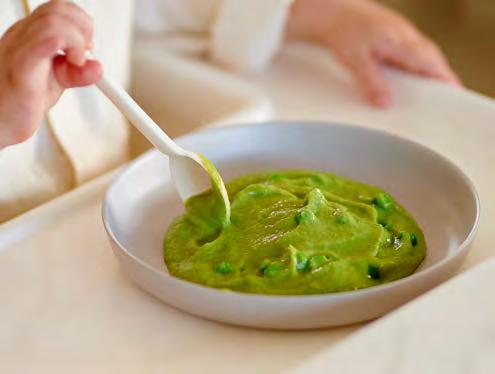
The path to a more sustainable food system Food safety, quality and innovation Respect for our employees Relationship with our stakeholders Good governance Minimal environmental impact Agronomy MIMOSA+ 17
We are Ardo
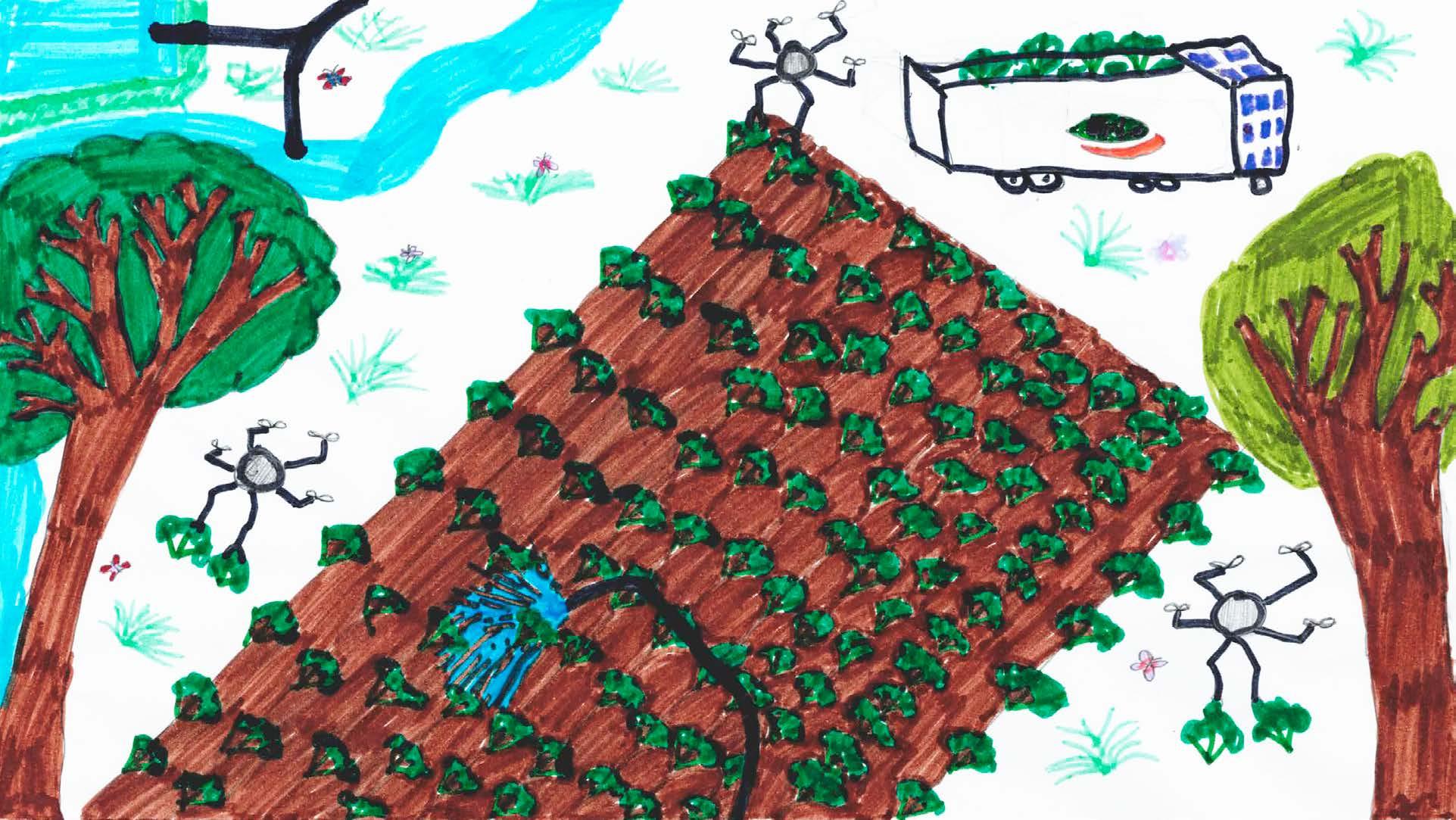
Broccoli is grown in the shade of trees, watered by a hose that pumps water from the river, the sea (filtered) or a rainwater basin. Robotic drones remove the weeds and pick up the broccoli to put it in the skip. Solar panels will power it all the way to the factory.
Clémence, 8 years, France
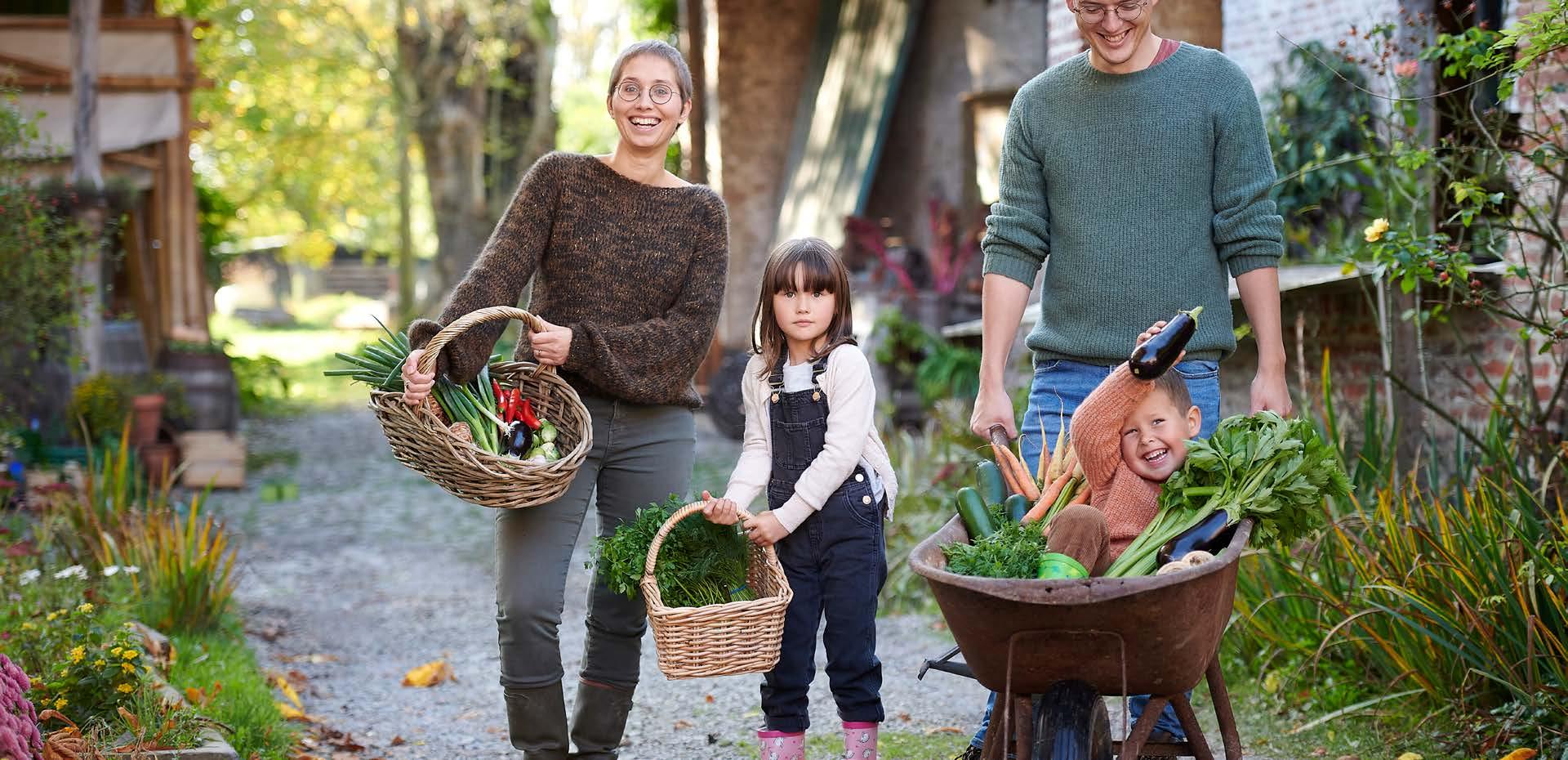
At Ardo, we are determined to play our part in putting our global food systems on a sustainable path. We see it as our purpose to meet the growing demand for nutritious, plant-based food, while preserving nature’s gifts for future generations.
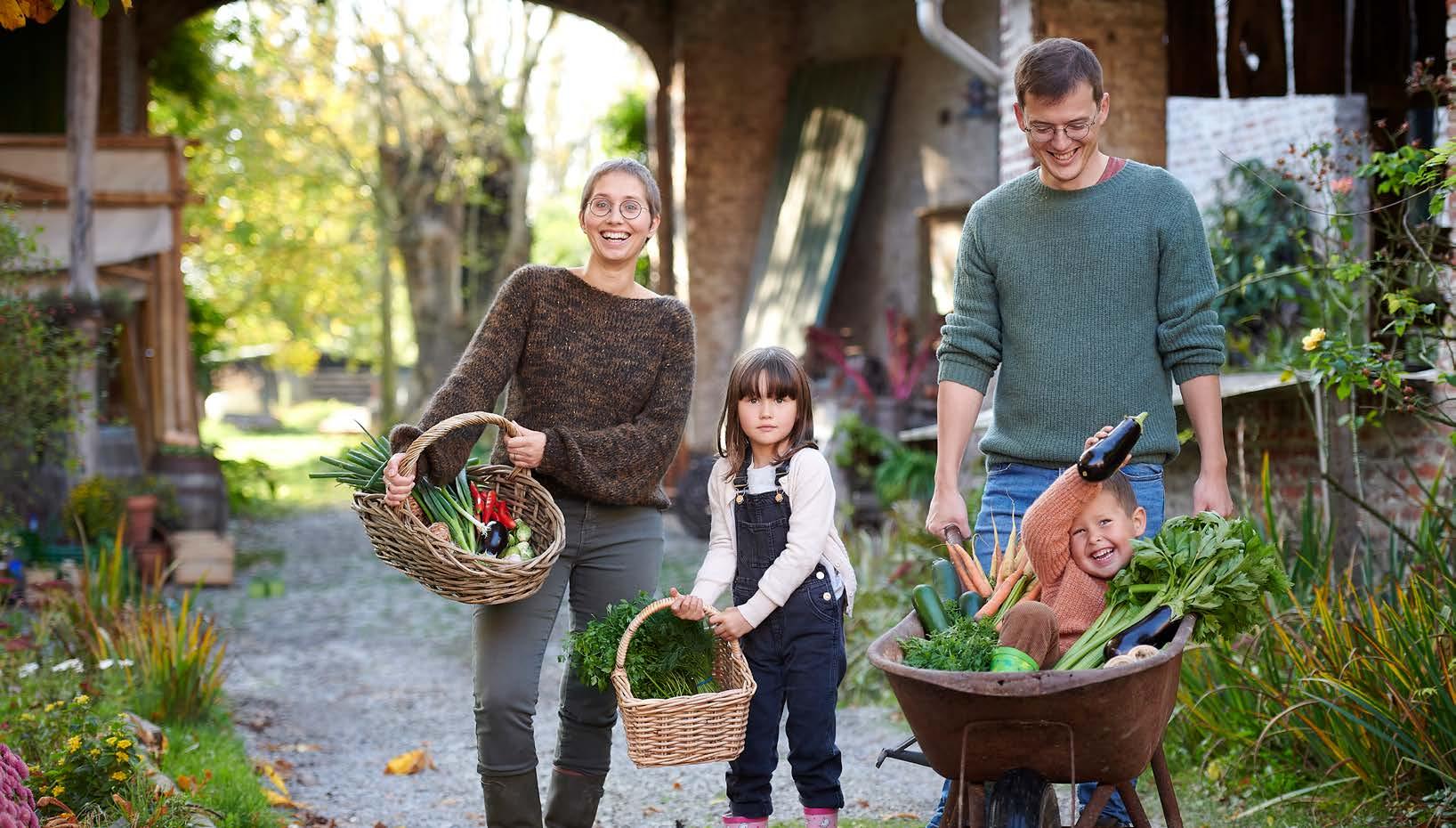 We are Ardo
We are Ardo
Food safety, quality and innovation Respect for our employees Relationship with our stakeholders Good governance
19
Minimal environmental impact Agronomy MIMOSA+
The path to a more sustainable food system
1. Committing to a more sustainable future
Climate change is impacting us all, from farmers to consumers. Droughts and floods have hit our farmers' field yields, causing product shortages and disruptions in our supply chain. Additionally, rapid human development is pushing the planetary boundaries, putting pressure on the use of land and water and increasing chemical pollution. We recognise our role in these evolutions and are committed to building resilience in our supply chain.
Currently, global food systems are both contributors and victims of climate change. They are responsible for nearly a third of global greenhouse gas emissions, consume large amounts of natural resources and contribute to a loss of biodiversity. They do not ensure fair economic returns and livelihoods for everyone involved, in particular farmers1.
Simultaneously, the global food systems are faced with the impacts of climate change in the form of droughts or extensive periods of excessive rain, leading to reduced agricultural yields. Global warming has reached 1.C° and with current policies and actions in place, we are heading towards even
greater increases in global temperatures. While historically field yields increased thanks to modern agricultural practices, we notice the opposite trend driven by the impact of climate change. Our farmers are faced with more frequent and severe weather events, such as extended periods of floods and droughts, causing on average a 20% decrease in field yields between 2018 and 2022 versus 2013 and 2018. These drops in field yields have led to product shortages and increased production costs, causing disruptions in our supply chain and subsequently harming our service levels.
1 https://www.un.org/sites/un2.un.org/files/fastfacts-food-and-agriculture-february-2022.pdf
Besides climate change our agricultural activities face additional challenges:
- Soil health is declining. For example, the carbon content of soils in Belgium has reduced, on average, by 1% per year.
- Availability of land for agricultural purposes is reducing.
- Water resources are becoming scarcer, especially in drier regions where demand can surpass availability.
- Loss of biodiversity remains a pressing issue, with a 70% decline over the past 50 years.
- Excessive nitrate levels in surface water.
A fundamental transition is required to feed the world’s future ten billion people whilst respecting planetary boundaries.
At Ardo, we strive to contribute to a more sustainable future by supporting a transition to more plant-based diets, minimising carbon emissions across our food supply chain and working on regenerative agricultural practices in the fields through our MIMOSA+ programme.
We are Ardo The path to a more sustainable food system Food safety, quality and innovation Respect for our employees Relationship with our stakeholders Good governance Minimal environmental impact Agronomy MIMOSA+ 20
Case
Let’s Meet in the Field 2023
From 12th to 16th September 2023, we hosted our “Let’s Meet in the Field” event at our headquarters in Ardooie, welcoming around 1,000 guests. The theme of the event was centred around “How to Feed the Future?” and specifically on our MIMOSA+ programme which is Ardo’s answer to regenerative agriculture. For the occasion, we created a demo field, featuring 55 diverse vegetables and herbs right outside our office. This demonstration aimed to showcase the practical contributions of regenerative agriculture in enhancing the sustainability and resilience of our supply chain, benefiting growers, producers, customers and consumers.
The week of events started with a preview for our employees during which our team of agronomists presented the diverse topics of our MIMOSA+ programme and regenerative agriculture on the demo field. Our colleagues were captivated and inspired by the passion and knowledge of our experts that was showcased during the demonstrations.
On the opening day, we had the chance to welcome the Belgian minister of Energy, Tinne Van der Straeten. It was an opportunity for her to witness our unwavering dedication to sustainability and regenerative agriculture.
On the next day, we hosted our International Leadership Day, which ended with an insightful open panel discussion that featured experts in ‘Sustainable Agriculture’ from three major food industry players. The panellists shed light on some primary challenges facing contemporary food systems.
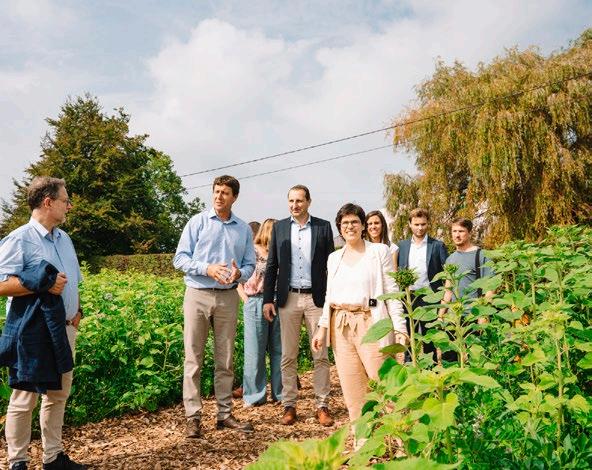
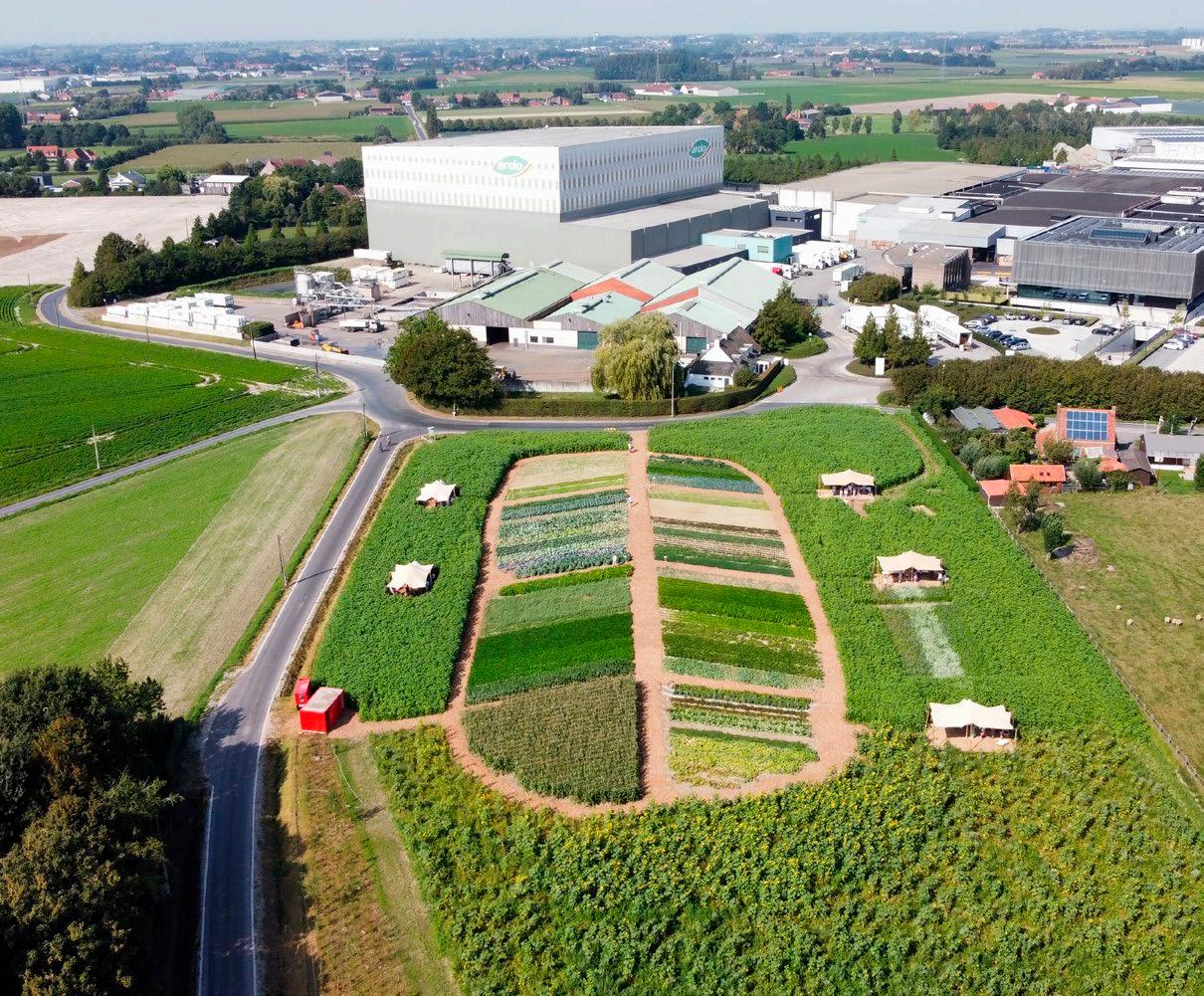
We are Ardo Food safety, quality and innovation Respect for our employees Relationship with our stakeholders Good governance Minimal environmental impact Agronomy MIMOSA+ 21
food
The
path to a more sustainable
system
We welcomed Belgian minister of Energy, Tinne Van der Straeten
The demo field, featuring 55 diverse vegetables and herbs
Watch the Let's Meet in the Field video
Case
The following day, during our Customer Day, we conducted a series of inquiries with our customers regarding the sustainability of their businesses. The responses unveiled that a significant 90% of the attendees see a clear impact from climate change on their business, underscoring the prioritisation of climate resilience on their company’s agenda.
However, the panelists also expressed the challenges and financial risks borne by farmers during the transition to more sustainable practices, emphasising the need for innovative solutions and collaborative support, particularly through partnerships across the value chain.
Finally, during the last 2 days of "Let’s Meet In the Field", we invited our farmers and suppliers for a more technical deep dive into our MIMOSA+ principles and to demonstrate our commitment to supporting their transition to regenerative agriculture. We remain committed to close collaboration, offering training and co-investing in cutting-edge agricultural machinery. Our agronomists will actively guide pilot farms in the implementation of regenerative agriculture principles, with the overarching objective to support all our farmers transitioning to regenerative practices by 2030. We acknowledge the crucial role farmers play in this transition and aim to mitigate the initial risks associated with it.
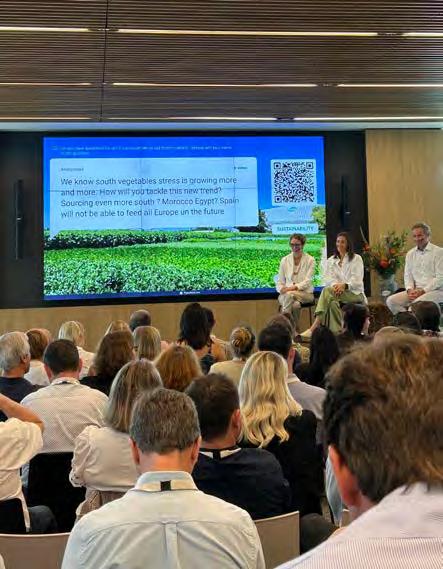
Supporting our customers’ sustainability journey
Companies are increasingly setting up sustainability strategies, a trend that we also observe among our customers. They are setting targets to reduce their carbon emissions, promote sustainable agriculture, and improve packaging, among others. In this context, they want to collaborate with their suppliers to assist in realising their sustainability objectives.
This is where our commitment becomes evident. We want to support the sustainability priorities of our customers. In fact, we choose to prioritise customers who align with our sustainability values and actively contribute to the shift toward a more sustainable food system.
We are Ardo Food safety, quality and innovation Respect for our employees Relationship with our stakeholders Good governance Minimal environmental impact Agronomy MIMOSA+ 22
The path to a more sustainable food system
Panel on the climate challenges
We
Ardo’s commitment to the Science-Based Targets initiative
Recognising the need to mitigate Ardo’s climate impact and minimise our carbon footprint across the entire value chain, we decided to align our emission reduction targets with the latest climate science. In December 2023, we formalised our dedication to climate mitigation by signing the Science-Based Targets initiative (SBTi) commitment letter. Specifically, for our scope 1 and 2 emissions, we follow the pathway aimed at limiting global warming to 1.5°C. For our scope 3 emissions, we are following the pathway well below 2°C. As part of our SBTi roadmap, we will distinguish between FLAG (forest, land, agriculture) and non-FLAG emissions.
We are currently in the process of developing our sciencebased reduction targets. We commit to presenting these targets within the next 24 months, subject to approval by SBTi.
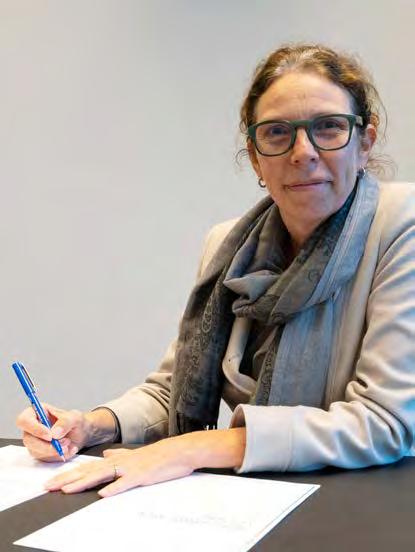
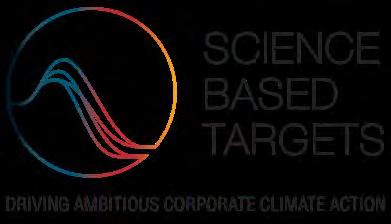
The Science-Based Targets Initiative (SBTi) is a non-profit and multi-stakeholder climate initiative, led by CDP, the UN Global Compact, the World Resources Institute and the World Wildlife Fund. It provides a comprehensive methodology for companies to establish carbon reduction targets aligned with the scientific imperatives outlined in the Paris Agreement.
are Ardo Food safety, quality and innovation Respect for our employees Relationship with our stakeholders Good governance Minimal environmental impact Agronomy MIMOSA+ 23
path to a more sustainable food system
The
Ardo's CEO, Gabrielle Kalkwijk, signing the SBTi commitment letter
2. Founding our strategy on sustainability
Corporate strategy
Sustainability is deeply ingrained in our corporate strategy, Horizon 2025, which is based on three essential pillars: winning with customers, investing for growth, and modernising our business. These pillars are firmly built on the foundation of our core values, family heritage, sustainability and agronomy. Without a solid foundation, the pillars of our strategy would not hold strong.
Win with customers
We foster lasting partnerships with our customers, focusing on reliability and durability. We enhance customer engagement while streamlining the effectiveness of our customer value chain. We align with partners who share our commitment to sustainability.
Invest for growth
We rely on state-of-the-art machinery, sustainable technology and green energy to expand our business. We invest in knowledge, technology and infrastructure to deliver high-quality products. We also acknowledge the need for retrofitting some of our older facilities to meet current food safety and resource efficiency requirements and specialising production in efficient sites, while optimising access to raw material, especially in a context of climate change.
Modernise the business
We empower our workforce with continuous learning, expertise and skill development. We are faced with a need to accelerate digitalisation and automation to optimise operations, driving operational efficiency.
With Horizon 2025 nearing its conclusion, we are actively preparing to shape our future strategy towards 2030, which will integrate our business and sustainability strategies.
The path to a more sustainable food system We are Ardo Food safety, quality and innovation Respect for our employees Relationship with our stakeholders Good governance Minimal environmental impact Agronomy MIMOSA+ 24
Win with costumers Invest for growth Foundation Values, Family, History, Sustainability, Agronomy Modernise
2025
the business Horizon
2 3
1 1
3
2
Double materiality assessment
The Corporate Sustainability Reporting Directive (CSRD) requires Ardo to undertake a double materiality assessment for identifying its key material topics. These topics are essential as they influence Ardo's ability to generate, maintain, or diminish economic, environmental and social value for itself, its stakeholders and society broadly. Material topics encompass two aspects: impact materiality, which
Steps in performing the double Materiality Assessment
We've based our Double Materiality Assessment on a six-step methodology. As part of this process we have engaged with a broad range of stakeholders to determine our material environmental, social and governance (ESG) topics.
focuses on Ardo's effect on the environment and society and financial materiality, concerning the influence of sustainability issues on Ardo's financial, reputational and operational performance.
This double materiality assessment was conducted towards the end of 2023. As a result, the findings have not been entirely reflected in the current report.
Key findings
However, moving forward, the outcomes of this assessment will shape Ardo's reporting themes in alignment with the European Sustainability Reporting Standards (ESRS), starting from the fiscal year 2023-2024 report. 1
25
food
are Ardo Food safety, quality and innovation Respect for our employees Relationship with our stakeholders Good governance Minimal environmental impact Agronomy MIMOSA+
The
path to a more sustainable
system We
SASB = Sustainability Accounting Standards Board
MSCI = Morgan Stanley Capital International
2
Define context & consolidate topics Perform stakeholder assessment Determine impact materiality Determine financial materiality Define material ESG topics Sustainability strategy & action plan 1 2 3 4 5 6 CO2 CO2
5
& society Regenerate agriculture Food waste Carbon footprint Energy management Food quality & food safety
5
Ardo Regenerate agriculture Carbon footprint Energy management Food quality & food safety Climate change impact & adaptation ENVIRONMENTAL TOPICS - SOCIAL TOPICS
Top
topics impacting planet
Top
topics impacting
Climate change impact & adaptation Employee well-being & safety Food quality & food safety Water management Energy management
Top 5 priority topics according to stakeholders
We are Ardo
The path to a more sustainable food system
Minimal environmental impact Agronomy MIMOSA+
Food safety, quality and innovation
Respect for our employees Relationship with our stakeholders
Ardo's double materiality matrix
The next steps will be to update the sustainability and corporate strategy based on the priorities identified in the matrix, and to further focus and sharpen the reporting on the material topics.
high medium high medium
3 16 15 5
4 14 17 10 6
8 13 12
Ardo's impact on planet & society 111 2 9 7
Environment
1 Energy management
2 Carbon footprint
3 Climate change impact & adaptation
4 Water management
5 Sustainable packaging
6 Waste managing
7 Food waste
8 Responsible sourcing
9 Regenerative agriculture
Social
10 Health & well-being of local communities
11 Food quality & food safety
12 Innovative & nutritional food
13 Inclusion & diversity
14 Employee well-being & safety
15 Employee engagement
Governance
16 Corporate governance
Good governance
*Financial includes potential reputational, regulatory, and operational risks/opportunities
ENVIRONMENTAL TOPICS - SOCIAL TOPICS - GOVERNANCE TOPICS
The size of the circles represent the importance of material topics to stakeholders: how stakeholders think Ardo is currently performing on ESG topics and what these stakeholders think should be future priorities for Ardo.
26
low
17 Human rights & ethics Financial impact on Ardo* low
The double materiality assessment enables us to prioritise key sustainability topics based on three dimensions: the importance to stakeholders, the biggest impacts of Ardo on the planet and society and the biggest financial impacts on Ardo. Combining these three dimensions resulted in the final double materiality matrix for Ardo.
We are Ardo
The path to a more sustainable food system
Minimal environmental impact
Agronomy MIMOSA+
Food safety, quality and innovation
Respect for our employees Relationship with our stakeholders
3. Turning our sustainability ambition into reality
Ardo’s commitment to sustainability is built on five foundational pillars.
1 2
Minimal environmental impact Resource efficiency
Absolute reduction in scope 1 & 2 GHG emissions from FY21/22 to FY29/30, in line with SBTi1
Absolute reduction in scope 3 GHG emissions from FY21/22 to FY29/30, in line with SBTi (non-FLAG2 emissions)
Minimum 10% waste reduction across Ardo's operations by 2030 by reducing, reusing and recycling
Reduce primary packaging weight as share of packed products in kgs with 10% vs 2022 by 2025
Minimum 30% renewable electricity production by 2030
Agronomy MIMOSA+
Increase hectares covered for more t han 240 days a year
Increase biodiversity and natural habitats in our growing regions
3 4 5
Food safety, quality, and innovation
Maximum 2.5 foreign material complaints / 1000 tons packed by 2030
Improve soil humus content
100% use of recycled and/or minimal FSC material for secondary corrugated packaging by 2030
Minimum 80% of irrigation based on crop needs or soil moisture deficit measurements by 2025 and 100% by 2030
Improve nitrogen use efficiency through reduction of fertiliser use on our crops
Minimum 80% of own produced vegetables free from pesticide residues by 2027
100% vegetarian products by 2025
Respect for our employees
Reduce the risk of accidents: Injury Frequency Index (IFI) of maximum 10 by 2030
Reduce absenteeism by keeping our employees physically and mentally fit: maximum 5% absenteeism by 2030
Ensure gender balance in the Ardo organisation, in the leadership, management and executive teams
Good governance
Improve water-use efficiency in our plants through less usage and more circularity
100% of packaging (paper-plastics) is technically recyclable by end 2025
Absolute reduction in agricultural GHG emissions from FY21/22 to FY29/30, in line with SBTi FLAG2 targets
Minimum 60,000 employee training hours by 2025
Relationships with our stakeholders
Minimum 80% of externally sourced fruit by 2025 GLOBAL G.A.P and / or FSA certified, 75% of all externally sourced products by 2030
100% of frozen food suppliers are SMETA3 audited in high risk countries by 2025
Supporting Ardo communities by donating food to foodbanks and NGO's
SBTi = Science-Based Targets initiative
2 FLAG = Forest, Land and Agriculture
3 SMETA = Sedex Members Ethical Trade Audit
4 All figures are excl. the production site in La Paz (Costa Rica) and Joint Ventures at 50%
27
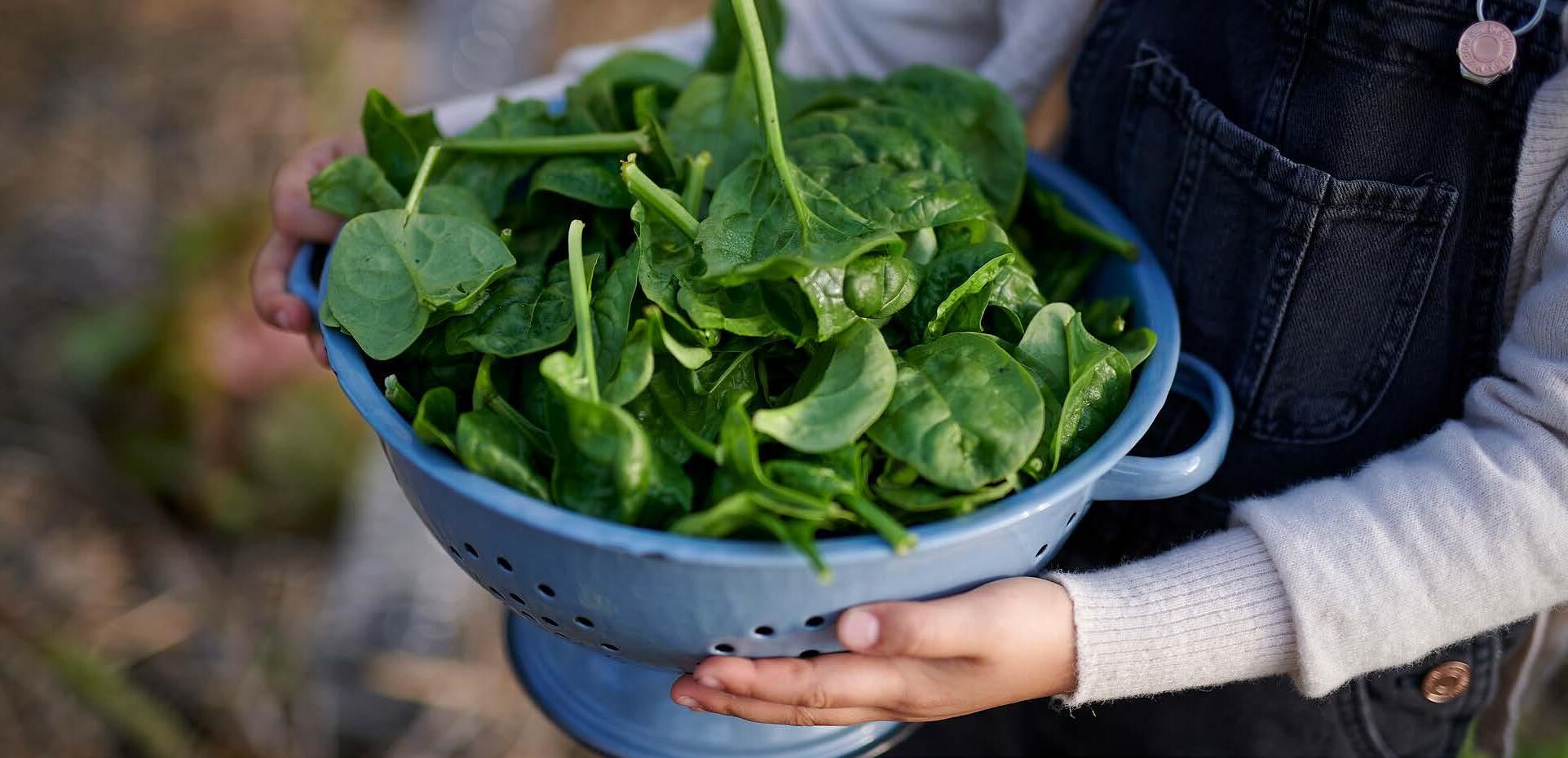
Supplying people all over the world with nutritious food requires a healthy planet. Therefore, we aim to minimise our ecological footprint as much as possible, starting with our processing and production activities. By adopting state-of-the-art technologies and implementing circularity principles, we strive to use all natural resources to their full potential, while minimising our carbon emissions and waste. In this way, we hope to build a sustainable future for generations to come.
28
Good Governance
environmental impact Agronomy MIMOSA+
Minimal
1. Reducing the Ardo carbon footprint
One way we strive to minimise our environmental impact, is by reducing our carbon footprint. Our specific target is to achieve a 40% reduction in carbon emissions (T CO2eq / T prod) in our own operations by 2030. To realise this goal, we have committed to a series of energy efficiency measures based on three key principles: reduce, reuse and regenerate. We believe that implementing various actions and programmes across our operations will enable us to accomplish even more ambitious sustainability goals, aligned with our SBTi1 commitment.
As a general approach to improve our energy efficiency, we start by reducing our energy consumption, then reusing energy wherever possible and finally investing in green energy. Thereafter, we complement our decarbonization efforts by actively sourcing green electricity.
These energy efficiency measures have clearly borne fruit as we have already reduced our carbon emissions (T CO2eq / T prod) in our own operations by 20% since 2019 (scope 1 & 2). In absolute terms (T CO2eq), we have already decreased our emissions by 38% since 2019, which is partly the result of lower production due to climate change impacts.
We are Ardo The path to a more sustainable food system Food safety, quality and innovation Respect for our employees Relationship with our stakeholders Good governance Minimal environmental impact 29 Agronomy MIMOSA+
REDUCE REUSE Energy awareness REGENERATE Energy efficiency 1 2 3 SBTi = Science-Based Targets initiative 0.000 19/2020/2121/2222/2324/2523/2425/2626/2727/2828/2929/30 0.020 0.100 0.120 0.140 0.080 0.060 0.040 GHG Intensity (T CO2eq / T prod) -40% GHG Intensity (T CO2eq / T prod) per financial year
Reduce
At Ardo, we have committed ourselves to reducing the carbon emissions of our own operations in line with the Paris Agreement's goal of limiting global warming to 1.5C°. Our ambition is to reduce our carbon emissions intensity by 40% by 2030, measured against our 2020 baseline (T CO2eq / T prod).
A first way to reduce our carbon footprint is by reducing energy consumption in our core operations, such as blanching, freezing and storage. To concentrate our efforts and investments, we have launched an internal audit programme. This programme focuses on refining equipment settings, providing training to operators to enhance their understanding of the impact of their actions on energy efficiency and implementing other measures to improve energy efficiency throughout our organisation.
For the entire Ardo Group, we are actively exploring and implementing retrofitting and upgrading projects to enhance sustainability, increase resource-use efficiency and adopt cleaner and environmentally sound technologies and industrial processes. Our goal is to implement best practices across all our sites, facilitated by regular knowledge exchange between factories.
While we have not yet reached this point, we are progressively addressing these opportunities to ensure the future resilience of our factories. These reduction measures have clearly borne fruit as we have already reduced GHG emissions on our sites (scope 1 and 2) by 20% since 2020. With the various projects and programmes lined out, we are confident that we will be able to achieve our 40% reduction target.
We have initiated several investment projects that have helped us reduce our energy consumption. In Saint-Sever, France, the centralisation of our corn processing lines (cobs and grain) has not only resulted in increased efficiency (a 4% yield improvement), reduced energy consumption and enhanced quality. It has also led to improved safety and a high degree of specialisation, both on the production line and among agronomists. Additional projects include the modernisation of machinery rooms for state-of-the-art cold production and optimal working conditions. Furthermore, there are ongoing projects involving the renovation or dismantling of several older cold stores in the Group, such as those in Zundert and Koolskamp to enhance energy efficiency. The renewal of steam peeling lines, designed to reduce steam consumption, is also part of our approach to sustainable improvements.
To further reduce our energy consumption, we are evaluating the possibility of increasing the temperatures in our cold stores to -19°C without affecting the quality of our products. Several sites have been testing these practices over the last months and we aim to implement this adjustment across the rest of the group in the coming year. This adjustment could result in an additional energy reduction of 2 GWh.

“The most sustainable energy is the energy we avoid using. This principle drives Ardo's commitment to energy efficiency through a series of initiatives.”
Ewout Deschuytter Group Energy & Sustainability Engineer
We are Ardo The path to a more sustainable food system Food safety, quality and innovation Respect for our employees Relationship with our stakeholders Good governance Minimal environmental impact 30 Agronomy MIMOSA+
1
Reuse
We consistently invest in projects aimed at energy recovery, valorising waste heat and harnessing other residual energy streams.
Producing the cold temperatures needed to freeze and store our products inevitably generates residual heat. In most of our plants, we capture and reuse this residual heat to produce hot cleaning water, as well to heat our offices.
Moreover, we have launched several investment projects that have contributed to the reuse of our energy:
- In several sites in France and Belgium, we implemented residual heat recovery to optimise our warm water production.
- In Ardooie, Belgium, over 35% of our steam production is generated from residual heat produced during the electricity generation process from our biogas. The green steam is used for steam peeling and blanching vegetables.
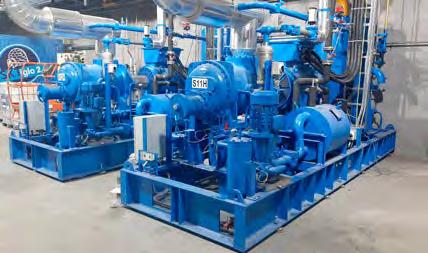
- From 2024 onwards, our Violaines site in France will also produce biogas through anaerobic digestion. This biogas will be converted into electricity to power the on-site processes and the residual energy will be recovered.
- This year, our La Garde-Adhémar site in France proudly recorded zero gas consumption, as we efficiently utilised residual heat from our compressors to generate hot water.
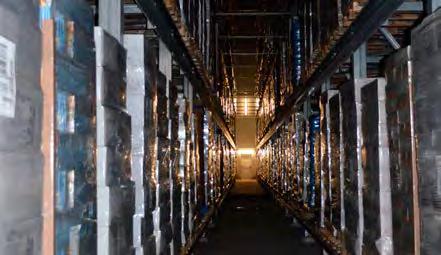
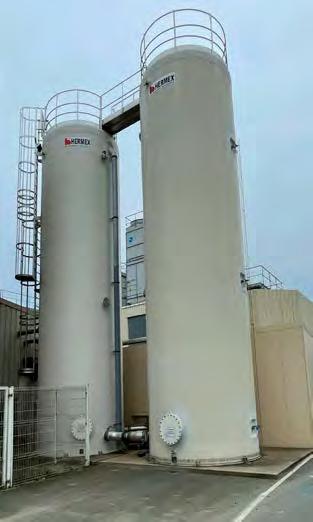
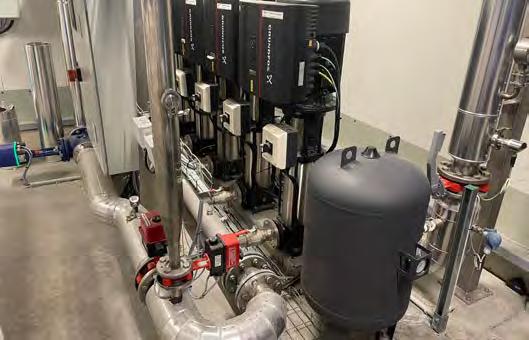
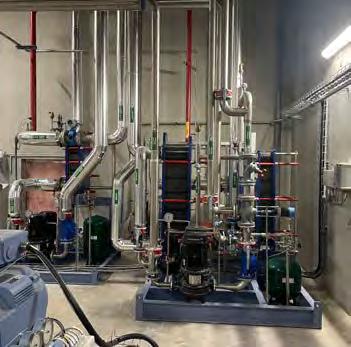
are Ardo The path to a more sustainable food system Food safety, quality and innovation Respect for our employees Relationship with our stakeholders Good governance Minimal environmental impact 31 Agronomy MIMOSA+ 2
We
Two water tanks of 75m³ at our site in Gourin, to store the site's hot water. The water is heated with residual heat
Heat recuperation at our site in La Garde-Adhémar
Capturing the residual heat from the cooling oil in our compressors to generate warm water for cleaning purposes
Residual cold from the floors of our cold stores is captured to cool our offices
3 Regenerate
Despite the fact we use our energy efficiently, our operations still require a significant amount of energy. That is why we are exploring and implementing various ways to produce our own green energy.
Over the past four years, we have already made substantial progress, increasing our production of green electricity from biomethanisation and solar panels covering 12% of our total electricity consumption in FY 22/23. However, we aim for more. Our ambition is to triple our own electricity production from renewable sources by 2030 so that we can fulfil 30% of our power needs internally.
To realise the objective of 30% of our own production of green electricity, we have launched and outlined a series of renewable energy projects
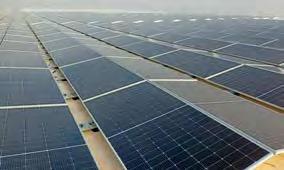
that will generate additional green energy (both electrical and thermal).
Biomethanisation
In the past year, our biomethanisation plants produced electricity equivalent to the consumption of over 10,300 households in Belgium1 (Joint Ventures at 100%).
In Ardooie, Belgium, we generate up to 18 GWh of green electricity from biogas, complemented with 6 GWh green steam per year.
In Geer, Belgium, we invested in an additional biomethanisation plant alongside our two existing cogeneration plants. Collectively, they are projected to deliver an impressive annual capacity of around 41.5 GWh, which could cover the site’s total energy needs (Joint Ventures at 100%).
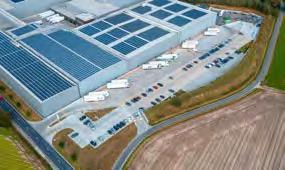
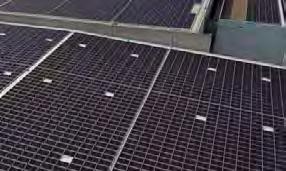
In Violaines, France, the wastewater treatment plant will be scaled up in the beginning of 2024 to a biomethanisation and cogeneration plant, with a projected capacity of 2.2 GWh of electricity per year.
Solar panels
Whenever viable opportunities arise for the installation of solar panels across our sites, we seize them. Currently, our collective efforts has resulted in the installation of ca. 27,500 solar panels, covering an area equivalent to 11 soccer fields, spread over six of our sites. Collectively, these solar panels generate approximately 11,000 kWp. This can be compared to the annual electricity consumption of ca. 2,000 households in Belgium1 (Joint Ventures at 100%).
Renewable % of electricity consumption per financial year
30%
20%
10%
0% 22/23 29/30
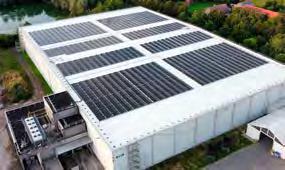
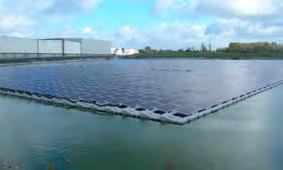
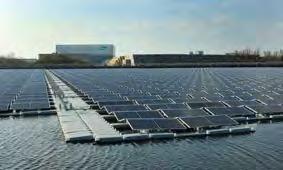
We are Ardo The path to a more sustainable food system Food safety, quality and innovation Respect for our employees Relationship with our stakeholders Good governance Minimal environmental impact 32 Agronomy MIMOSA+ 1 Energy consumption | VREG
Ardo Badajoz (ES) Ardo Koolskamp (BE) Ardo Alpiarça (PT)
Ardo Ardooie (BE) Ardo Geer (BE) Ardo Ardooie (BE)
Solar panels on roofs
Solar panels on water
2. Closing the loop, from field to plate
In addition to energy, the production of fresh frozen vegetables, herbs and fruit requires a variety of natural resources, including the raw produce and water. Following our purpose to preserve all nature’s gifts, we handle these resources as efficiently and sustainably as possible and apply the principles of circularity, so that we can fully maximise their potential.
irrigation reservoir
WASTE WATER TREATMENT PLANT
purified water
Circular Economy principle at Ardo1
used water
cold production
residual heat
biogas
cold store
residual cold
generators
green electricity
green steam
PRODUCTION PLANT & OFFICES
biogas
LOCAL GROWERS
vegetables herbs & fruit
BIOMETHANISATION
vegetable waste
fertiliser
We are Ardo The path to a more sustainable food system Food safety, quality and innovation Respect for our employees Relationship with our stakeholders Good governance Minimal environmental impact 33 Agronomy MIMOSA+
1 Fully or partially implemented in our different production sites
We
Reducing waste
Producing fresh frozen vegetables, herbs and fruit automatically generates a variety of waste streams. Our first priority is to reduce the amount of waste and maximise the yield of raw materials that have entered our processing and production units.
This involves carefully managing raw materials, optimising production efficiency and fine-tuning machine operations to minimise waste and reduce food loss. In 2024, for instance, we will introduce a cutting-edge, high-tech machine designed to perform a more detailed screening of vegetables. This machine can precisely cut out small marks or irregularities, eliminating the need to discard the entire product.
The waste that remains after our efforts, will be valorised as much as possible. For instance, by using vegetable waste as organic fuel for energy generation. Our anaerobic digestion plants in Ardooie and Geer (and soon in Violaines) convert vegetable residues into biogas. This biogas fuels the generators that convert it into green electricity, with the residual heat applied for steam production.
Spearheading the fight against food loss
Ardo is an advocate in the fight against food waste. For instance, we are one of the founders of the International Food Waste Coalition (IFWC), a value chain collaboration that organises action-oriented programmes. We evaluate the amount of food that is wasted throughout the entire production chain, from the point of harvest to the consumption of the end products. Our ambition is to minimise the food waste, quite literally from Farm to Fork.
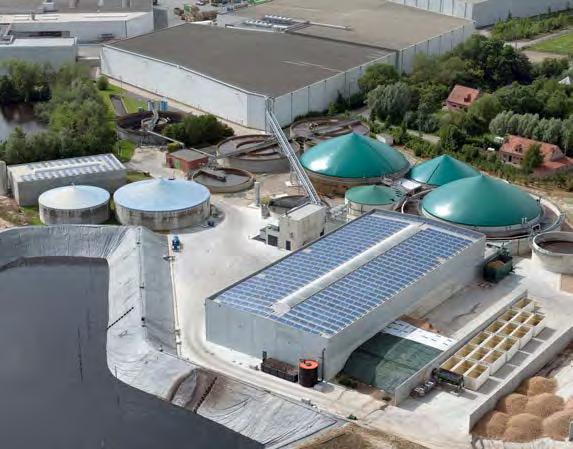
We also valorise the by-products of our anaerobic digestion processes. These by-products are converted into organic fertiliser, which is used by our farmers to grow the crops for the following season.
While the projects detailed are specific to some of our sites, the same principles and sustainability practices are progressively being adopted across the entire Ardo Group.
are
path to a more sustainable food system Food safety, quality and innovation Respect for our employees Relationship with our stakeholders Good governance Minimal environmental impact 34 Agronomy MIMOSA+
Ardo The
Green electricity and green steam generated at the biomethanisation plant in Ardooie (BE)
Closing the hydrological cycle
Ardo is committed to implementing high standards of water stewardship. During each production step, we focus on minimising the consumption and maximising the reuse of water.
In Ardooie, Belgium, for example, we have successfully recycled up to 94% of the water entering our facilities through wastewater treatment over the last three years. The water used for processing the vegetables is collected and purified in our wastewater treatment plant. The purified water is then reused for washing the vegetables coming from the fields. The remaining water is stored in a 150,000 m³ water basin, which is used to irrigate the 500 ha of fields of 51 growers surrounding the factory through a 23 km long underground network.
In Geer, Belgium, the washing water is purified in an on-site anaerobic wastewater treatment plant and then stored in a unique 35 ha wide nature reserve. The reserve provides shelter to more than 200 species of birds and is managed by Ardo, in partnership with producer organisation Apligeer and nature organisation Natagora. During the dry season, a big part of this process water is used for the irrigation of the 1,200 ha of vegetable crops surrounding the factory.
In our plants in Gourin and Le Moustoir, France, the purified water is not stored, but is used directly to irrigate the local growers’ fields.

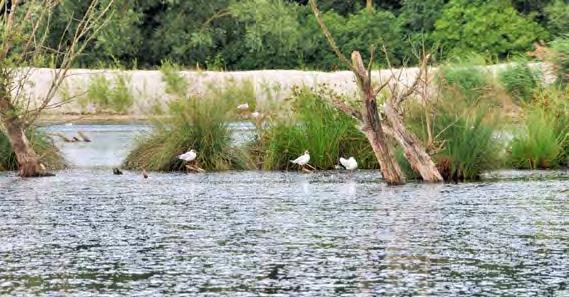
“Because of the lack of groundwater surrounding our farm, we used to have water shortages in the dry season. Thanks to the irrigation project, we no longer have that problem. Today, the water arrives at the field at the right pressure, with a known quality and when needed.”
Rik Delameilleure Farmer and user of the Ardooie irrigation network
are
The
to a more sustainable food system Food safety, quality and innovation Respect for our employees Relationship with our stakeholders Good governance
environmental impact 35 Agronomy MIMOSA+
We
Ardo
path
Minimal
In Ardooie, the purified waste water from the Ardo site is pumped into a 150 million liter reservoir
In Geer, the washing water is purified in an on-site anaerobic wastewater treatment plant and stored in a unique 35 ha wide nature reserve
3. Sustainable packaging
Packaging is essential for the protection, transportation and for communicating product specifications of our fresh frozen products. However, packaging has an impact on Ardo’s use of natural resources and production of waste. To reduce this impact, Ardo is transitioning to more sustainable primary and secondary packaging.
Reducing packaging weight
Due to the nature of our moisture-sensitive products, our primary packaging mainly consists of plastics or foldable cardboard boxes with inner PE layers. We have already made progress in reducing standard film thickness from 50 to 42 microns while maintaining strength and appearance. Our goal by 2025 is to further decrease primary packaging weight (foils and cartons) by an additional 10% compared to 2022, achieved through downsizing the dimensions and weight of the packaging.
Improving recyclability
We are actively assessing the recyclability of our packaging. All our paper-based packaging has been 100% recyclable since 2019. Approximately 93% of our foil packaging for frozen products uses mono-material plastics, making them recyclable. To improve recyclability, we have been transitioning from non-recyclable to recyclable laminates since 2020. Our objective is to have all our foils technically recyclable by 2025.
Using recycled materials
Our secondary packaging relies on one-wave corrugated cardboard boxes, which are all created from recycled and/or FSC sources. By 2025, we aspire to use recycled and/or minimal FSC material for 100% of our secondary corrugated packaging.
We are Ardo The path to a more sustainable food system Food safety, quality and innovation Respect for our employees Relationship with our stakeholders Good governance Minimal environmental impact 36 Agronomy MIMOSA+
less waste 1kg 1kg
4. Ardo's carbon footprint, from farm to fork
To reduce our greenhouse gas (GHG) emissions, we first need to understand the full scope of our carbon footprint impact. This is why we have been calculating the carbon footprint (scope 1 and 2) of our European production entities since 2019.
According to the Greenhouse Gas Protocol, the CO2eq emissions of a carbon footprint are classified into three categories:
- Scope 1 includes all direct emissions from the Ardo processing plants in Europe. As a result, natural gas combustion is the primary source of Scope 1 emissions. These CO2eq emissions are also caused by the fuel combustion of the vehicles of the company fleet.
- In scope 2, we calculate the indirect CO2eq emissions from the heat and power we purchase in Europe.
- In scope 3, we calculate the indirect CO2eq emissions generated throughout our entire value chain, from field to plate (agriculture, procurement, transport, use of sold products, etc.).
This year, we have expanded our carbon footprint assessment to include Scope 3, alongside Scopes 1 and 2. This evaluation now involves all sales entities, extending to our operations in North America, covering the last two fiscal years. The results for FY22/23 reveal that 95% of
our GHG emissions fall under scope 3, Ardo's value chain emissions.
Looking at Ardo's scope 3 emissions, the most significant impact arises from the categories purchased food, transport, use of sold products, agriculture and waste. Recognising these categories as Ardo's emission hotspots, we see substantial opportunities to reduce these emissions.
Adopting the SBTi perspective on our emissions, we categorised our scope 3 emissions into FLAG (Forest, Land and Agriculture) and non-FLAG emissions. FLAG emissions, covering emissions from agricultural activities of Ardo's farmers and from externally purchased food, represent 35% of our total emissions (scope 1, 2 and 3). Ardo's nonFLAG emissions, including emissions from all remaining scope 3 categories, make up 60% of our overall footprint
Following our SBTi commitment in December 2023, we will develop emission reduction targets in line with SBTi ambitions for our scope 1 and 2 emissions, as well as for our scope 3 FLAG and non-FLAG emissions. This way, we aim to contribute to limiting global warming to 1.5°C, in accordance with the Paris Agreement.
GHG inventory scope 1, 2, 3 - Emission hotspots (FY22/23)
GHG inventory scope 1, 2, 3 - FLAG and non-FLAG (FY22/23)
We are Ardo The path to a more sustainable food system Food safety, quality and innovation Respect for our employees Relationship with our stakeholders Good governance Minimal environmental impact 37 Agronomy MIMOSA+
Scope 2 2% Scope 1 3% Scope 3 95% Scope 1 3% Scope 2 2% Purchased Food 30% Purchased Food 72% Ardo contracted Agriculture 28% Agriculture 14% Others 11% Use of sold products 16% Waste 4% Transport 20% Scope 3 non-FLAG 60% Scope 3 FLAG 35% Scope 2 2% Scope 1 3% 3 Scope 1 Scope 2 Purchased Food 30% Purchased Food 72% Ardo contracted Agriculture 28% Agriculture 14% Others of products 16% Waste 4% Transport 20% Scope 3 non-FLAG 60% Scope 3 FLAG 35%
5. Summary: How does Ardo make a difference?
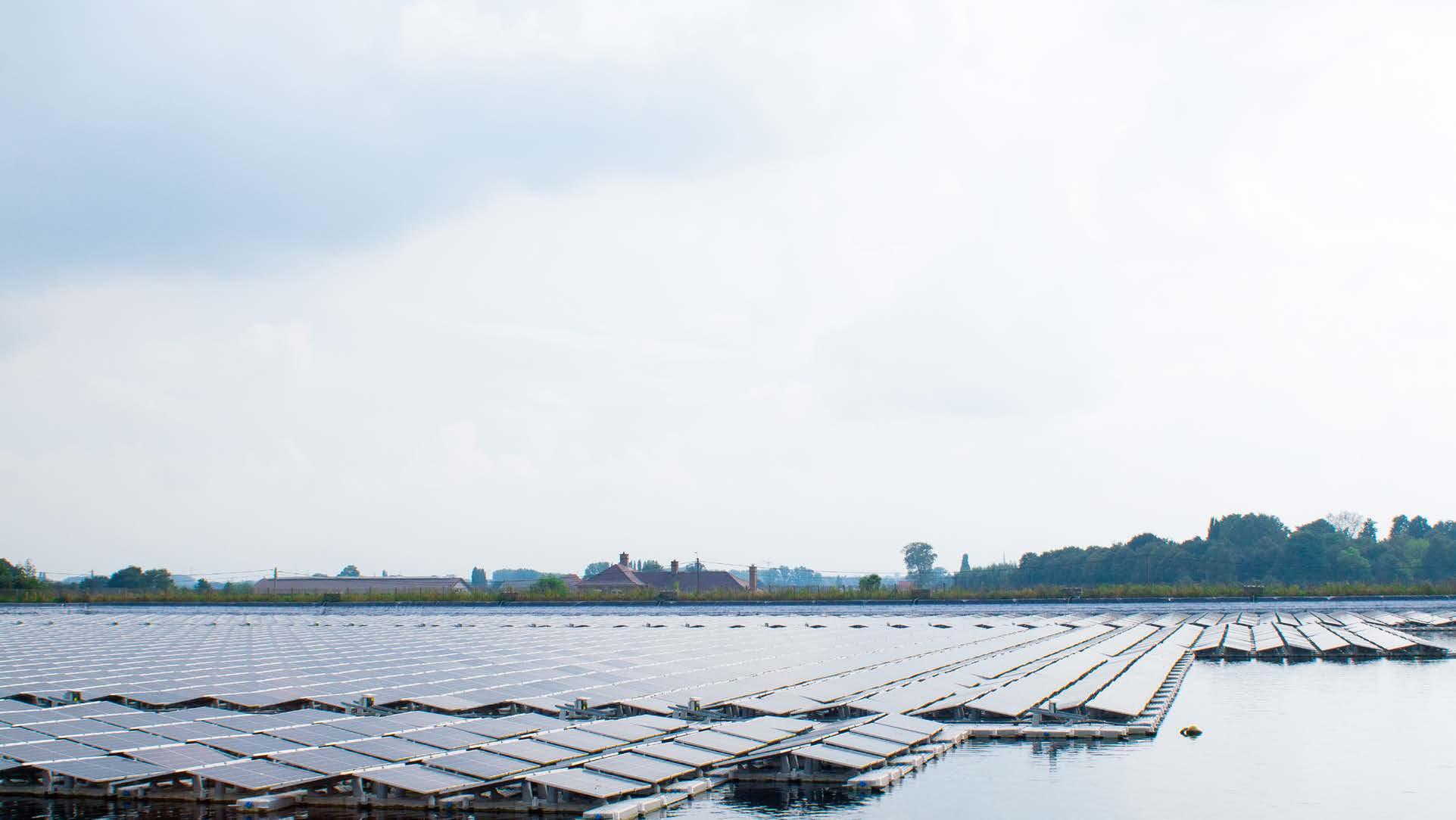
We are dedicated to reducing the environmental impact of our industrial activities through initiatives across the following domains:
• Reduced carbon footprint: we are actively trying to reduce our scope 1, 2 and 3 GHG emissions by prioritising energy efficiency. Our specific efforts concentrate on reusing, reducing and regenerating energy.
• Closed loop, from field to plate: we are engaged in minimising waste across our activities and promoting water stewardship to decrease water consumption and repurpose process water post treatment.
• Enhanced packaging sustainability: we are committed to improving the sustainability of our packaging by enhancing recyclability, incorporating recycled materials and reducing packaging weight.
We are Ardo The path to a more sustainable food system Food safety, quality and innovation Respect for our employees Relationship with our stakeholders Good governance Minimal environmental impact 38 Agronomy MIMOSA+
We are Ardo The path to a more sustainable food system
Minimal environmental impact
Agronomy MIMOSA+
Food safety, quality and innovation
Respect for our employees
Relationship with our stakeholders Good governance
Key performance table
All figures are excl. the production site in La Paz (Costa Rica) and Joint Ventures at 50%
1 SBTi = Science-Based Targets initiative
2 FLAG = Forest, Land and Agriculture
3 All production sites excl. Denmark. All waste streams minus reused waste and food donations
4 Octabins excluded, will be included in the future
39
Target 20/21 21/22 22/23 Scope 1 & 2 GHG emissions Absolute reduction in scope 1 & 2 GHG emissions (T CO2eq) from FY21/22 to FY29/30, in line with SBTi1 71,195 68,083 54,293 On track 40% intensity reduction in scope 1 & 2 GHG emissions (T CO2eq / T prod) from FY19/20 to FY29/30 0.114 0.102 0.103 On track Scope 3 non-FLAG2 GHG emissions Absolute reduction in scope 3 GHG emissions (T CO2eq) from FY21/22 to FY29/30, in line with SBTi (non-FLAG emissions) 557,302 606,618 New target Renewable electricity production Increase share of renewable electricity production in total electricity consumption to minimum 30% by 2030 12% On track Efficient water use Improve water-use efficiency (m³ / T prod) in our plants through less usage and more circularity 7.14 14.66 Attention needed Waste reduction Minimum 10% waste reduction (T) across Ardo’s operations by 2030 by reducing, reusing and recycling3 291,092 New target Packaging weight reduction Reduce primary packaging weight (kgs packaging purchased) as share of packed products in kgs (incl. plastic foils, folded cartons) with 10% vs 2022 by 2025 3.47% On track Secondary packaging 100% use of recycled and/or minimal FSC material for secondary corrugated packaging4 by 2030 74% On track Packaging recyclability 100% of packaging (paper and plastics) is technically recyclable by end 2025 89% 93% On track
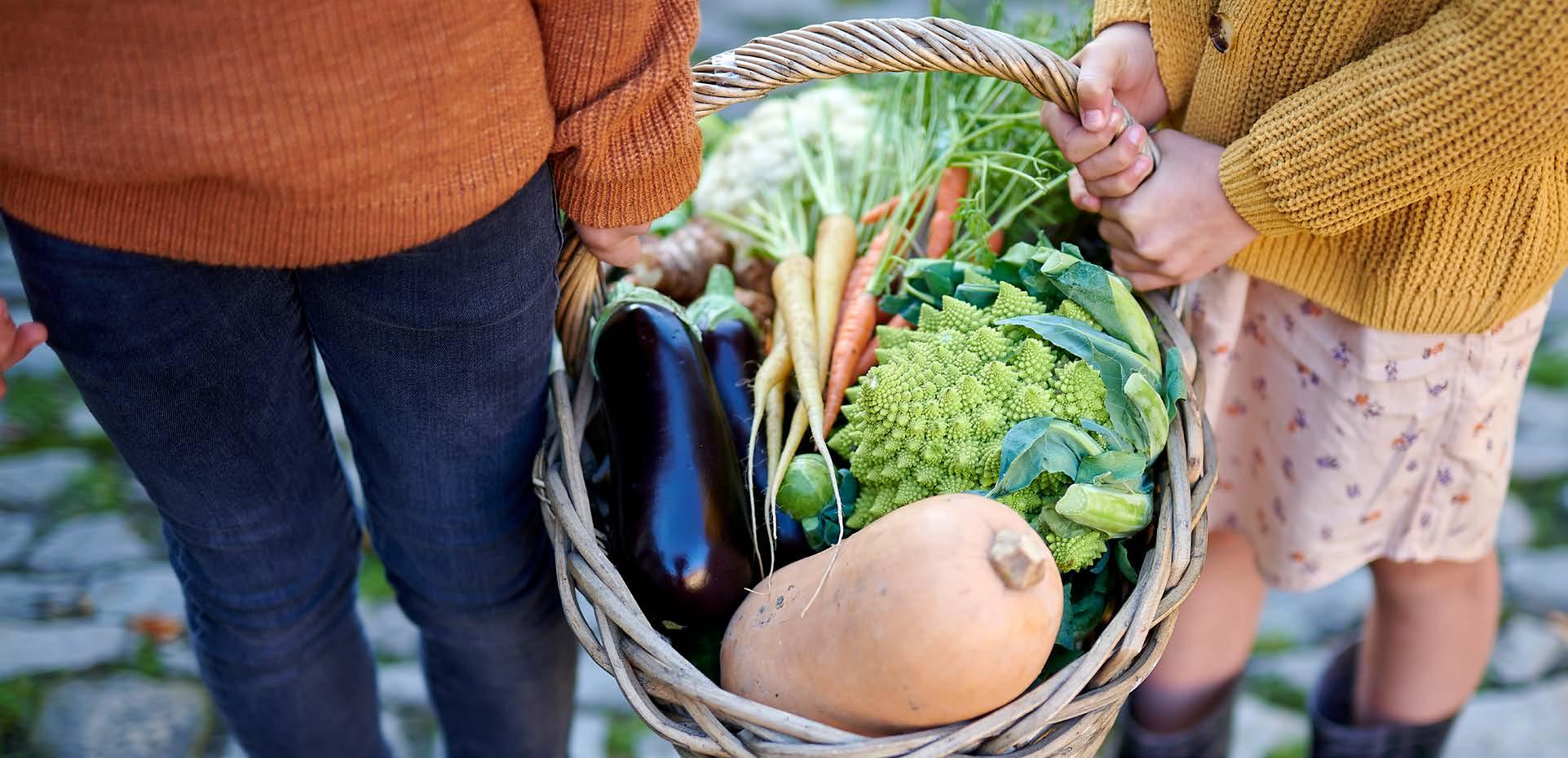
We and our farmers in particular, are experiencing the effects of climate change first-hand. Extreme weather conditions have resulted in lower yields per hectare over the last few years. Whilst we have always maintained a strong focus on our agricultural activities, the need to intensify our efforts in adopting practices that enhance the climate resilience of our crops has become increasingly evident. This has led to the launch of our MIMOSA+ programme, which encourages the implementation of regenerative farming practices. Practices that promote soil health, enhance biodiversity, protect water resources and limit climate impact, all while ensuring optimal yields. This approach aligns with our belief that the future of food depends on harmonising with nature.
40
The path to a more sustainable food system
Food safety, quality and innovation
Respect for our employees
Relationship with our stakeholders Good governance
Ardo
Minimal environmental impact Agronomy MIMOSA+
We are
1. MIMOSA, optimising crops and ensuring continuous improvement
In 2011, we launched our MIMOSA programme (Minimum Impact, Maximum Output, Sustainable Agriculture), with the help of our 65 field agronomists, who provide active field management support to 3,500 farmers. Each year, hundreds of trials, benchmarks and technical meetings are organised to challenge and improve our growing techniques, allowing us to reduce the use of crop protection products.
Over a 5-year period, the use of fungicides went down by 28%1 on our eight largest crops, covering over 40,000 hectares.
Reducing the use of plant protection products has enabled us to limit pesticide residues on our fresh frozen products.
Our MIMOSA programme enables us to implement best practices on the field, such as crop rotation, cover crops and responsible input use. These best practices are formalised in crop protocols that are employed and applied by farmers and agronomists throughout the season. They ensure an aligned approach to crop management, reducing the inputs and ensuring that the majority of Ardo-grown products are free of pesticide residues.
Year after year, we prioritise new crop varieties and use precision sowing techniques to establish an optimal plant population, optimise the quantity of seeds used through optimal seed density and create an open and aerated growing environment for our vegetables and herbs. As a result, we have significantly reduced the use of plant protection products on our crops.
One of the primary KPIs for measuring the success of our MIMOSA programme is the percentage of our production with zero residues (residues less than the detection limit <0.01 ppm). Every year, our quality departments conduct over 1,200 random pesticide residue analyses on our frozen products. The volume of frozen vegetables found to be free of quantifiable levels of pesticide residue, (below the detection limit of 0.01 ppm) reached 77% at group level in 2022, up from 56% in 2014.
This positive evolution is the result of our team’s active field management and collaboration with our 3,500 farmers. We will continue to work hard and we are confident that by 2027, 80% of Ardo-grown production will be residue-free.
Agronomy MIMOSA+ We are Ardo The path to a more sustainable food system Food safety, quality and innovation Respect for our employees Relationship with our stakeholders Good governance Minimal environmental impact 41
Calculation based on super-developed area treated % crop with zero residue 0% 2014 2015 2016 2017 2018 2019 2020 2021 2022 2027 80% 60% 40% 20% 80%
2. MIMOSA+, regenerating and revitalising the soil and ecosystems
Over the past five years, we have witnessed significant climate change impacts on our crops, with more variability in the yields across our growing zones and an overall decrease in harvested volumes per hectare. Recognising that climate change and soil erosion have increasingly disruptive impacts on the harvests, we have decided to step up our efforts by introducing MIMOSA+. This is our proactive response to enhance climate resilience across our growing zones, in line with the widely accepted principles of regenerative agriculture.
MIMOSA+ : Building climate resilience across our growing zones by focusing on:
Living soils
Water Cover crops
MIMOSA+ represents our commitment to advancing sustainable agriculture beyond the crop itself. Our focus extends to regenerating and revitalising the soil and surrounding ecosystems, contributing to a more comprehensive and holistic approach to sustainable agriculture. Moreover, these actions play a crucial role in reducing our agricultural emissions, or scope 3 FLAG1 emissions.
Biodiversity
Implementing MIMOSA+ practices among our grower base will enhance soil health, which is critical for coping with extreme weather events and building resilience to climate change. Practices such as crop rotation, cover crop management, precise application of organic and mineral soil fertilisers, optimal soil and seedbed preparation, collectively improve soil fertility and structure, as well
Plant nutrition
as facilitate soil moisture retention. To enhance climate resilience throughout our supply chain, we want all our farmers to adopt MIMOSA+ practices by 2030.
Agronomy MIMOSA+ We are Ardo The path to a more sustainable food system Food safety, quality and innovation Respect for our employees Relationship with our stakeholders Good governance Minimal environmental impact 42
1 4 2 5 3 FLAG = Forest, Land and Agriculture
We
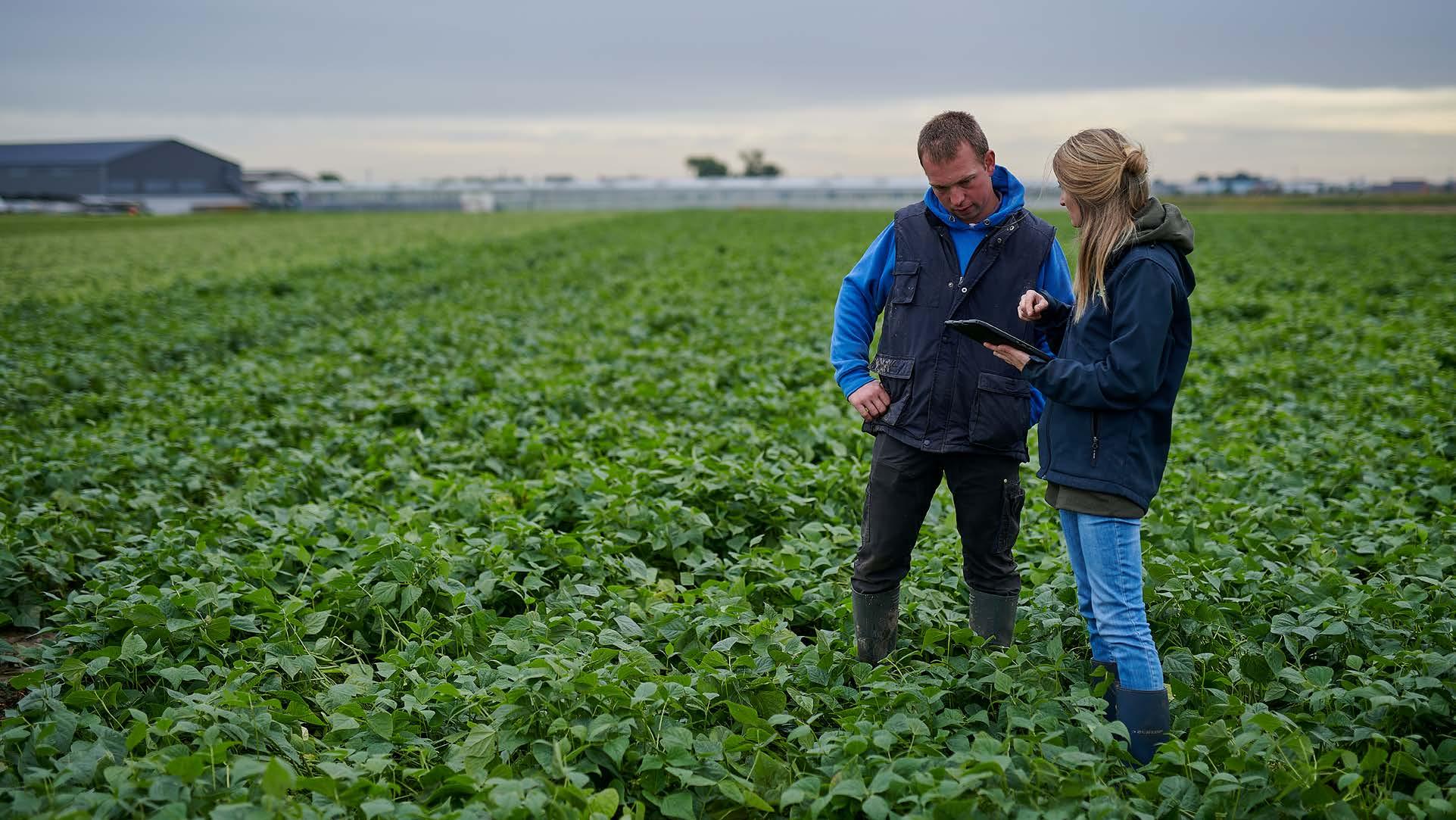
Agreo, our modern agro-IT platform
Since 2020, we have been gradually implementing the Agreo agro-IT platform, yielding significant benefits, including the standardisation of data exchange, more accurate reporting, centraliced data, enhanced traceability and improved communication between the field and the factory.
Agreo is currently deployed at 12 of the 14 Ardo vegetable and herb production sites. The system ensures instant visibility between upstream activities in the field and downstream actions in the factory at the touch of a button, eliminating the need for manual tracing. Our goal is to achieve 80% digital crop traceability on the system by 2025, with the objective of reaching 100% by 2030.
This digitalisation process will substantially enhance our record-keeping capabilities for the implementation of our MIMOSA+ programme. Utilising Agreo enables us to monitor key performance indicators (KPIs) and track the progress of improved agricultural practices across the 41,000 hectares of crops under our contract.
Implementing innovative MIMOSA+ practices on pilot farms
In addition to endorsing established Good Agricultural Practices, we actively explore various innovative methods. We designate certain forward-thinking farmers as pilot farms to experiment with novel regenerative agriculture techniques. These initiatives involve collaboration with technical advisors, research centres and our customers. Our ambition is to establish at least one pilot farm per production site by 2025.
Agronomy MIMOSA+
The
to
Food safety, quality and innovation Respect for our employees Relationship with our stakeholders Good governance Minimal environmental impact 43
are Ardo
path
a more sustainable food system
Living soils – Improving soil health and humus content 1
The soil’s structure is crucial in withstanding extreme weather conditions and it is essential to recognise that our agricultural practices significantly influence it.
The soil is a dynamic ecosystem which hosts 80% of biological activity. This biological activity plays a crucial role in creating a healthy and well-structured environment for growing crops, more specifically root penetration, water infiltration and nutrient availability. The zone between 30 to 50 cm, which is impacted by farmer activity, requires careful management. The first consideration is to prevent damage to the soil structure, as structural challenges like compacted layers hinder the efficiency of biological activity and root penetration, as well as reduce the soil's water retention capacity.
The timing of vegetable harvesting, particularly in wet conditions with heavy machinery, can impact soil structure. Organic matter, especially humus, is essential for improving soil structure. Soils with higher organic content exhibit greater resilience to extreme conditions. This is why our primary target is to enhance the soil humus content, thereby improving the soil structure of the fields on which we conduct agricultural activities.
“Our soil is our greatest ally.”
Luc Hayois Farmer from Wallonia
“Soil porosity is important for oxygen, but also for the amount of water the soil can store and therefore has available for plants. A well-structured soil can hold up to 60 litres of water per square metre available for plants.”
Jean-Marc Pirard Agronomist
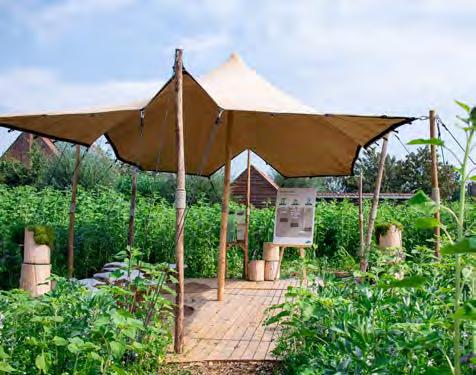
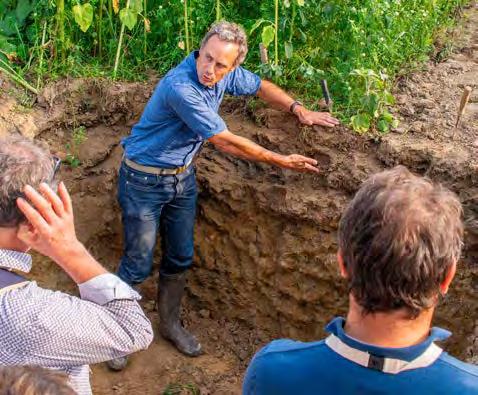
Agronomy MIMOSA+
are Ardo The path to a more sustainable food system Food safety, quality and innovation Respect for our employees Relationship with our stakeholders Good governance
environmental impact 44
We
Minimal
Increased levels of biological activity, organic matter and enhanced soil structure are key to living soils, providing greater resilience to extreme weather conditions.
2
Cover crops – Implementing soil cover for more than 240 days a year and optimising cover crop mixes
As part of our MIMOSA+ programme, we encourage our farmers to grow cover crops and cover the soil for more than 240 days a year. These practices offer numerous advantages to soil health and the resilience of our crops.
Cover crops improve soil health by reducing erosion, enhancing soil structure and increasing organic matter to ensure stability. More specifically, they add a wide variety of benefits to field management:
- Cover crops provide essential nutrients to the soil through the addition of organic matter and root exudates, fostering both aeration, infiltration and water storage.
- They also facilitate nutrient recovery, preventing nitrogen leaching and enhancing the availability of elements like potassium, magnesium, calcium and ammonium for subsequent crops.
- Certain cover crops, such as legumes, fix nitrogen, reducing the need for synthetic fertilisers and supporting nutrient (re)cycling, thus offering long-term economic benefits for farmers.
- Growing cover crops promotes biodiversity by introducing more vegetable species, thereby increasing microbiological diversity and reducing pressure from soil pathogens and weeds. Additionally, they provide habitat for beneficial wildlife.
- Furthermore, cover crops could enhance drought resistance, diversify crop rotations and reduce soil compaction.
- Finally, combined with short-cycle vegetable crops, they stabilise or increase organic matter, contributing to long-term carbon sequestration in the soil.
In Violaines, France, we have collaborated with several farmers to sow a range of cover crop seed mixes. We then evaluated the different impact of each mix on soil fertility and carbon sequestration. Growing of cover crops is already a common practice among farmers. However, our pilot farms have demonstrated that further improvements can be achieved through optimised seed mixes. We regularly organize workshops with our farmers to exchange insights gained from these experiments.
“Cover crops have the advantage that they limit erosion, provide nitrogen, reduce the consumption of mineral inputs and optimise vegetable yields. The soil really does have a better structure and is able to retain water better. This will play a big role to ensure soil fertility in the long run.”
Valentin Cordonnier Agronomist
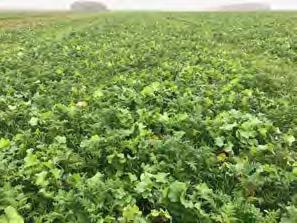
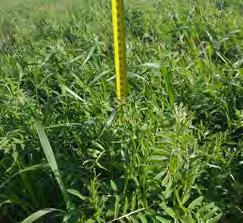
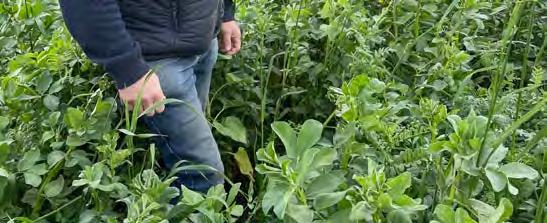
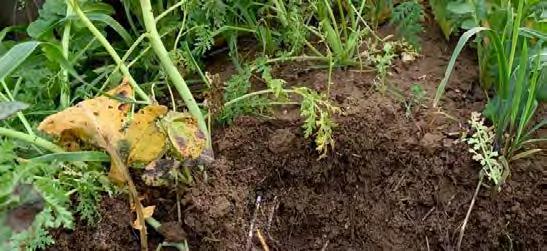
MIMOSA+
Agronomy
Respect for
with
Good governance
We are Ardo The path to a more sustainable food system Food safety, quality and innovation
our employees Relationship
our stakeholders
45
Minimal environmental impact
The power of diversity to feed the soil
2T dry matter/ha
3T dry matter/ha
6T dry matter/ha
Soil structure
Selecting an effective cover crop mix can increase dry matter production, enhance nutrient availability and improve the soil structure of the field.
We
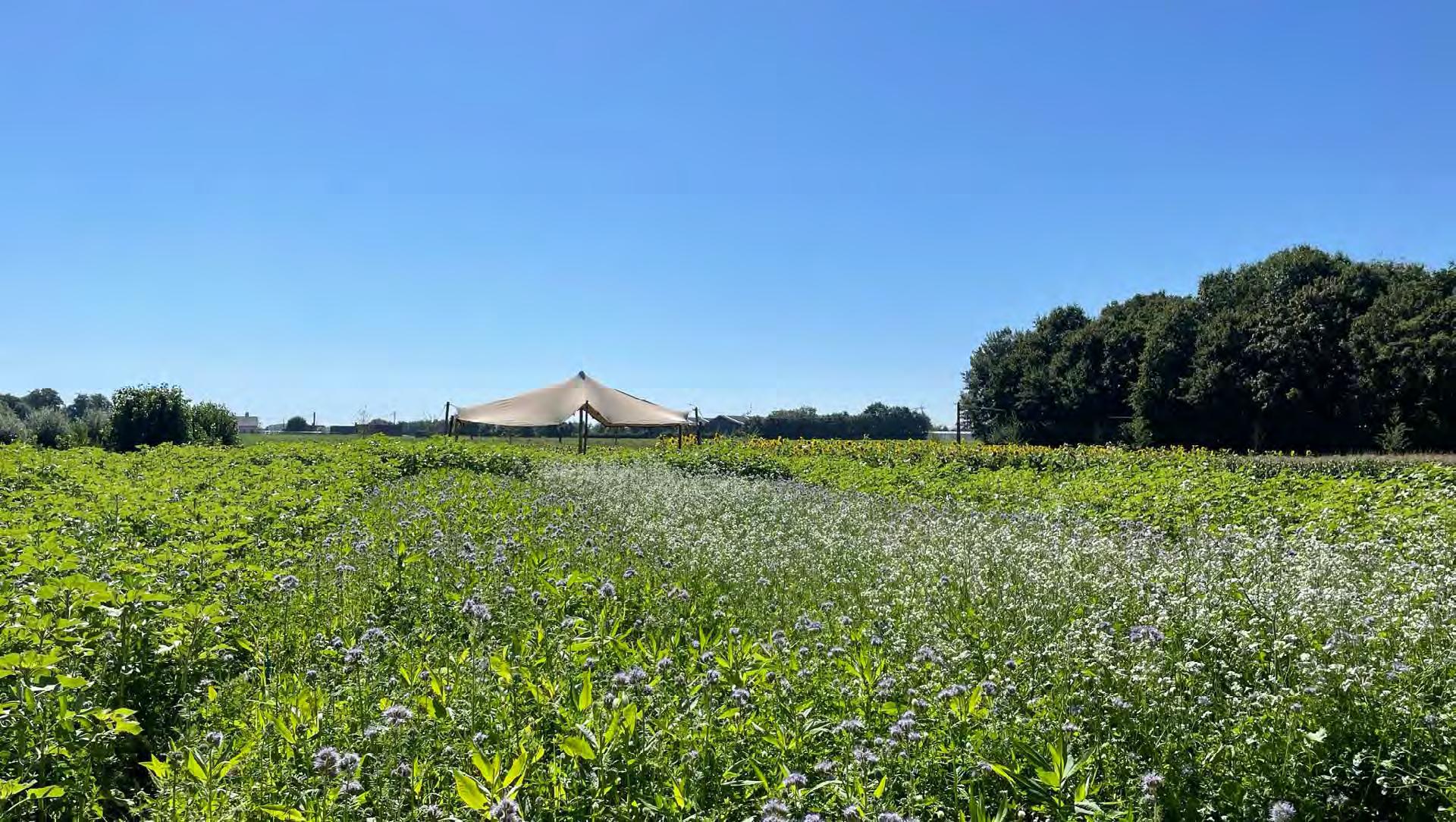
Biodiversity – Allocating surface to biodiversity development 3 Biodiversity loss is another alarming issue, with 70% decline globally over the past 50 years1. At Ardo, we are keen on making a positive contribution to restoring the biodiversity surrounding our 43,000 hectares of vegetables. Our goal is to support farmers in allocating a share of agricultural land to biodiversity through flower beds or other types of biodiversity infrastructures. We have already implemented several biodiversity improvement projects across our growing zones.
Increasing biodiversity on farms has various benefits:
- Biodiversity helps control pests through the presence of for example predators that regulate pest populations, reducing the need for pesticides.
- Biodiversity will attract various pollinators, enhancing the pollination of certain crops and increasing yields.
- Flower strips, trees and shrubs in the landscape will contribute to the cultural identity of communities and provide aesthetic value in traditional agricultural landscapes.
4% of arable land will need to be allocated as non-productive areas following a new European regulation. This presents an opportunity to assign this land to biodiversity islands, bringing benefits to the farmers.
During our “Let’s Meet in the Field” event, we showcased various solutions for enhancing biodiversity in our demonstration field. The objective of this demonstration was to encourage farmers to allocate these 4% arable land to biodiversity.

“I’ve noticed that crop auxiliaries are often there to help me. Over the years, I’ve observed that we don’t need to use as many insecticides anymore.”
Luc Hayois Farmer in Wallonia
Agronomy MIMOSA+
are
sustainable food
Food safety, quality and innovation Respect for our employees Relationship with our stakeholders Good governance Minimal environmental impact 46
Ardo The path to a more
system
1 Source: Living Planet Index WWF Six charts that show the state of global biodiversity loss | World Economic Forum (weforum.org)
We
Case
Across our production sites, we are continuously investing in biodiversity projects
In Gourin, France, we launched the ‘Des Fleurs et des Ailes’ project, which means ‘Flowers and Wings’, in collaboration with one of our customers in the spring of 2020. This initiative included the installation of 130 raptor birdhouses near spinach fields and sowing 177 hectares of flowers close to pea and bean fields, creating vital habitats for insects, pollinators and birds. This project not only educates farmers on ecosystem services, but also raises community awareness of their essential roles. Over a hundred children visited the farms to learn about biodiversity in nearby vegetable fields.
In 2015, our site in Zundert, the Netherlands, opened a 4.7 ha nature reserve, showcasing the harmonious coexistence of nature and industry. Established in partnership with the municipality of Zundert, the reserve compensates for industrial activities like the Beekzicht business park and cold storage. This green zone connects to the Aa of Weerijs river’s stream valley, creating a diverse habitat for various animals and plants. The area now supports a wide range of species, including small songbirds, woodpeckers, owls, bats, bees and more. Initially, the reserve’s management fell under our responsibility, but “Natuurmonumenten” took over in 2018, while we continue to contribute to its maintenance. The site also hosts an apiary managed by the Dutch Beekeepers Association.
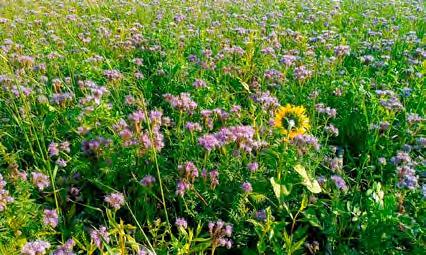
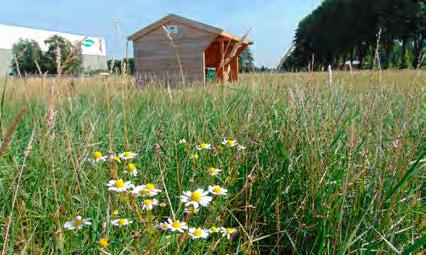
Near our site in Geer, Belgium, is the unique 35 ha Haut-Geer nature reserve. This reserve is home to over 200 bird species and is collaboratively managed by us, the producer organisation Apligeer and the nature organisation Natagora. It has gained popularity as a birdwatching destination in Wallonia and also serves as a storage site for process water. HesbayeFrost, our site in Geer, redirects its used water to the reserve, where some ponds are dedicated to environmental preservation. Others contain recycled process water that can be used for irrigation purposes, benefiting approximately 1,200 hectares of irrigable land.
Monliz España is naturalising artificial reservoirs used for irrigation in farmers’ fields. To improve local biodiversity, they are taking several actions:
- Planting native plants such as bushes and aromatic plants along the pond borders.
- Installing bat and birdhouses.
- Creating cork islands with aquatic species within the reservoir, forming a wetland habitat. This approach leads to year-round flowering, attracting beneficial insects, bats and birds that help control pests, thereby contributing to a more balanced and resilient ecosystem.
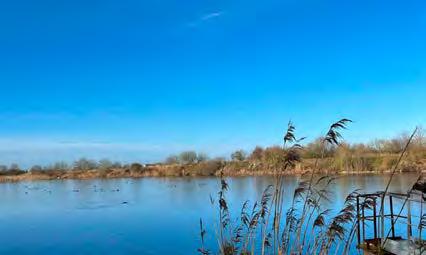
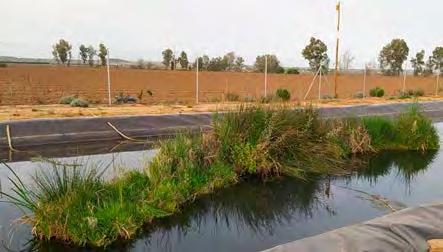
Agronomy MIMOSA+
to
Food safety, quality and innovation Respect for our employees Relationship with our stakeholders Good governance Minimal environmental impact 47
are Ardo The path
a more sustainable food system
Flower fields creating vital habitats for insects, pollinators and birds
The nature reserve in Zundert showcases the harmonious coexistence of nature and industry
The Haut-Geer nature reserve is home to over 200 bird species
Monliz España is naturalizing artificial reservoirs used for irrigation in farmers’ fields
We
Water – Optimising irrigation 4
The availability of water used for irrigation from regular rainfall or water reserves has become increasingly less reliable over the years. Changes in rain patterns in our Northern growing regions, influenced by climate change, lead to longer periods of droughts and more intense rainfall at other times of the year. In the south of Europe, there is a drastic reduction in water levels in reserves traditionally used for irrigation. These trends emphasise the need to preserve this precious resource and use it as efficiently as possible.
Good structure
Bad structure
pluviometry (mm) irrigation (mm) pressure (centibars) pressure (centibars)
pluviometry (mm) irrigation (mm)
Water is crucial for the growth and development of plants through the photosynthesis process, which converts the CO2 that is captured in the air by plants into oxygen and energy-rich organic compounds such as sugars. Without water being absorbed by plants through the root system, the photosynthesis cannot take place and plant development is hampered.
Soil structure significantly impacts water capture. Well-structured soil enables deeper root development and reduces irrigation needs. Poorly structured soil leads to shallow roots and increased vulnerability to drought.
According to industry research, around 70% of irrigation decisions are made based on farmers’ experience and feelings. This poses a critical issue, since water is the single most important factor in ensuring the production of our raw materials. With an estimated 25,000 hectares of crops being irrigated, we want to improve water use efficiency: by 2025, 80% of irrigation activities will be based on crop needs or soil moisture deficit measurements, with a further increase up to 100% by 2030.

A bad soil structure characterised by underdeveloped root systems restricts their depth and creates an increased need for irrigation. A good soil structure has the opposite effect and saves water from being wasted.

Agronomy MIMOSA+
are Ardo The path to a more sustainable food system Food safety, quality and innovation Respect for our employees Relationship with our stakeholders Good governance Minimal environmental impact 48
9-Aug 16-Aug 23-Aug 30-Aug 7-Sep 14-Sep
15 cm 35 cm 5 5 10 10 15 15 20 20 25 25 30 30 120 120 100 100 80 80 60 60 40 40 20 20 0 0 WATER
PRESSURE
AT 25CM DEPTH - PLUVIOMETRY - IRRIGATION
11-Aug 17-Aug 24-Aug 31-Aug 7-Sep 14-Sep
WATER EXCESS - COMFORT ZONE - WATER STRESS
Plant nutrition – Reducing fertilisation 5
The use of nitrogen-based fertilisers in agriculture is associated with various environmental issues, including greenhouse gas emissions, soil degradation and water pollution. Following our MIMOSA+ principles, we assist our farmers in optimising crop yields and product quality while minimising the use of mineral fertilisers.
Plant life and growth is based on the availability of 14 elements, including nitrogen, potassium, phosphate and many more. To optimise plant growth, we need to find a good balance between these nutrients. However, the needs for these elements vary in time. Therefore, the challenge of fertilisation is to coordinate nutrient availability with plant needs. Soil mineralisation is especially difficult to predict and influenced by many factors (organic matter content, pH, type of soil, humidity, etc.).
Leguminous reduce the risk of excess nitrogen polluting the soil and groundwater. They require little or no nitrogen-based fertiliser, indirectly impacting our CO2eq emissions, as the production of such fertilisers relies heavily on fossil fuels. Additionally, the nitrogen-fixing bacteria in the root nodules of these crops allow them to convert atmospheric nitrogen into ammonia. It nourishes the plant and, in turn, enriches the soil with nitrogen for subsequent crops.
Conducting regular soil analyses can help optimise plant growth by avoiding unnecessary nutrient supply caused by uncoordinated fertilisation.
At Ardo, over half of our growing area is dedicated to peas, beans and soybeans. These leguminous crops are considered environmentally friendly for several reasons.
Ultimately, it is our ambition to reduce the use of fertiliser on all our crops to minimise the carbon impact while still maximising crop yields.
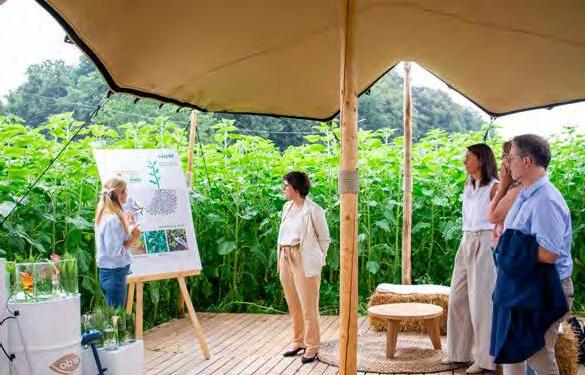
Agronomy MIMOSA+
We are Ardo The path to a more sustainable food system
Food safety, quality and innovation Respect for our employees
Relationship with our stakeholders Good governance
49
Minimal environmental impact
P N Ca Mg S Ni Fe B Mn Zn Cl Mo Cu K
The balance between nutrients is essential for optimal growth
Our agronomist explains the importance of plant nutrients during our Let's Meet in the Field event
MIMOSA+ helps to reduce carbon emissions
Farming practices are often associated with carbon emissions, because of the machinery and inputs used. In adherence to our MIMOSA+ principles, we are committed to reducing the carbon footprint of our crop growing activities by implementing emission-reducing measures and promoting carbon sequestration.
Reducing carbon-emissions
When assessing the CO2 emissions associated with the growing and harvesting of vegetables, herbs and fruit, we note that fertilisers have the most significant impact. As we cultivate a substantial amount of leguminous crops, which capture nitrogen from the air, these crops show lower emissions from fertilisers. In addition to fertilisers, one of the primary contributors to the emissions of our crops is the yield in the field. For instance, we observe that the carbon footprint of carrots is considerably lower than that of other vegetables, primarily due to the high average field yield.
Following our commitment to SBTi, we categorised our scope 3 emissions into FLAG (Forest, Land and Agriculture) and non-FLAG emissions. On the chart, you can see that the emissions from agricultural activities (scope 3 FLAG) represent 35% of our total carbon footprint (scope 1, 2 and 3). FLAG emissions are classified into emissions from Ardo contracted Agriculture and Purchased Food. Ardo contracted Agriculture makes up 28% of these FLAG emissions and represent ca. 14% of our total carbon footprint (scope 1, 2 and 3).
Carbon sequestration
Farming can also have a positive impact on the environment, particularly when activities are introduced that support the capture of carbon in the soil, a process known as carbon sequestration.
The agricultural practices performed by our farmers during crop production for Ardo can play a crucial role in enhancing carbon sequestration. However, even more impactful are the farming practices carried out during the intervening years of crop rotation (such as cover crops) before a field returns to producing vegetables, fruit or herbs.
Through our MIMOSA+ programme, we want to support our farmers in implementing practices that can induce carbon sequestration. We take soil samples to measure the soil’s current carbon content, track its evolution and provide data points for monitoring progress and evaluating the impact of different farming activities. This will help steer the focus of our MIMOSA+ programme in the coming years.
High nutrient level
H2OCO2
High organic matter
Soil carbon sequestration is the process of capturing and storing atmospheric carbon dioxide in the soil through the incorporation of organic matter, playing a vital role in mitigating climate change and improving soil health.
Sources of GHG emissions for Ardo contracted Agriculture
41% - Direct and indirect emissions from fertilisers (/ton)
1% - Indirect emissions from storage (/ton)
1% - Indirect emissions from plant protection products (/ton)
2% - Indirect emissions from seeds (/ton)
3% - Direct emissions from lime (/ton)
6% - Indirect emissions from transport (/ton)
9% - Direct emissions from crop residues (/ton)
10% - Indirect emissions from irrigations
27% - Indirect emissions from mechanical operations (/ton)
Agronomy MIMOSA+
are Ardo The path to a more sustainable food system Food safety, quality and innovation Respect for our employees Relationship with our
Good governance
environmental impact 50
We
stakeholders
Minimal
GHG inventory scope 1, 2, 3 - FLAG and non-FLAG (FY22/23)
Scope 3 95% Scope 1 3% Scope 2 2% Purchased Food 72% Ardo contracted Agriculture 28% 11% Use of sold products 16% Waste 4% Scope 3 non-FLAG 60% Scope 3 FLAG 35%
We
Let's Meet In the Field 2023: Embracing regenerative agriculture
In September 2023, we hosted the second edition of our “Let’s Meet in the Field” event. Among the key attendees were our farmers, whom we invited to discuss pressing environmental concerns. Central to this event and our overarching mission was the demonstration and discussion of our MIMOSA+ programme, our response to the changing
climate, focusing on regenerative agricultural practices such as improving soil quality and supporting biodiversity. During the event, we conducted an in-depth exploration of five topics relevant to our MIMOSA+ programme on our demonstration field.
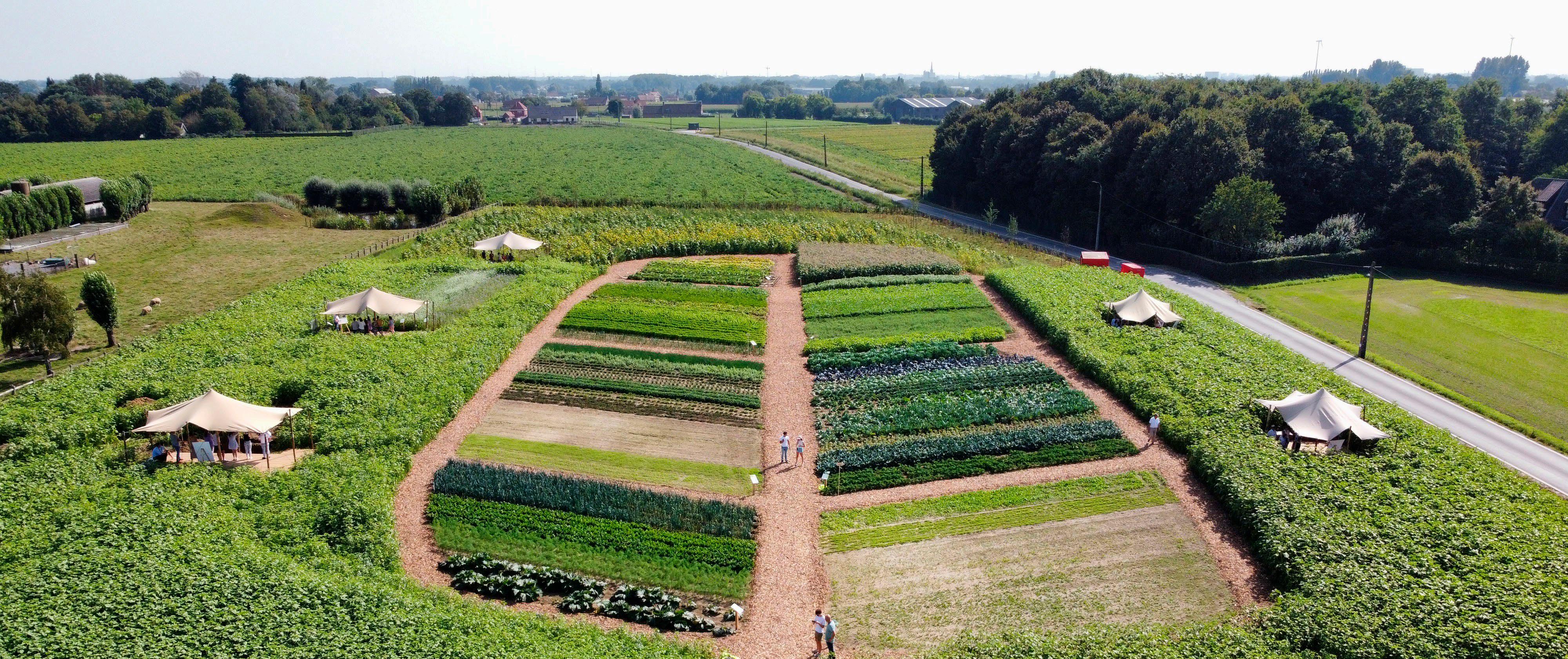
Cover crops
Cover crops play a crucial role in protecting the soil against erosion, mitigating climate impact and facilitating water infiltration.
Biodiversity
Increased biodiversity on farms yields various benefits such as reduced need for pesticides, enhanced pollination and more variety instead in traditional agricultural landscapes.
Water
Water is vital for the growth and development of our crops. We aim to enhance water use efficiency by evaluating the crops’ water requirements and optimising water usage based on data collection.
Living soils
It all starts with good soil health and structure, which are key for enabling plants to access the necessary nutrients and water, especially during periods of drought.
Plant nutrition
Regular soil analyses can help steer optimal fertilisation, preventing unnecessary nutrient supply while optimising plant growth.
Agronomy MIMOSA+
The path to a more sustainable food
Food safety, quality and innovation Respect for our employees Relationship with our stakeholders Good governance Minimal environmental impact 51
are Ardo
system
Watch the Let's Meet in the Field video
3. Summary: How does Ardo make a difference?
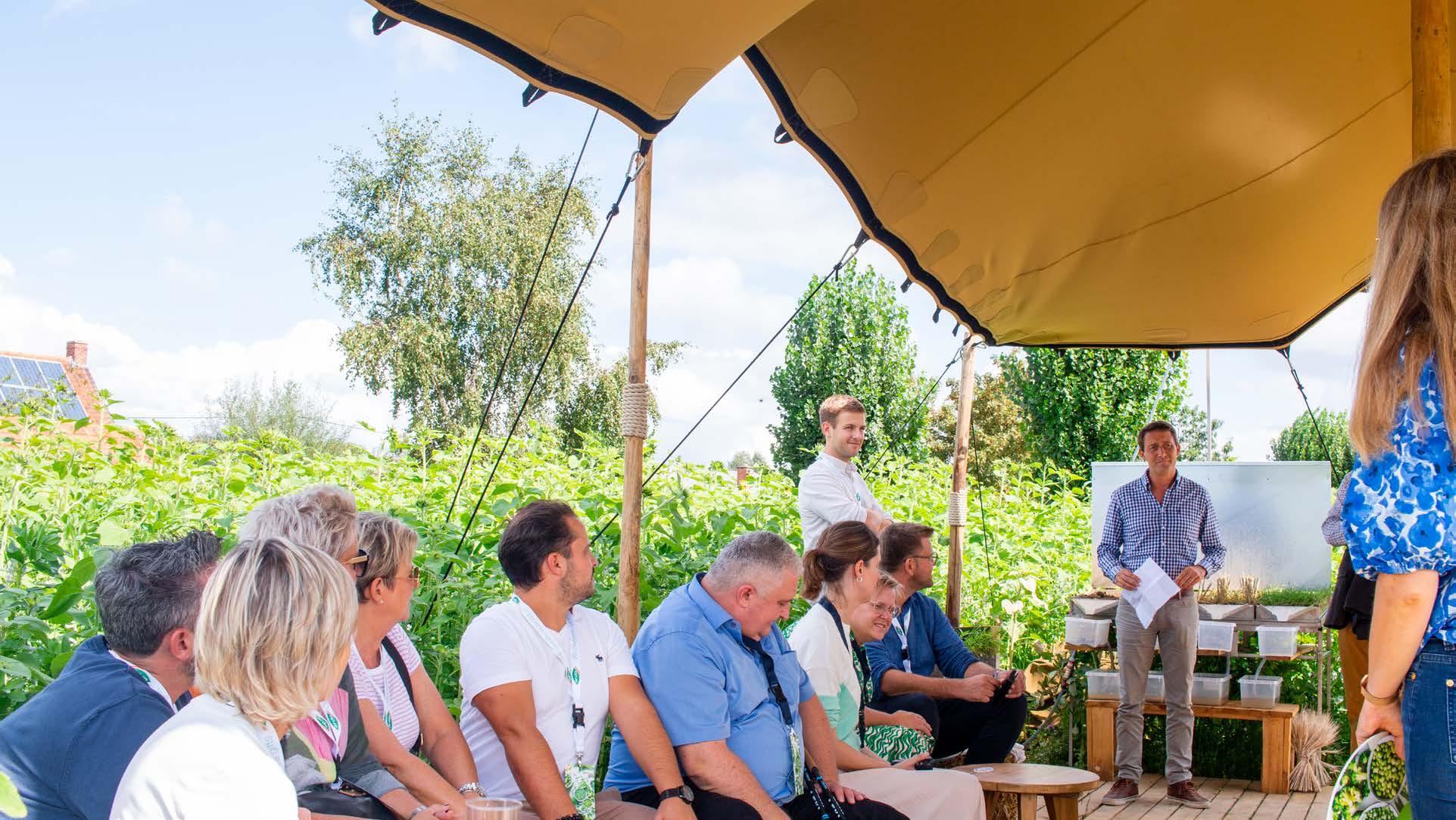
• With a team of 65 agronomists, we support over 3,500 farmers and optimise crop growing through active field management.
• During our “Let’s Meet in the Field” event in September 2023, we gathered various stakeholders, including farmers, customers, machine and seed suppliers, research centres and even political representatives to discuss the implementation of MIMOSA+ practices.
• We have launched the MIMOSA+ programme to collaborate with farmers to adopt regenerative agricultural practices. This includes allocating land to biodiversity development, implementing soil cover for more than 240 days a year, reduced use of synthetic fertilisers, smart irrigation and improving soil health. This way we aim to limit the climate impact of our growing activities while ensuring optimal yields.
• We are committed to reducing the carbon footprint of our crop growing activities by implementing measures that actively reduce emissions.
Agronomy MIMOSA+ We are Ardo The path to a more sustainable food system Food safety, quality and innovation Respect for our employees Relationship with our stakeholders Good governance Minimal environmental impact 52
We are Ardo The path to a more sustainable food system
Minimal environmental impact Agronomy MIMOSA+
Food safety, quality and innovation
Respect for our employees
Relationship with our stakeholders Good governance
Key performance table
Cover crops
Increase % of hectares covered for more than 240 days a year New New target
Living soils
Improve soil humus content (Average ratio humus/clay measured) New New target
Efficient water use
Minimum 80% of irrigation based on crop needs or soil moisture deficit measurements by 2025 and 100% by 2030
Estimated at 30% New target
Scope 3 FLAG² emissions (agricultural activities)
Absolute reduction in GHG emissions (T CO2eq) generated by farming Ardo’s raw material from FY21/22 to FY29/30, in line with SBTi FLAG targets1
Biodiversity
Increase biodiversity and natural habitats in our growing regions (hectares allocated to biodiversity / hectares cultivated) New New target
Fertilisation
Improve nitrogen use efficiency (kgs of nitrogen / T prod) through reduction of fertiliser use on our crops
New New target
Residue free (MIMOSA)
Minimum 80% of planned production volume with residues less than the detection limit (<0.01 ppm) by 2027
All figures are excl. the production site in La Paz (Costa Rica) and Joint Ventures at 50%
1 FLAG = Forest, Land and Agriculture
Target 20/21 21/22 22/23
341,161 352,295
New target
76% 76% 77% On
track
53
Marion,
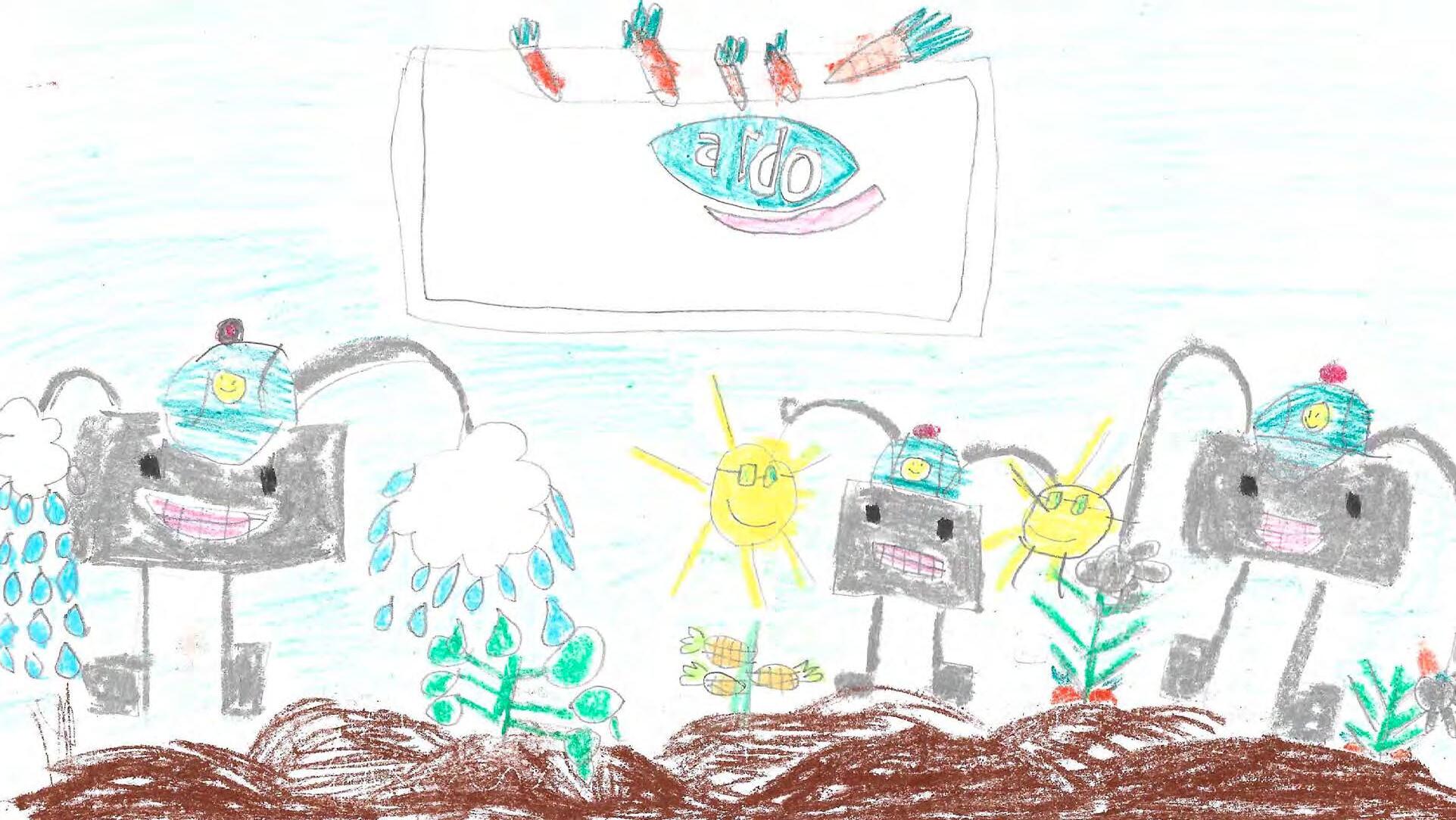
54
A robot to give rainwater, sunshine and a third robot to pick the vegetables.
8 years, Belgium
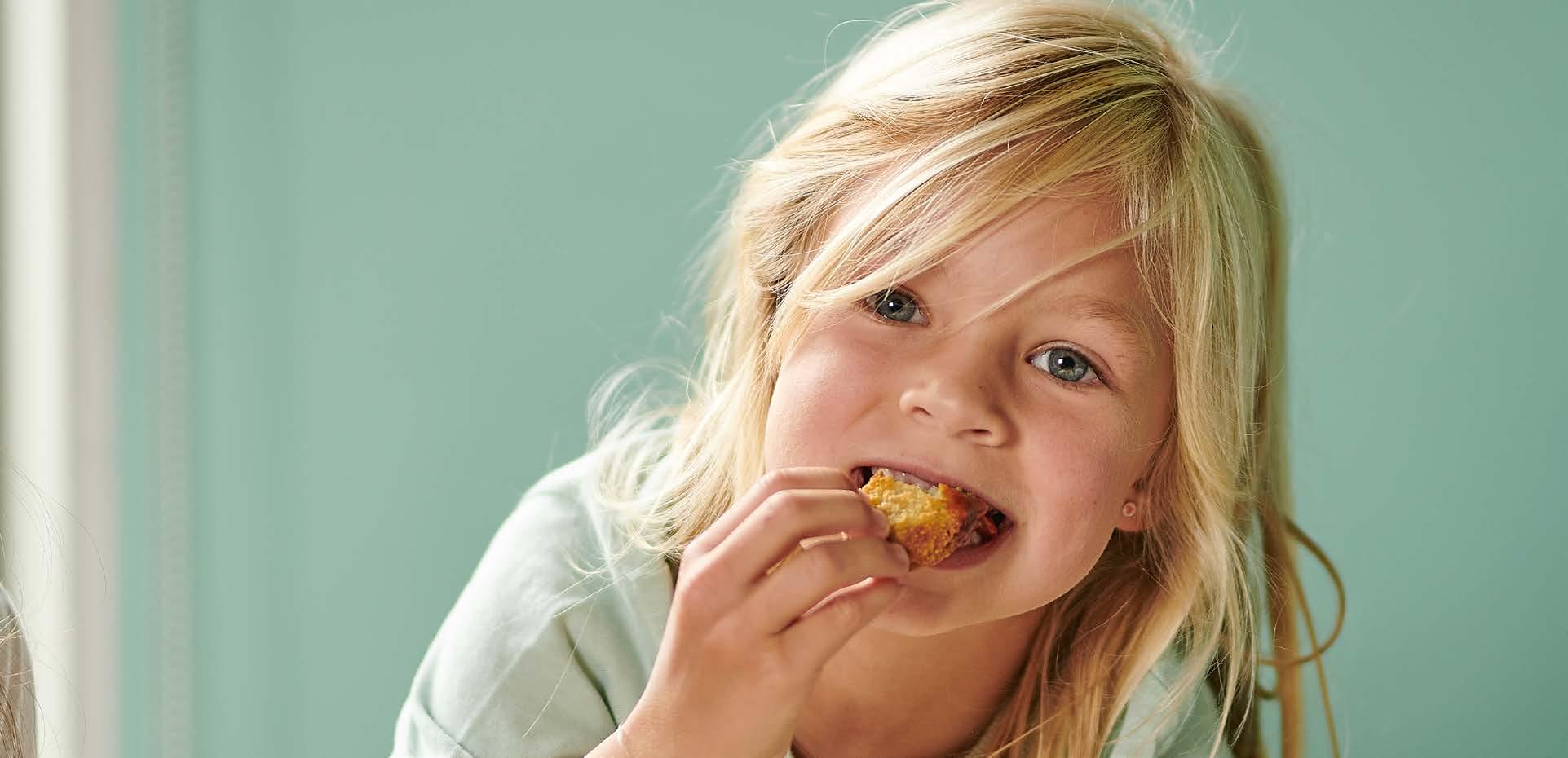
Food safety and quality management are among our main priorities as we aim to provide nutritious food to our consumers. To enhance the quality of our fresh frozen products and offer more convenience, we continuously innovate and contribute to the global shift towards a healthy, plant-based diet.
55
for
Relationship with
Good governance
environmental impact Agronomy MIMOSA+
Food safety, quality and innovation Respect
our employees
our stakeholders
Minimal
1. Ensuring food safety and quality across our operations
Quality is one of our main priorities, influencing every aspect of our operations. From the field to our factories and external suppliers, we prioritise high-quality products, services and processes. This dedication is reflected in our GFSI1 certification, representing the result of our daily commitment to quality.
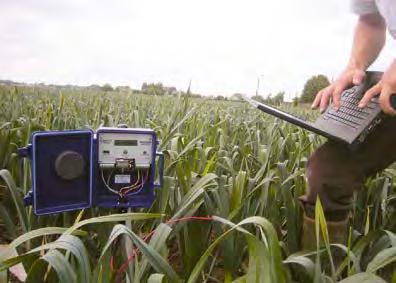
Our dedication to quality is recognised by the GFSI certification of all our production, packaging and distribution sites. All our sites undergo annual IFS2 or BRC3 audits (or both4) and, as part of our ongoing commitment to quality, we are transitioning from announced to unannounced audits.
The GFSI certification demonstrates the dayto-day dedication to quality by our team and the robust support provided by our Quality Department, which consists of over 100 experts. They ensure strict adherence to the numerous procedures outlined in the quality manual and provide comprehensive reporting on the Group’s quality performance, covering aspects such as
GFSI: Global Food Safety Initiative
2 IFS: International Featured Standard
3 BRC: British Retail Consortium
complaints handling and incidents.
Our commitment to food safety and quality extends across every layer of our ecosystem, ranging from the field and factory to external suppliers.
On the field
Our PURE project (Prevent, Uncover, Reduce, and Eliminate foreign bodies), preventing foreign bodies in our final products, starts by eliminating them in the field. Before harvest, an agronomist conducts a thorough inspection to ensure optimal field maturity and appropriate product quality before authorising the release of the field. The real-time “Field release” report is accessible
4 Both IFS and BRC are internationally recognised Food Safety standards which have been benchmarked by GFSI.
through Agreo, our modern agro-IT platform (see chapter “Agronomy”), enabling the quality and production departments to assess whether any additional actions are needed during the production process.
We are implementing the use of drones together with artificial intelligence to inspect our fields for contaminants, such as foreign objects or toxic weeds. After image processing, a map is generated and transmitted to a designated individual responsible for removing the contaminants before the harvest machines collect the products. A final report is then sent to the farmer.
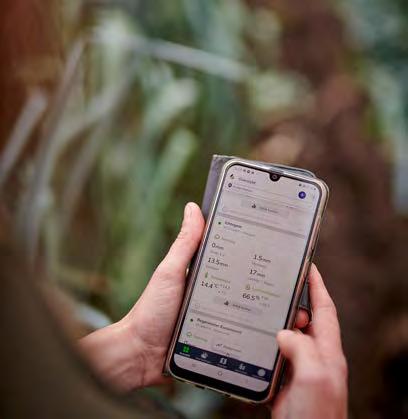
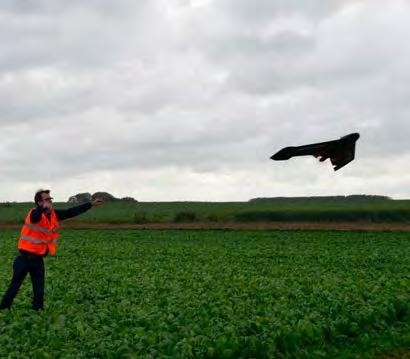
We are Ardo The path to a more sustainable food system Food safety, quality and innovation Respect for our employees Relationship with our stakeholders Good governance Minimal environmental impact 56 Agronomy MIMOSA+
1
In our factories
In our commitment to delivering the finest fresh frozen vegetables, herbs and fruit to our customers, we uphold the highest standards of food safety and operational hygiene across every aspect of the production chain. To translate this philosophy into action, we have initiated two projects.
Starting in the field, our PURE project (Prevent, Uncover, Reduce and Eliminate foreign bodies), is further implemented in our factories, aiming at preventing foreign objects (items consumers do not expect in purchased products) from entering our end products. Our aim is nothing short of achieving 100% contamination-free products.
As a specific illustration, this year we improved and renewed the packing lines in Zundert. We turned an existing coldstore into a state-of-theart packing hall. Next to efficiency and hygiene, we also focused on PURE. To minimise the presence of foreign materials, we maximised the technology installed to clean the product.
The SHINE project (Food Safety and Hygiene IN Evolution) raises the bar for Good Manufacturing Practices (GMP) and daily operational hygiene at our production sites. As global leader in the production of fresh frozen vegetables, fruit and herbs, we want to ensure hygienic production conditions to limit the risk of Listeria or other contaminations.
As part of this initiative, in 2023, we conducted an extensive study for the investment in three new blanching equipment units across our sites in Belgium, France and Spain. The local teams, group Engineering and group Quality teams meticulously evaluated suppliers, prioritising a hygienic design for the blanchers and conducting on-site visits to ensure adherence to rigorous standards.
In Alpiarça we are implementing the Food safety Culture in a playful way, involving employees in activities throughout the working day. Examples include blindly cleaning hands, a pepper plant as a gift saying ‘Food safety is in your hands’ and many other initiatives.
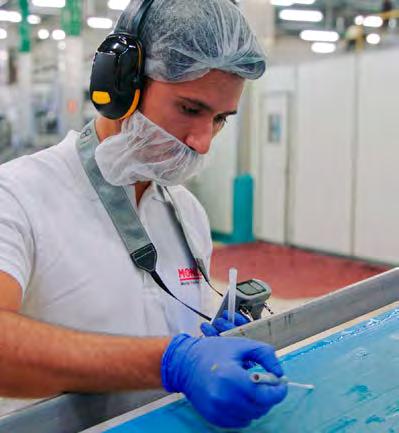
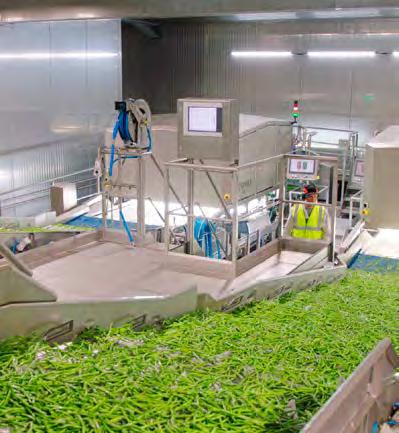
We are Ardo The path to a more sustainable food system Food safety, quality and innovation Respect for our employees Relationship with our stakeholders Good governance Minimal environmental impact 57 Agronomy MIMOSA+
2
With our external suppliers
In addition to our quality assurance efforts in our own factories and in the field, we have established our Supplier Assurance Programme to oversee the quality and food safety of externally procured products. The close proximity of Ardo people to our suppliers across diverse geographical regions allows us to comprehend the entire supply chain and effectively manage risks, including ethical and
sustainability compliance for our sourced product portfolio, such as fruit and ingredients. At Ardo, we want our purchased products to adhere to the same elevated standards of food safety, quality, sustainability and ethical compliance as those that we produce ourself.
Together with the centralised purchasing of externally sourced goods at group level, we have developed a standardised policy for approving and
managing group suppliers. By using a classification system based on various criteria, we maintain a comprehensive record of approved suppliers on our digital platform, including details regarding their food safety and quality management procedures. We also assess whether our suppliers adhere to globally recognised food safety standards such as GLOBALG.A.P. or FSA. Furthermore, our officers conduct food safety compliance audits to ensure alignment with Ardo's objectives. Last year,
53 supplier audits were conducted. Following this classification system, existing suppliers are categorised into three tiers. As part of our strategy to mitigate food safety and quality risks, we are gradually phasing out tier three suppliers while cultivating robust relationships with our tier one suppliers, designating them as strategic partners.
“Collaborating with suppliers provides us with different perspectives and insights into various working methods, helping us to identify areas for improvement. Simultaneously, suppliers can learn from us as well and improve their capabilities in areas where they may be lacking. Physical visits and discussions play a crucial role in advancing and enhancing food safety. They foster mutual understanding and forge a unique bond with our suppliers and the products they provide.”
“As Supplier Assurance Officers, our primary objective is to minimise costs associated with substandard quality and protect Ardo’s brand. Audits and technical visits help ensure the quality and food safety of the products we purchase. Our on-the-ground presence allows us to respond quickly. It improves transparency and confidence, creating a win-win situation for all stakeholders.”
“Our approach distinguishes itself as our Supplier Assurance Officers are located close to our suppliers in Europe, South America and Asia. They collaborate closely with them, monitoring their performance. This is why we refer to them as our ‘Local Boots on the Ground’ (LOBOs). They are our local eyes and ears, as well as the link between our suppliers and buyers.”
“As the 'Local Boots on the Ground', our shared objective is to shield Ardo from risks and issues that may arise from external procurement.”
Philippe Thomas Supplier Assurance Officer for America & Africa
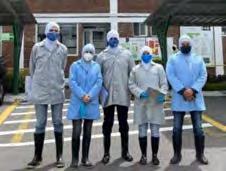
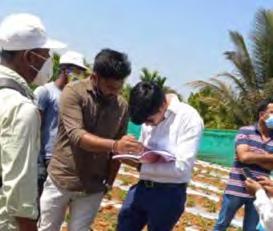
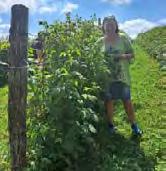
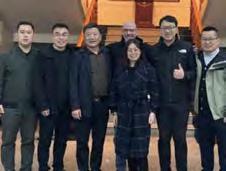
“Despite the diverse regions we source from, we consistently find suppliers who share Ardo's values and interests, fostering long-term cooperation. Therefore, we take pride in serving as the bridge that connects Ardo with suppliers, extending our commitment and responsibility to customers and society.”
We are Ardo The path to a more sustainable food system Food safety, quality and innovation Respect for our employees Relationship with our stakeholders Good governance Minimal environmental impact 58 Agronomy MIMOSA+
Tushar Bahl Group Quality Manager
Magdalene Bogdanska Supplier Assurance Officer, Europe and Fruit Technical Support
Ji Li Supplier Assurance Officer Asia
Hanne Crombez Technical Advisor Sales & Support Supplier Assurance
Philippe Thomas in Ecuador
Tushar Bahl in India
Ji Li in China
3
Magdalena Bogdanska on the Serbian raspberry fields
2. Ambition for zero−residue products
Tuning our agricultural practices to our MIMOSA programme has yielded numerous benefits for our farmers, the environment and the quality of our products. Implementing preventive measures, such as good rotation, cover crops and responsible input use, not only enhances growing conditions but also reduces reliance on crop protection products. This shift results in fewer pesticide residues on our fresh frozen products.
One of the primary KPIs for measuring the success of our MIMOSA programme is the percentage of planned production with residues less than the detection limit (<0.01 ppm). Every year, our quality departments conduct over 1,200 random pesticide residue analyses on our frozen products.
The volume of frozen vegetables found to be free of quantifiable levels of pesticide residue, (below the detection limit of 0.01 ppm) reached 77% at group level in 2022, up from 56% in 2014. This positive evolution is the result of our team’s active field management and collaboration with our 3,500 farmers. We will continue to work hard and we are confident that by 2027, 80% of Ardo-grown production will be residue-free.
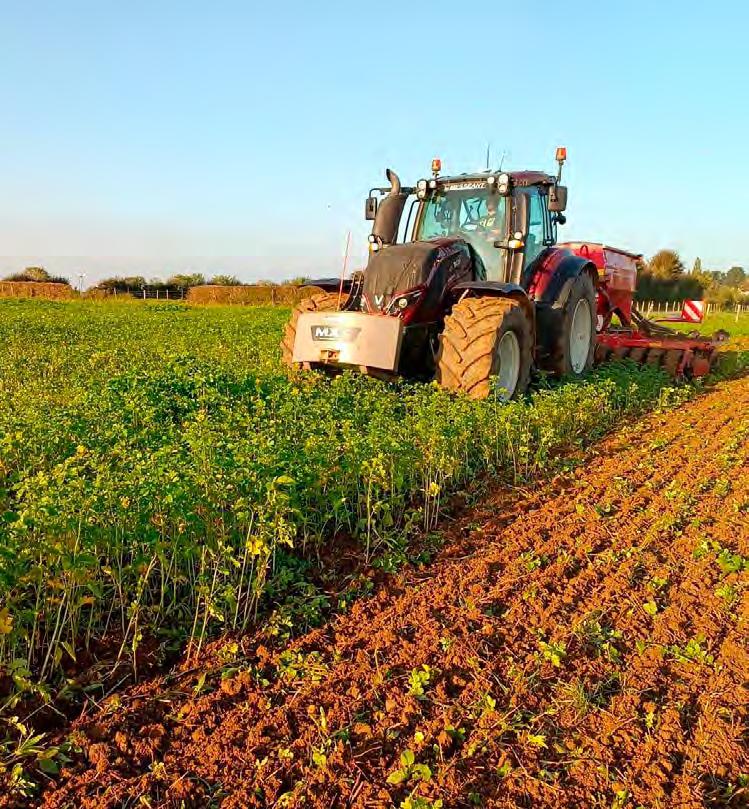
We are Ardo The path to a more sustainable food system Food safety, quality and innovation Respect for our employees Relationship with our stakeholders Good governance Minimal environmental impact 59 Agronomy MIMOSA+
% crop with zero residue 0% 2014 2015 2016 2017 2018 2019 2020 2021 2022 2027 80% 60% 40% 20% 80%
3. Constantly innovating our food offering
In our pursuit of innovation, we are actively shaping a sustainable, plant-based future for our product offerings. This commitment involves optimising raw material usage to minimise food waste and promoting vegetarian and plant-based alternatives across our portfolio.
We are dedicated to reducing food waste by repurposing product and side streams that would typically go to waste. For instance, broccoli stalks are equally nutritious and delicious as the florets. Using them as part of our core raw materials and dicing them for use in our broccoli products, would save a substantial amount of food waste.
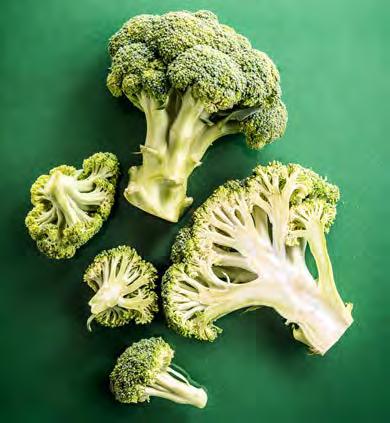
As part of our sustainable innovation journey, we are discontinuing the use of fish and meat products in our factories, opting for vegetarian alternatives and plant-based choices like Brussels sprouts with red beet 'bacon'. Currently, 99% of our sold products are vegetarian and we aim to achieve a 100% vegetarian product portfolio by 2025.
Feeding the growing global population while respecting planetary boundaries requires a dietary shift towards healthy, plant-based diets by 2050. It is our ambition to support this transition with our plant-based product portfolio.
Embracing healthier options, such as fruit, vegetables and pulses not only benefits the environment but also promises significant health advantages for our consumers.
“We have embarked on a journey of innovation, guiding our product portfolio towards a more sustainable, plant-based future. Sustainability is a cornerstone of our innovation strategy and we are continuously increasing our efforts to enhance the sustainability of our product offerings. Ardo offers a complete range of essential components, including vegetables, fruit, carbohydrates and pulses, to create a well-balanced, plant-based meal.”
William Burton Portfolio & NPD Director

We are Ardo The path to a more sustainable food system Food safety, quality and innovation Respect for our employees Relationship with our stakeholders Good governance Minimal environmental impact 60 Agronomy MIMOSA+
Our red beet 'bacon' innovation
We are Ardo The path to a more sustainable food system
Case
In 2023, we launched a new innovative product: corn ribs, which can be used as a vegan alternative for traditional pork ribs. Additionally, our vegetable fingers (including our golden sweetcorn fingers, our orange vegetable fingers with carrot, butternut and sweet potato and our broccoli fingers in a surprising red crust) add colour to the consumer’s plate and serve as alternatives to chicken fingers or fish sticks.
We are also actively developing alternatives for products containing dairy, such as cream spinach, to offer vegan options to our customers.
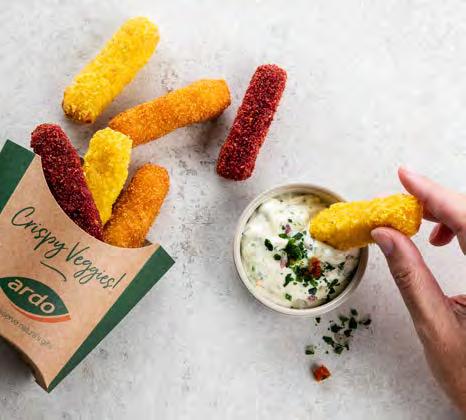
Furthermore, we continue to grow protein-rich vegetables in Europe, such as soybeans from Austria rather than Asia, along with pulses and lentils. We also increasingly use 'in-house' ingredients, including our own produced herbs.
While the majority of our products are inherently healthy and plant-based, our commitment extends to improving the nutritional quality of all our offerings. Our innovation team is actively adjusting recipes to prioritize additivefree or clean label formulations, aligning with our mission to promote a healthy, plant-based diet.
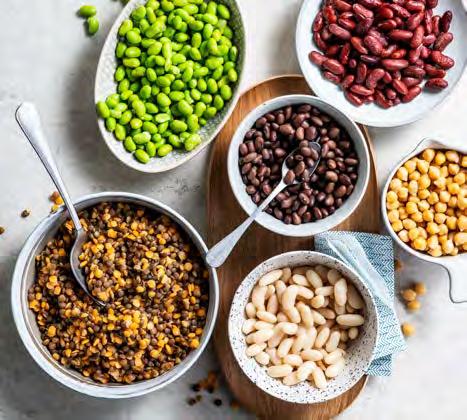
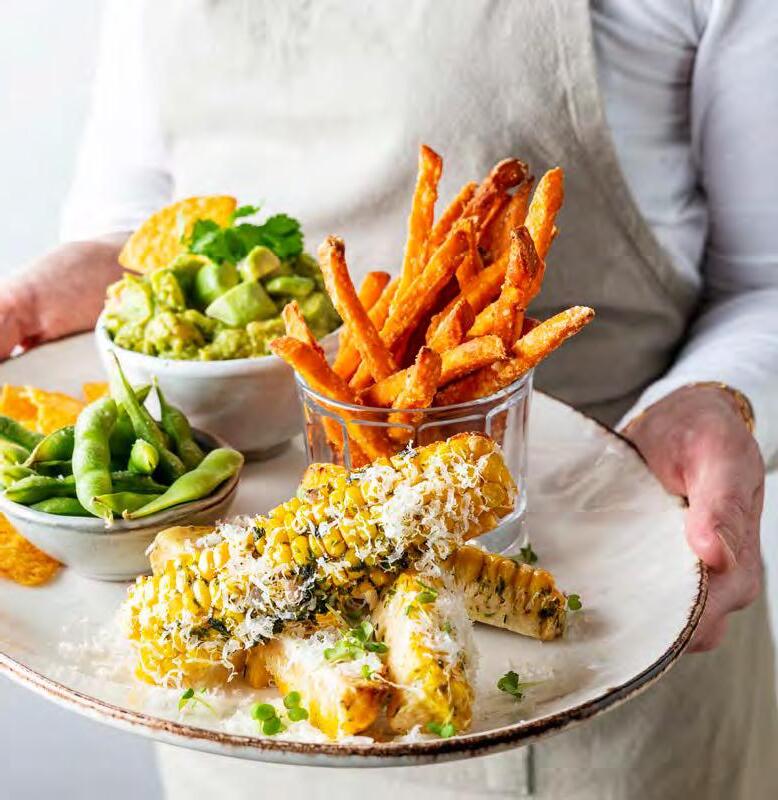
Food safety, quality and innovation Respect for our employees Relationship with our stakeholders Good governance Minimal environmental impact 61 Agronomy MIMOSA+
Corn ribs, edamame beans, avocado, sweet potato fries
Tricolore vegetable fingers
Pulses and lentils
4. Promoting fresh frozen products
Fresh frozen vegetables, fruit and herbs have a range of benefits and are ideal to enable a more sustainable diet for our consumers.
Complete convenience
Enjoy complete convenience in the kitchen with our fresh frozen vegetables, herbs and fruit as everything is pre-washed and pre-cut! And because our fresh frozen products are easy to divide into portions, you can be sure you’re using the right amount every time. Ardo’s fresh frozen products not only save energy, but also a lot of time in the kitchen!
Grown in open fields in the natural season
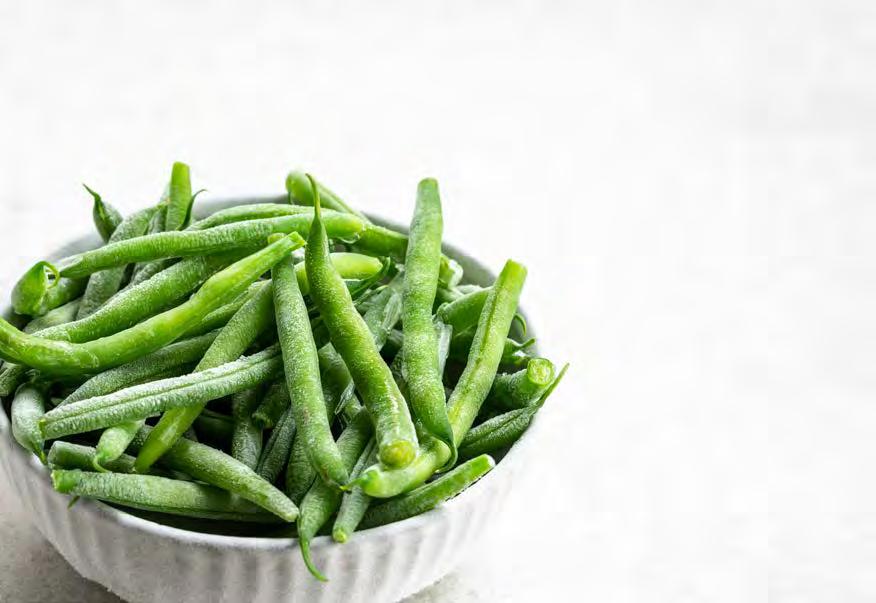
We grow our vegetables, herbs and fruit during the ‘right’ season. This minimises our impact on the environment as they grow in the best possible conditions and use less water and energy.
Less food waste
At Ardo, our products are already pre-washed and pre-cut, and we process the residual waste left behind in our own biomethanation plant. This means you can be sure that the weight you buy actually ends up on your plate.
Packed full of vitamins
The nutritional value of vegetables, herbs and fruit starts to fall straight after they’re harvested. At Ardo, they are frozen in factories close to the fields in thecountry of origin, immediately after harvesting, so they retain their maximum nutritional value.
Cost-effective
Our fresh frozen products allow you to save on costs in the kitchen by enjoying fresh frozen vegetables, herbs and fruit day in, day out, at stable prices that don’t change depending on the season.
Higher vitamin C retention in fresh frozen beans
Frozen -18°C
Freshly bought vegetables after 3 to 7 days
Cold storage 4°C
Cold storage 13°C
daysdaysdaysdaysdaysdays
Time after harvest (days)
Myth or fact: are fresh vegetables more nutritious than fresh frozen vegetables?
The general perception is that fresh vegetables are far more nutritious than their fresh frozen counterparts. But are they really?
A study from Ghent University revealed significant differences in vitamin C levels between fresh and frozen green beans.
Source: Ghent University
We are Ardo The path to a more sustainable food system Respect for our employees Relationship with our stakeholders Minimal environmental impact Good governance Agronomy MIMOSA+
100 80 60 40 20 0 5 10 15 20 25 Vitamin C retention (%)
Food safety, quality and innovation 62
5. Summary: How does Ardo make a difference?
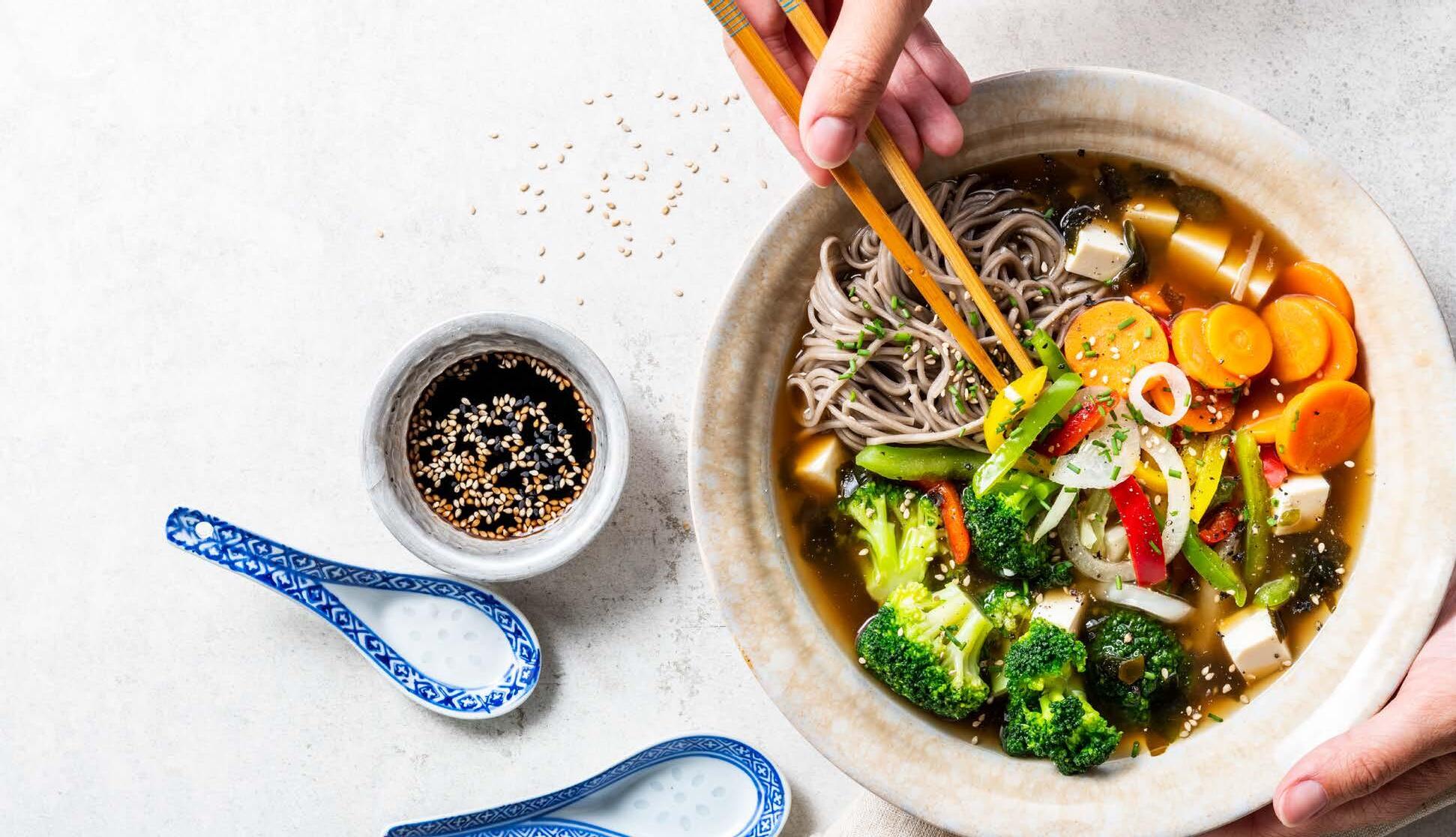
• We maintain very high food safety and quality standards through specific programmes, starting in the field and continued in our factories, extending to our external suppliers:
- SHINE & PURE: Food Safety and Hygiene IN Evolution Prevent, Uncover, Reduce and Eliminate foreign bodies.
- All our production, packaging and distribution sites are GFSI-certified, based on annual IFS or BRC (or both) audits.
- We apply a ‘Local Boots on the Ground’ approach to personally audit our globally dispersed external suppliers on quality and food safety of their products.
• Currently, 77% of our products are free from residues. Our objective is to reach 80% residue-free products by 2027.
• By constantly innovating our product offering, we contribute to the necessary shift towards plant-based diets to feed the growing world population in a sustainable way.
We are Ardo The path to a more sustainable food system Food safety, quality and innovation Respect for our employees Relationship with our stakeholders Good governance Minimal environmental impact 63 Agronomy MIMOSA+
We are Ardo The path to a more sustainable food system
Minimal environmental impact
Agronomy MIMOSA+
Food safety, quality and innovation
Respect for our employees Relationship with our stakeholders Good governance
Key performance table
planned production volume with residues less than the detection limit (<0.01 ppm) by
All figures are excl. the production site in La Paz (Costa Rica) and Joint Ventures at 50% 1 Prevent, Uncover, Reduce, Eliminate foreign material
64
Target 20/21 21/22 22/23 PURE1 (foreign material reduction) Maximum 2.5 PURE complaints / 1000 tons packed by 2030 3.7 3.6 2.9 On track
products 100%
by 2025 99.51% 99.27% On track
Minimum 80%
2027 76% 76% 77% On track
Vegetarian
vegetarian products (sold products without meat/fish/animal proteins)
Residue free (MIMOSA)
of
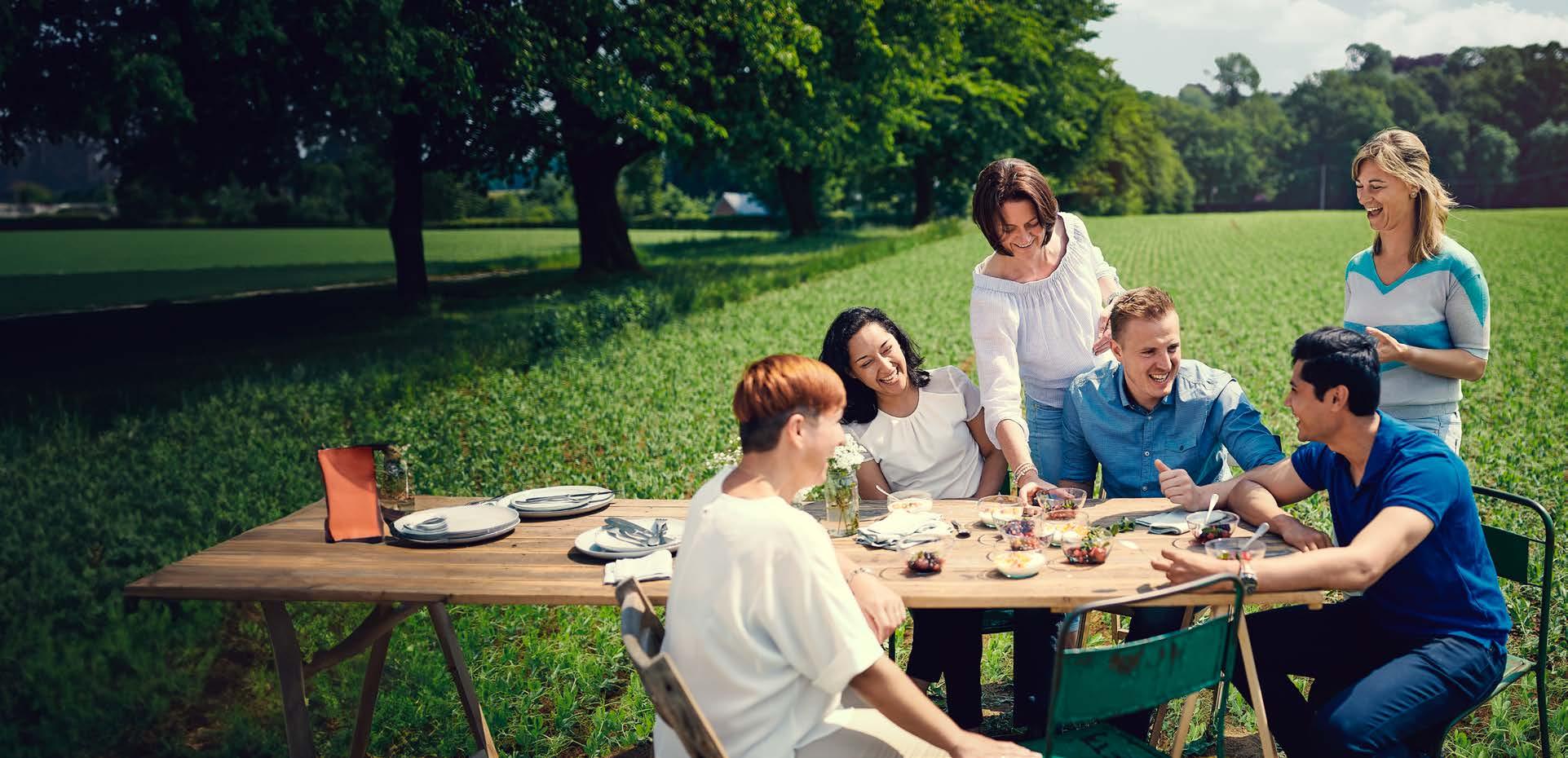
At Ardo, our commitment to sustainability extends to the heart of our organisation – our employees. As a family business, we strive to ensure our people thrive in their work environment. Hence, we prioritise their well-being and professional development by offering comprehensive support on multiple levels. Respecting each individual, we are dedicated to ensuring that every employee can work in a safe environment.
We
are Ardo The path to a more sustainable food system
Food
safety, quality and innovation
Respect for our employees Relationship with our stakeholders Good governance
65
Minimal
environmental impact Agronomy MIMOSA+
1. Taking care of our people
To ensure our employees' health and wellbeing, we support them on multiple levels and provide them with opportunities for self-development, empowering them to collectively achieve our shared goals.
Total number of employees
Absenteeism
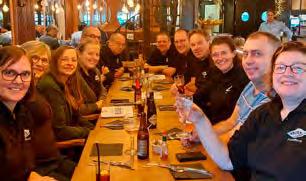
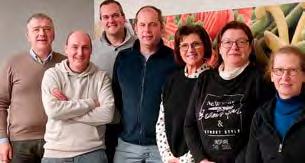
3,311
7.33%
We Are Ardo
The “We Are Ardo” initiative offers employees easy ways to connect with colleagues from different departments, aiming to cultivate a positive work environment that contributes to the company's overall success.
The initiative consists of five working groups, each with a specific focus: “Friends@Ardo” for social gatherings, “Fit@Ardo” for sports activities, “Green@Ardo” for environmental initiatives, “Talent@Ardo” for external employer branding and “Proud@Ardo” to showcase employee pride. What sets “We Are Ardo” apart is that it was established by employees, for employees. Work should be more than just a job – it's an opportunity to meet new people and engage in extracurricular activities that boost energy levels.
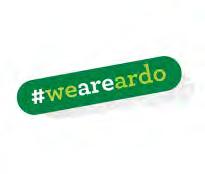
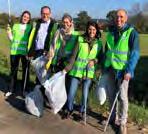
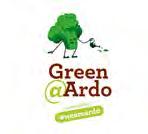

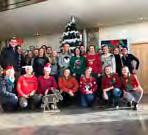
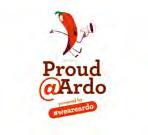
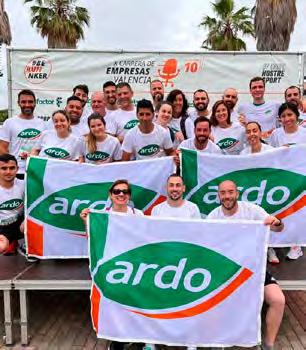
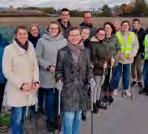
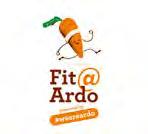
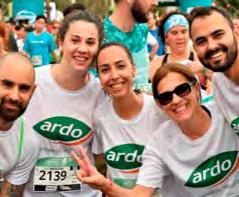


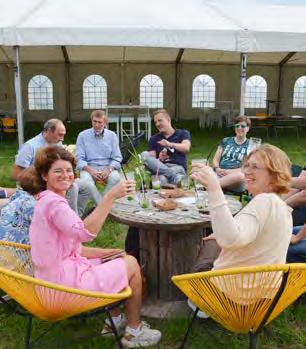
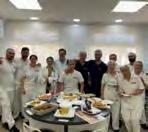

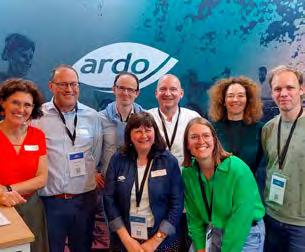
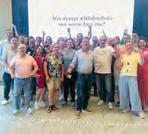
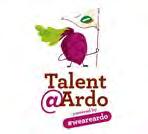
We are Ardo The path to a more sustainable food system
Food safety, quality and innovation
Our employees Relationship with our stakeholders Good governance
66
Minimal environmental impact Agronomy MIMOSA+
Respect for our employees
Case
Fitness
In Benimodo, Spain, we initiated the “Ardo a Punto” programme to improve the physical fitness of our employees. The programme integrates exercise as a fundamental aspect of a healthy lifestyle. A sound mind in a healthy body.
Stress, vitality and resilience
In 2023, all employees working in our headquarters were invited to participate in a workshop on stress, vitality and resilience. The event began with a keynote session, attracting over 180 participants. To delve deeper into these topics, subsequent workshops were made available, emphasising time and stress management skills.
Mental and physical health
In Zundert, the Netherlands, we successfully offered a lifestyle coaching programme to promote a healthy lifestyle among our employees. The programme consisted of four workshops combined with individual coaching, addressing mental and physical health issues and setting individual goals.
Empowering our employees
To cultivate a culture of continuous improvement at our site in Benimodo, Spain, we actively acknowledge and reward outstanding ideas put forth by our dedicated employees. Those whose ideas get selected are given the opportunity to spend a day in the field with our agronomists.
In Badajoz, Spain, employees have the opportunity to nominate a colleague for the “employee of the month” award. They need to provide a reason for the nomination and a benefit connected to Ardo's Values. Each month, the Management team selects the winner. Out of the 12 “employees of the month”, the “employee of the year” is selected as overall winner.
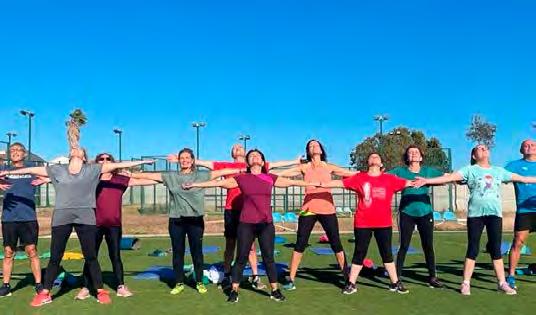
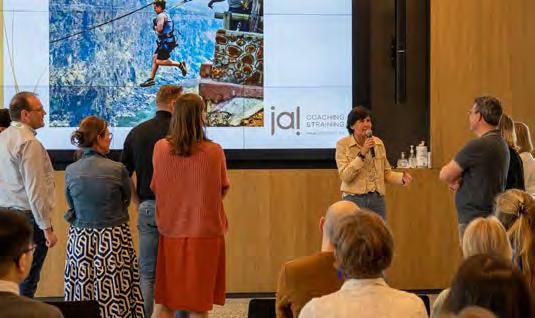
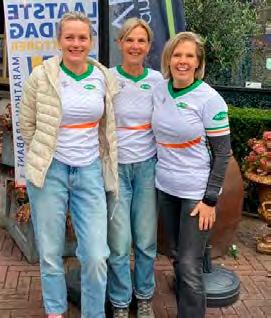
 We are Ardo The path to a more sustainable food system
Food safety, quality and innovation
Relationship with our stakeholders Good governance
We are Ardo The path to a more sustainable food system
Food safety, quality and innovation
Relationship with our stakeholders Good governance
67
Minimal environmental impact Agronomy MIMOSA+
Respect for our employees
"Ardo a Punto" : physical fitness for employees
Workshop on stress, vitality and resilience
Lifestyle coaching programme Employee of the month
2. Reflecting the diverse world in which we operate
Ardo serves millions of people worldwide every day and we are proud that our workforce mirrors the diverse world in which we operate. We welcome colleagues of all ages, genders, cultural backgrounds and religions.
Across the Ardo Group, we have 66 different nationalities represented among our 3,311 employees. In terms of gender, we are actively working to enhance diversity in our leadership and management teams. For this reason, we have launched our TIARA Leadership Programme, which brings together female managers from various sites and countries to enhance their personal leadership skills and strengthen their internal network. Currently, 45 women across our organisation are enrolled in the programme. Our plan is to continue expanding this initiative each year.
“One of my main motivators as an HR manager is assisting others in their journey towards improvement, supporting their success and celebrating their wins.”
Sally Heathfield Regional HR manager
UK and Denmark
“TIARA taught me to take care of myself and the person I want to be. What makes a good leader is his or her behaviour towards others, for example involving and listening, teaching, being a positive example…”
Giorgia Frigeri Key Account Manager Ardo Italy

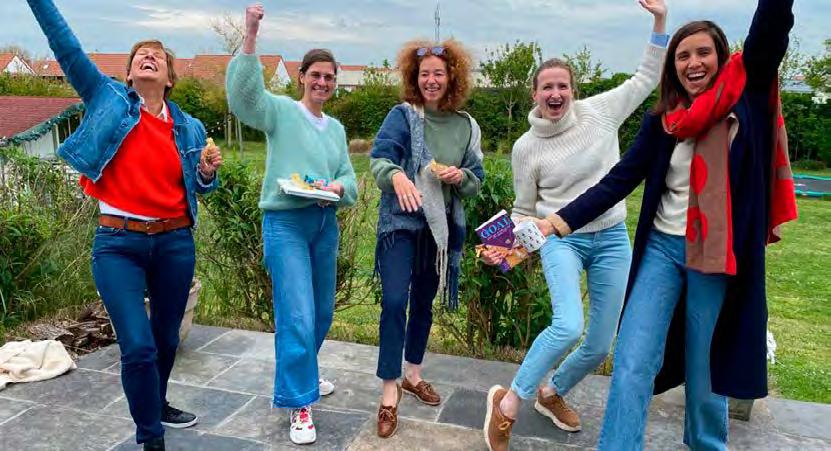
We are Ardo The path to a more sustainable food system Food safety, quality and innovation Relationship with our stakeholders Good governance Minimal environmental impact Agronomy MIMOSA+ 68
for our
Respect
employees 66 across all sites X 0%
Gender balance in organisation Female 32% Male 68%
Different nationalities
First group of female managers going through the TIARA programme followed by 45 employees at Ardo
3. Safe & healthy employees
The safety of our employees is our top priority. We aim to ensure that everyone works in a safe environment. To live up to this commitment, we focus on various areas to minimise the risk of accidents.
Ensuring a safe work environment heavily relies on people's behaviour. That is why we are launching an ambitious safety behaviour programme in collaboration with an external partner.
This partner organises “High Impact Weeks”, visiting all sites (so far, 11 of our sites have already had a High Impact Week). These visits involve on-site observations, workshops tailored to specific groups (e.g., departments, management) and group discussions focusing on observations, unsafe situations and strategies for improvement.
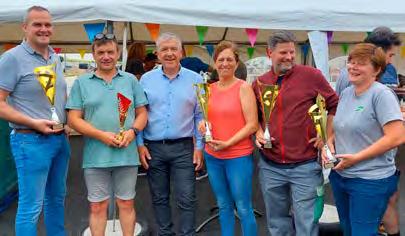
Based on these insights, a one to two year roadmap is developed, depending on the current safety conditions. The ultimate goal is for sites to reach a level similar to an independent model on the Safety Culture scale, where sites are capable of self-solving issues.
A select group of Ardo Safety Ambassadors follows intensive training and subsequently shares their knowledge with colleagues across various roles and positions, including both field and factory workers, permanent and temporary employees, as well as contractors. Following this train-thetrainer principle, our aim is to inspire everyone at Ardo to assist us in creating a better Safety Culture
In addition to the behavioural trainings, we continue to check the technical safety of our new and existing equipment. Where necessary, we will join forces with the machine manufacturersto rule out all safety hazards.
“Ensuring safety and fostering the appropriate safety culture require daily commitment. Raising awareness, promoting best practices, emphasising technical safety measures and performing on-site inspections, both in the field and at the factory, are key to reach ultimate goal of zero accidents throughout the entire production chain, from the field to the final product.”
Safety of our employees
We are Ardo The path to a more sustainable food system Food safety, quality and innovation Relationship with our stakeholders Good governance Minimal environmental impact Agronomy MIMOSA+ 69
Respect for our employees
.
20182019 2020 FY20/21FY21/22 FY22/23 Goal 2030 32.91 30.55 27.87 25.58 25.65 26.38 IFI 10 * Historically we collected this data on calendar year, but switched to financial year from FY20/21 onwards. ** Subcontractors are included since FY22/23. 184 Working accidents* IFI = #occupational accidents per million working hours 181 166 145 140 140**
Bert Camerlinck Group Project Engineer and part of Health & Safety core team
Some colleagues at Ardo Koolskamp and Ardo Kortemark (Belgium) received a Safety Award
Another way to strengthen our group-wide safety culture involves the proactive sharing of good safety practices. To improve communication among our sites and to provide better support to our local Health & Safety (H&S) managers, we decided to enhance our Group H&S practices. In line with this initiative, intercompany visits have been organised for H&S managers to facilitate the exchange of best practices. In spring 2023, we successfully reinstated the “Safety Days”. This program covered various topics. These included discussions on agriculture with a focus on new rules and technologies to enhance safety during planting and harvesting. Onboarding sessions emphasized the importance of comprehensive safety training for new employees, contractors and temporary workers. Additionally, safety sessions addressed major risks such as handling frozen products, internal traffic and the correct use of personal protective equipment for each specific task.
Ensuring the safety of workers in the field is now included in Ardo's safety programme, considering the heightened risks associated with the size and speed of the mechanised equipment involved. To address this, we have implemented various safety initiatives in recent years. These include the distribution of updated safety booklets, the organisation of regular safety meetings, the provision of high-visibility jackets and the
modification of machinery to enhance safety features.
Last year, we updated our safety procedures and an additional safety training session was introduced at the beginning of planting and harvesting activities. Notably, site H&S managers now conduct field inspections to collaboratively identify unsafe situations and devise effective solutions. These measures underscore our commitment to fostering a secure working environment in the field.
Through all these initiatives, our ultimate goal is to achieve zero accidents throughout the entire production chain. As a good example, our site in Kortemark, Belgium, has been accident-free for a year. Another Belgian site, Koolskamp, is organising the safety champions event, where local efforts in safety and other areas will be highlighted, rewarding the team with the best safety record with a trophy.
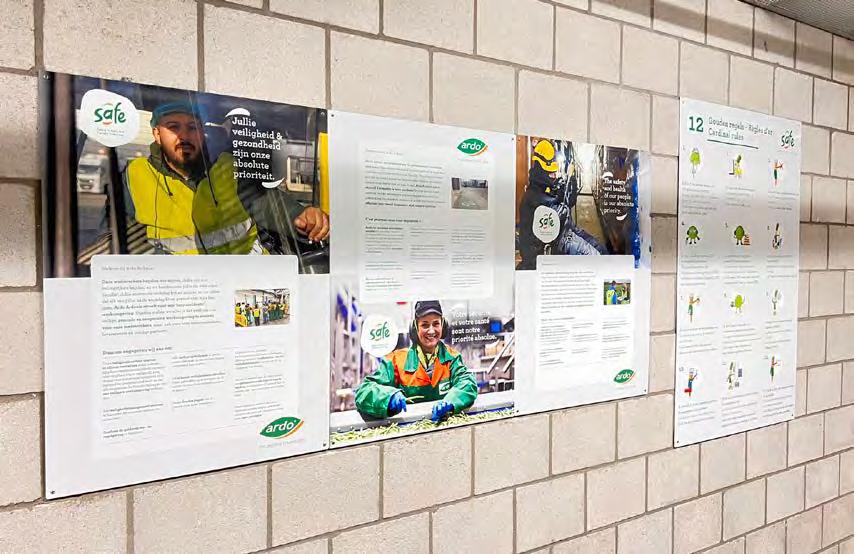
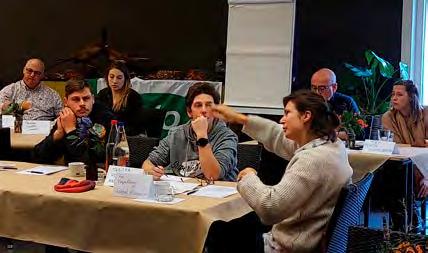
We are Ardo The path to a more sustainable food system
Food safety, quality and innovation
Relationship with our stakeholders Good governance
70
Minimal environmental impact Agronomy MIMOSA+
Respect for our employees
Safety Days at Ardo Koolskamp and Ardo Kortemark (Belgium)
Safety panels and cardinal rules in the corridors at Ardo Ardooie (Belgium)
4. Developing talent
As a dynamic family business, we strongly believe that our employees are the driving force behind our company. Their knowledge, skills and dedication contribute to the production and marketing of high-quality products worldwide. Therefore, we want to offer them every opportunity to learn and develop themselves. In addition to comprehensive onboarding programmes for new hires and specialised jobrelated training, we provide a wide range of training opportunities.
Ardo Leadership Programme
The Ardo Leadership Programme reflects our commitment to supporting our employees in their leadership development. The programme is structured into various segments, some of which are dedicated to personal leadership and open to all employees, while others are tailored to team leadership, specifically designed for those in managerial roles.
As we continue to develop the programme, our focus areas include:
- Team coaching with an emphasis on 'high performing teams', involving 238 participants, including group members and local management teams.
- Situational leadership, aimed at all managers, with 153 participants enrolled.
- Stress management, complementing our vitality programme, currently engaging 80 participants, with plans to further extend this aspect in FY23-24.
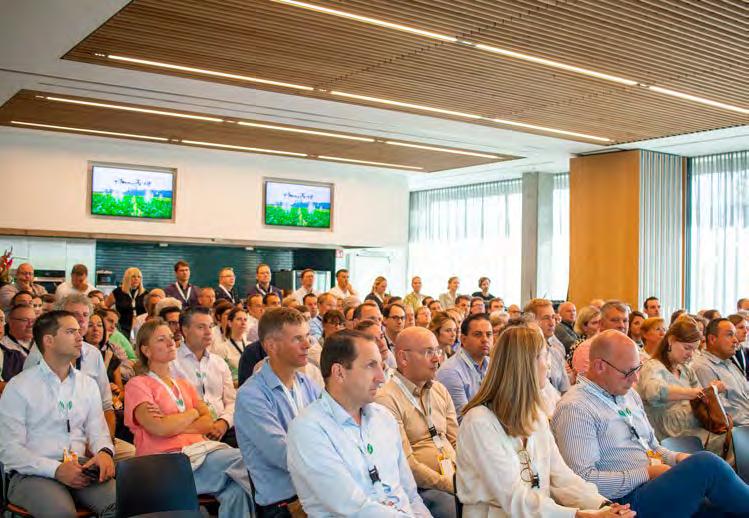
We are Ardo The path to a more sustainable food system Food safety, quality and innovation
Good governance Minimal environmental impact Agronomy MIMOSA+ 71
Relationship with our stakeholders
Respect for our employees
Global leadership programme at headquarters in Ardooie (Belgium)
5. Summary: How does Ardo make a difference?
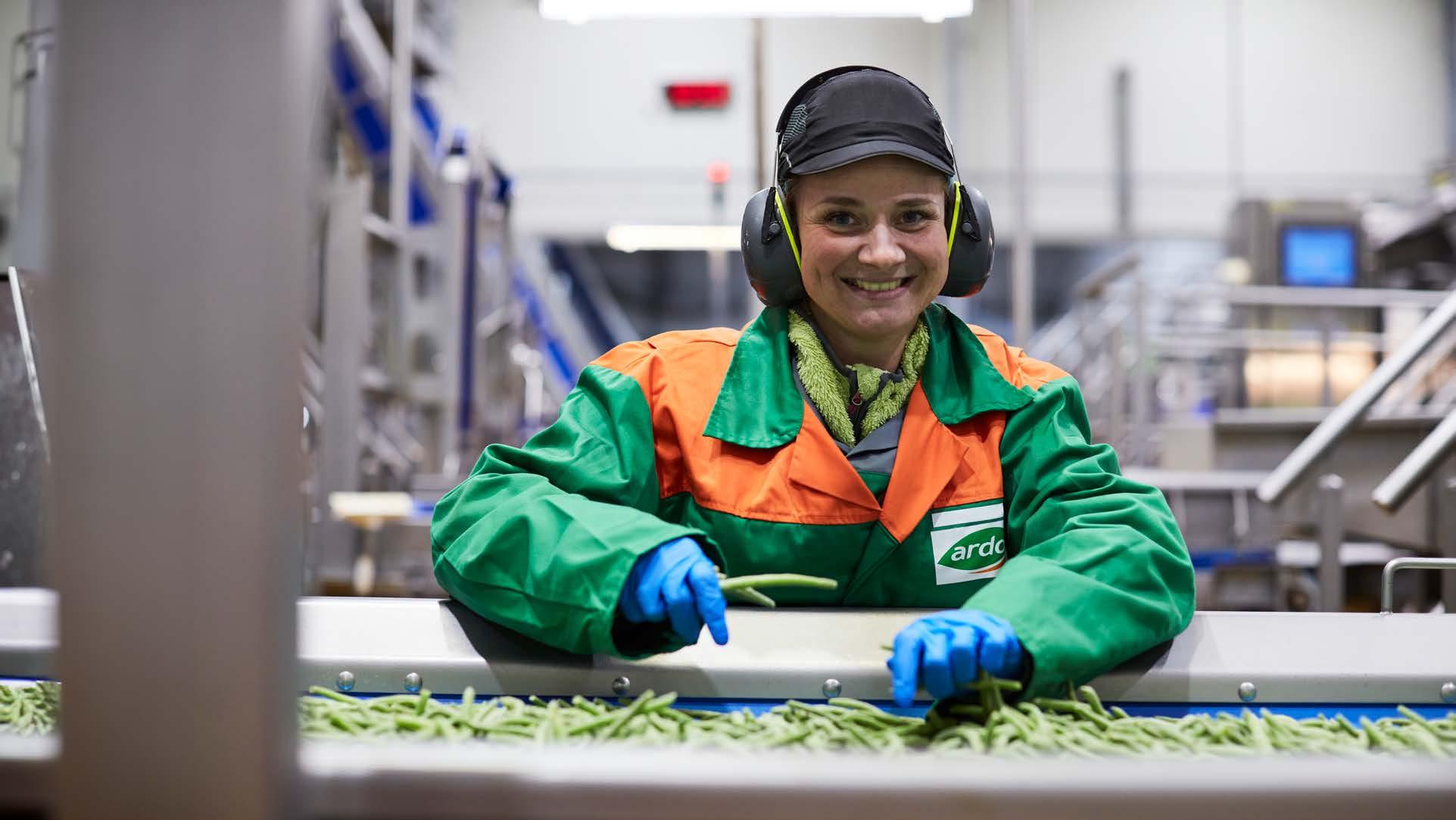
• Initiatives like the "We Are Ardo" programme, lifestyle coaching and workshops on stress and vitality showcase our dedication to employee well-being.
• We take pride in our diverse workforce, with employees from 66 different nationalities among our 3,311 team members. Additionally, we are committed to achieving gender balance throughout our organisation.
• Our ultimate goal is to achieve zero accidents throughout the entire production chain.
• We want to offer our employees every opportunity to learn and develop themselves. Our Ardo Leadership Programme focusses on personal and team leadership development.
are Ardo The path to a more sustainable food system Food safety, quality and innovation Relationship with our stakeholders Good governance Minimal environmental impact Agronomy MIMOSA+ 72 Respect for our employees
We
We are Ardo The path to a more sustainable food system
Minimal environmental impact Agronomy MIMOSA+
Food safety, quality and innovation
Respect for our employees
Relationship with our stakeholders Good governance
Key performance table
73
Target 20/21 21/22 22/23 Accident Frequency Reduce the risk of accidents: Injury Frequency Index (IFI) of maximum 10 by 2030 (IFI = #occupational accidents per million working hours)1 25.58 25.65 26.38 Accelerate progress Absenteeism Reduce absenteeism (hours absent / hours worked) by ensuring physical and mental wellbeing of Ardo employees: maximum 5% absenteeism by 2030 6.12% 7.51% 7.33% Accelerate progress Gender balance in the Ardo organisation Ensure gender balance (% of male/female/X employees) 68.35% / 31.65% / 0% 65% / 35% / 0% On track Gender balance in Leadership & Management Ensure gender balance (% of male/female/X managers) 68% / 32% / 0%67% / 33% / 0% On track Gender balance in the Executive Committee Ensure gender balance (% of male/female/X executives) 76.4% / 23.5% / 0%50% / 50% / 0% Target achieved Employee training Minimum 60,000 employee training hours by 2025 50,116 52,399 Accelerate progress All figures are excl. the production site in La Paz (Costa Rica) and Joint Ventures at 50% 1 Subcontractors are included since FY22/23
Eat tasty vegetables and fruits in the field.
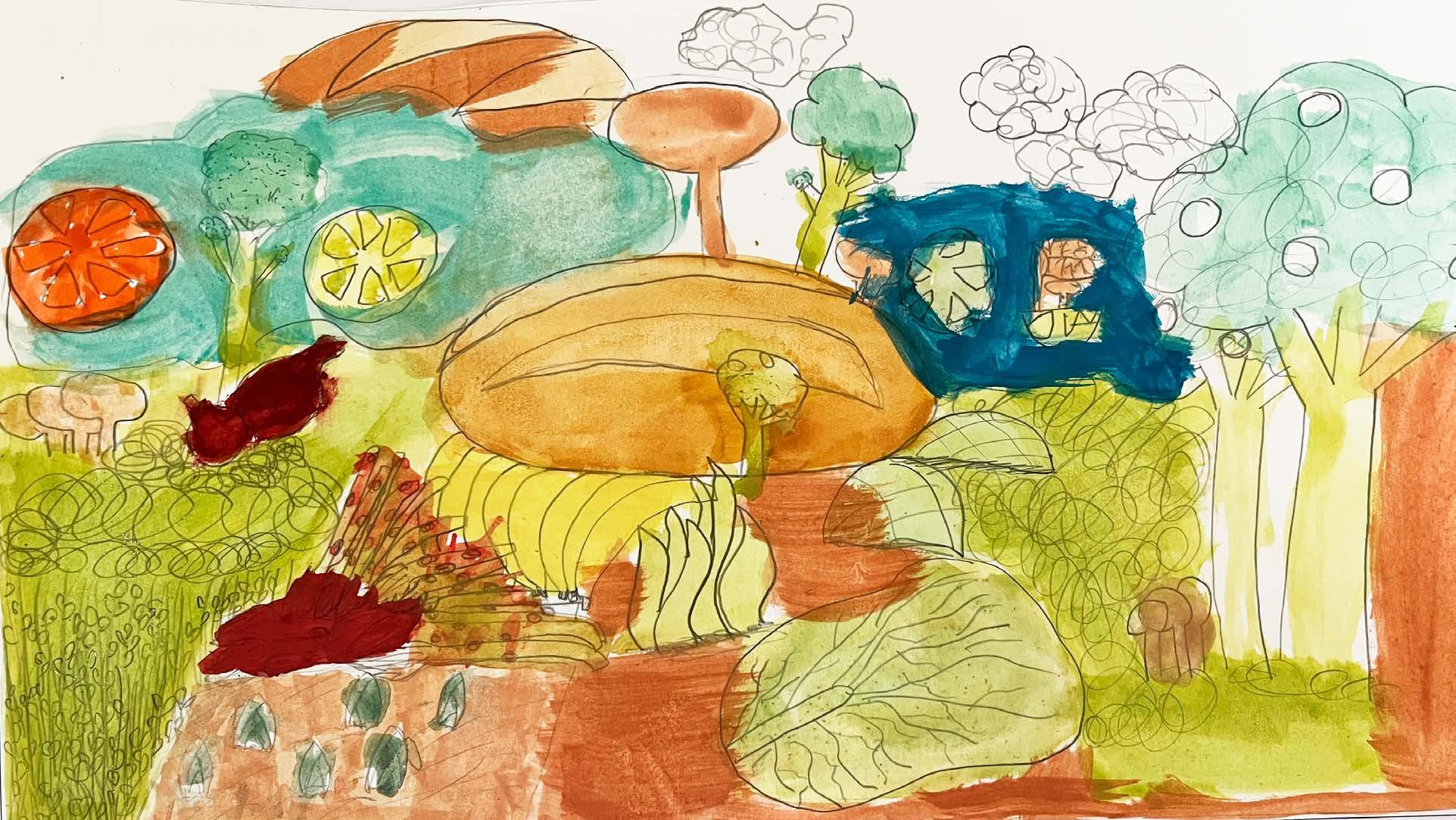
74
Elle, 9 years, Belgium
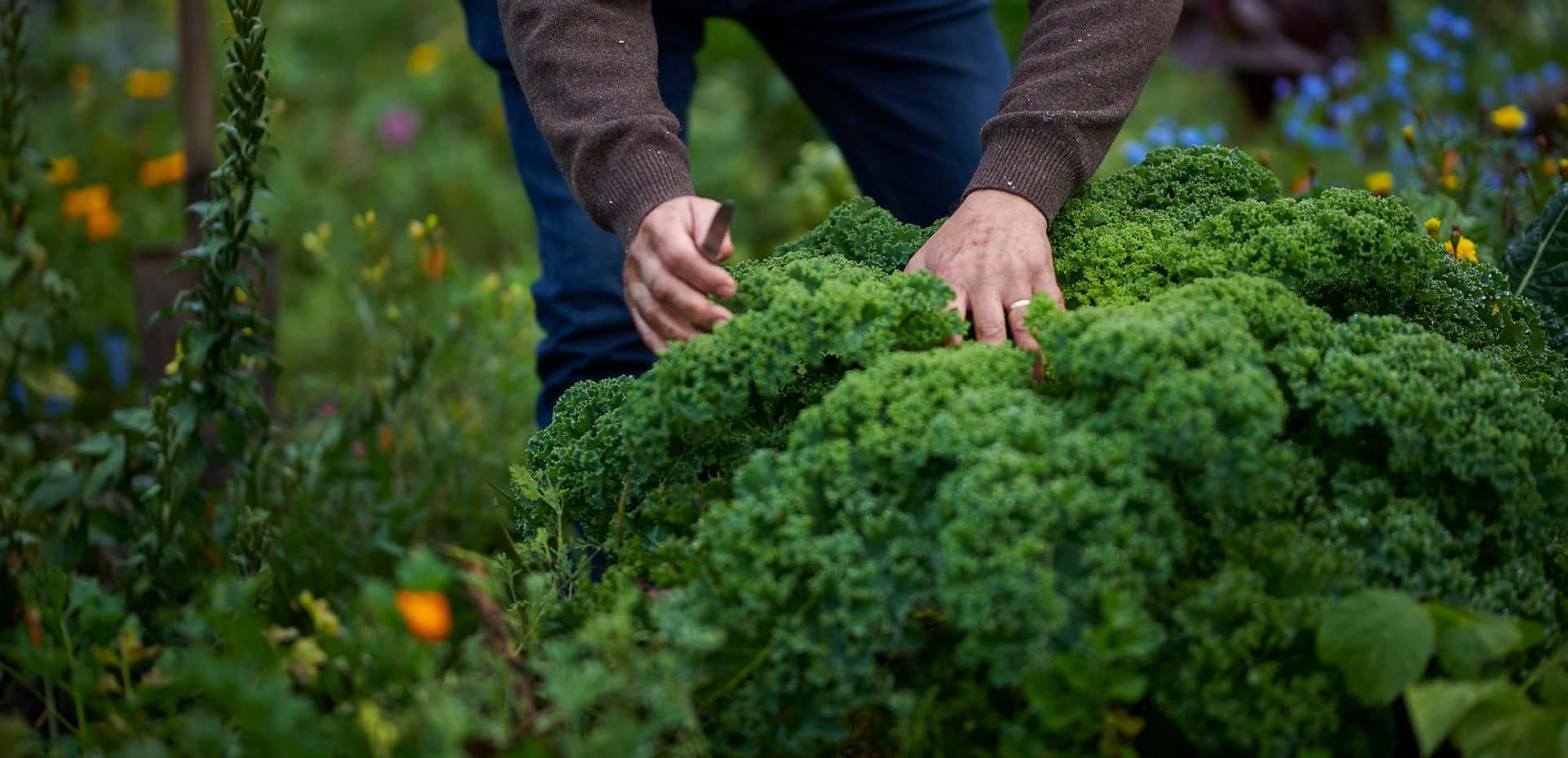
Our commitment to sustainability is deeply rooted in our DNA, fundamentally shaping how we collaborate with both local and global partners. Looking ahead to 2030, our mission is to further support our customers in their sustainability journey, to ensure responsible sourcing practices with our external suppliers across the globe, to support farmers in their transition to MIMOSA+ practices and to contribute to the well-being of the communities surrounding us.
We are Ardo The path to a more sustainable food system
Food safety, quality and innovation
Respect for our employees Relationship with our stakeholders Good governance
75
Minimal environmental impact Agronomy MIMOSA+
1. Adhering to sustainable farming
Managing the sustainable cultivation of 100 different crops across twelve distinct areas is quite complex. To tackle this challenge, we have decided to use the Farm Sustainability Assessment (FSA) from the Sustainable Agriculture Initiative Platform (SAI Platform) to thoroughly assess our own farmers. We also use GlobalG.A.P. (Good Agricultural Practices) to evaluate most external suppliers from which we buy frozen products. These frameworks help us understand local issues and find the appropriate solutions.
The Farm Sustainability Assessment (FSA) mainly focuses on enhancing environmental and social sustainability in agriculture. After four years of working with FSA, 100% of our farmers achieved the FSA gold or silver status. Our goal is to maintain and improve these verification levels and eventually certify regenerative agriculture practices.
SAI Platform’s newly launched Regenerating Together Programme responds to the need for a coordinated approach in agriculture to introduce a global definition and approach to regenerative agriculture. We will support this programme when it will be launched in 2024 through our MIMOSA+ programme.

To assess sustainable farming practices of our externally purchased frozen products, we work with GlobalG.A.P. which focuses on ensuring product safety and quality while endorsing responsible and sustainable agricultural practices. We have initially focused on fruit production. This is because it mainly occurs in static orchards. We will extend the scope in the coming year by ensuring compliance to either FSA or GlobalG.A.P. for all externally purchased vegetables, fruit and herbs.
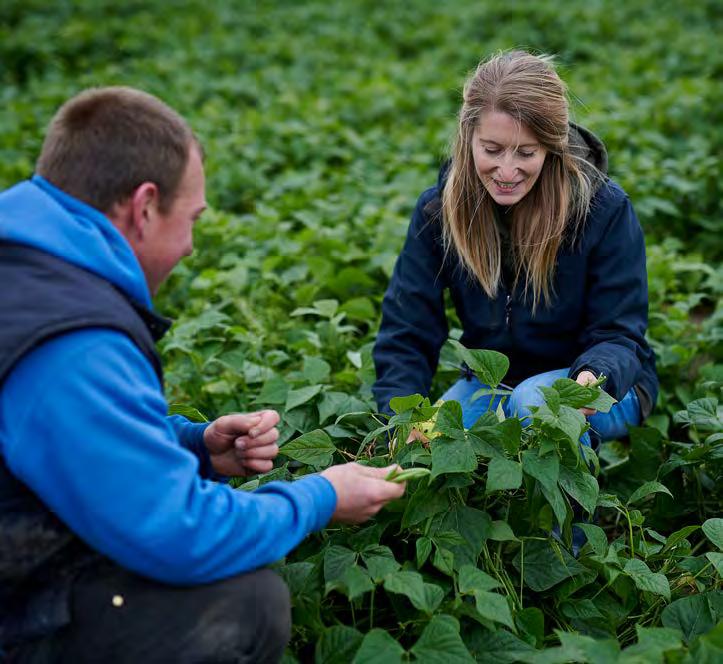
Supporting farmer Producer Organisations
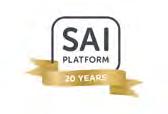

We value a close relationship with our farmers, as they play a crucial role in the quality of our vegetables, fruit and herbs. To strengthen our commitment, we have been actively setting up and supporting farmerproducer organisations in our different growing regions for many years and we do so by co-investing in mechanisation, technology and research.
We are Ardo The path to a more sustainable food system Food safety, quality and innovation Respect for our employees Relationship with our stakeholders Good governance Minimal environmental impact Agronomy MIMOSA+ 76
2. Sourcing responsibly
Sourcing responsibly is a collective commitment. That is why we establish trust-based relationships with our supplier partners. By working closely together, we believe we can achieve mutual success and contribute to a healthy environment and the well-being of communities.
To reinforce our commitment to responsible sourcing, we select our supplier partners carefully. We ask our suppliers to undertake ethical audits through the Sedex platform (Supplier Ethical Data Exchange). This ensures that ethical risks throughout the supply chain are addressed and assessed, particularly for food suppliers in high-risk countries. Currently, 74% of our suppliers located in high-risk countries have undergone SMETA (Sedex Members Ethical Trade Audit) audits, with 56.5% of our suppliers worldwide having also completed the SMETA audit process. This ethical assessment evaluates four pillars: Labour, Health and Safety, Environment and Business Ethics.
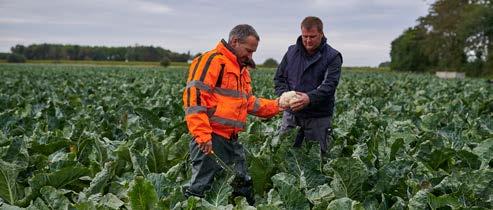
Sustainable use of palm oil
In addition, all of our suppliers must adhere to the principles outlined in our Supplier Code of Conduct (read more about our Supplier Code of Conduct in Chapter Good governance). To monitor the sustainable performance of our supplier partners, we perform spot checks during supplier visits and or on-site audits to assess production, company policy and working conditions.
When grown sustainably, palm oil can be a force for good as palm oil has a higher yield per hectare than any other vegetable oil. Sustainable palm oil helps protect the environment, wildlife and people who live and work in oil palm producing countries. For this reason, Ardo has been a member of the Roundtable on Sustainable Palm Oil (RSPO) since 2016. We exclusively source segregated palm oil that comes from certified sources. This is how we take the necessary measures to minimise the environmental and social risks associated with palm oil cultivation and production.
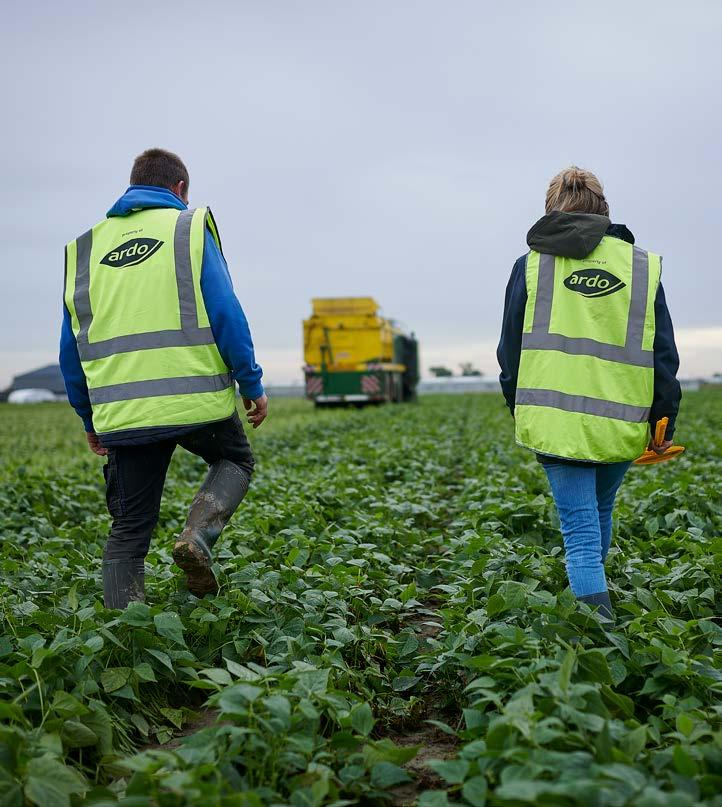
We are Ardo The path to a more sustainable food system Food safety, quality and innovation Respect for our employees Good governance Minimal environmental impact Agronomy MIMOSA+ 77
Relationship with our stakeholders
We
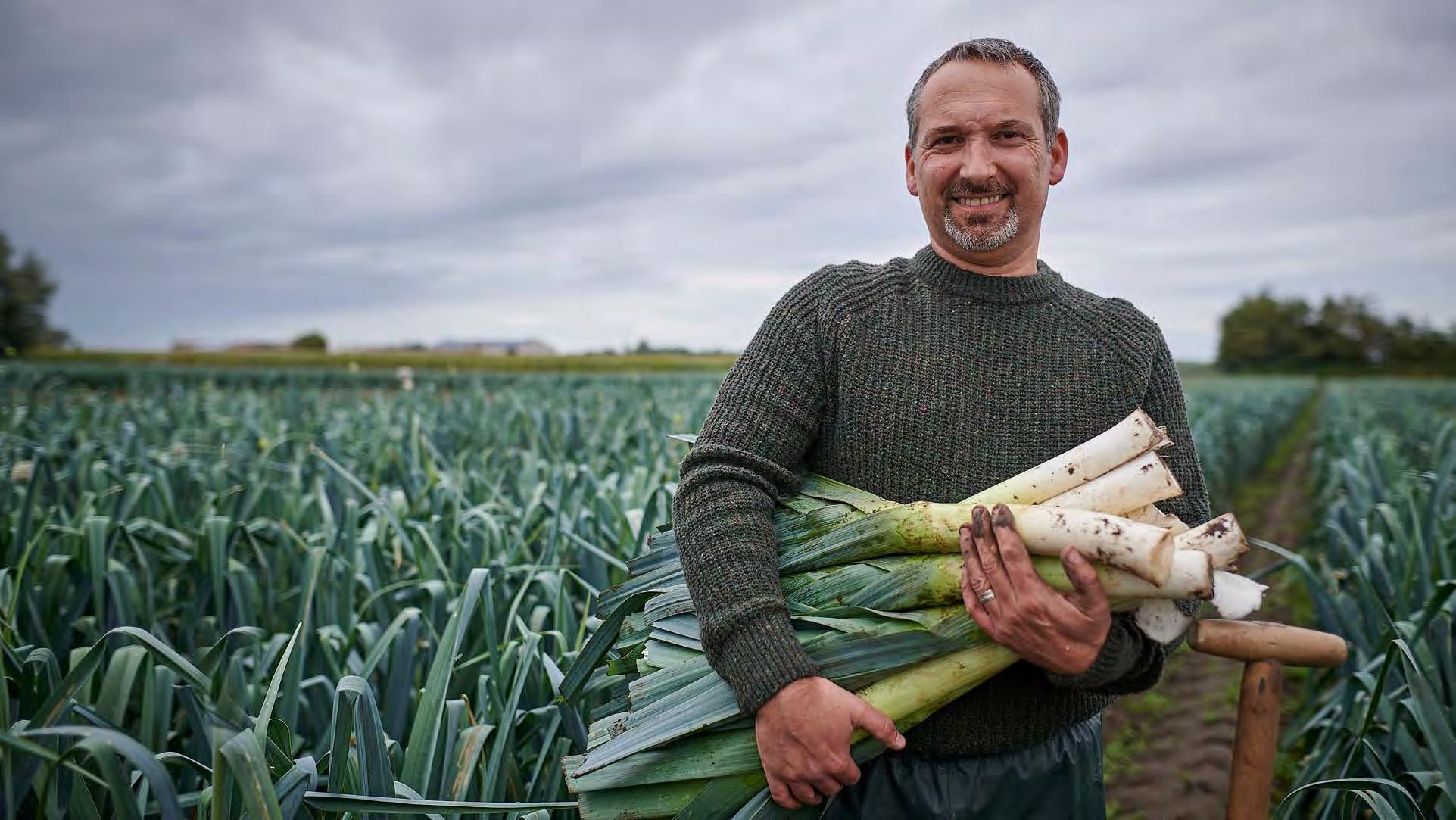
Relationship
3. Community engagement
We actively engage in initiatives aimed at enhancing the lives of our employees, growers and the broader community. Our focus is on creating a positive impact, not only through our business operations but also by contributing to the social fabric of the areas surrounding our facilities.
We will continue to develop sustainable relationships with various stakeholders.
We will further establish lasting connections with our customers and support them in their sustainability efforts by offering sustainably produced products.
One of our top priorities is to ensure that our external suppliers align their practices with our environmental and social standards.
We will continue to provide farmers with training and resources to facilitate the implementation of MIMOSA+ practices.
We are dedicated to giving back to our communities, including donating food to food banks and other NGOs.
Relationship with our stakeholders
with our stakeholders
78
are
The
to a more sustainable food system Food safety, quality and innovation Respect for our employees Good governance
environmental impact Agronomy MIMOSA+
Ardo
path
Minimal
We
Contributing to the local communities in Brittany, France
Relationship
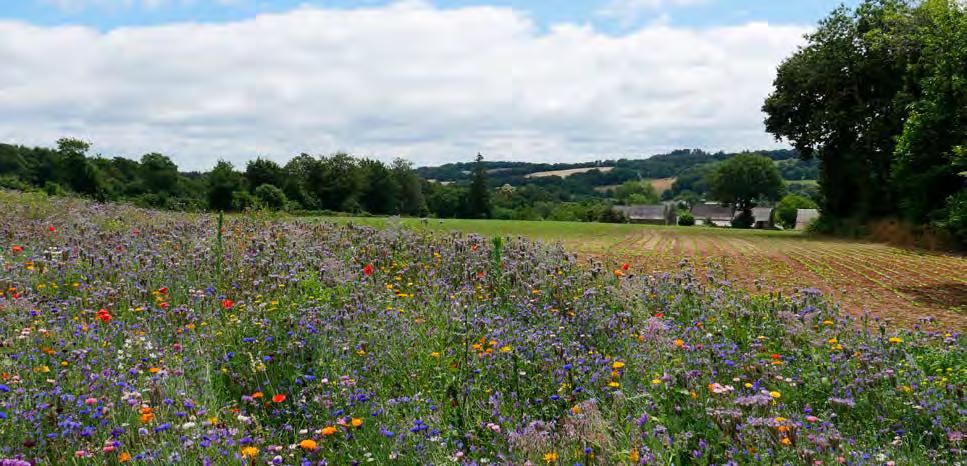
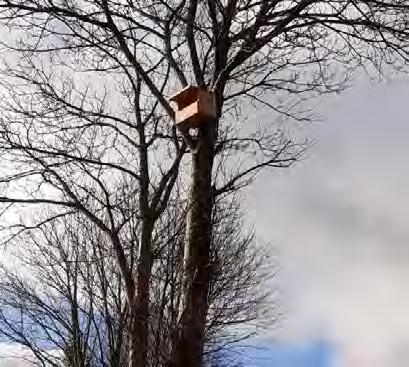
We installed 130 nesting boxes
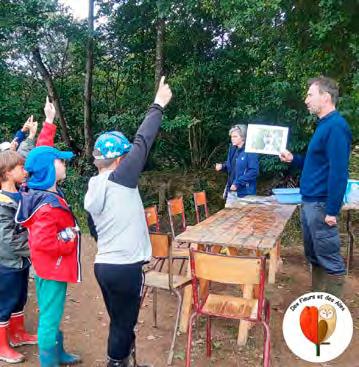
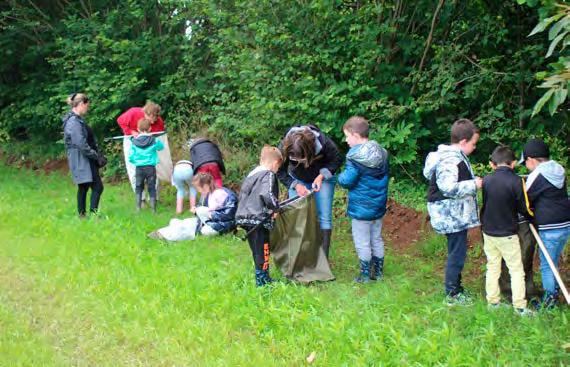
Food safety, quality and innovation Respect for our employees Relationship with our stakeholders Good governance Minimal environmental impact Agronomy MIMOSA+ 79
are Ardo The path to a more sustainable food system
Ardo is actively involved in the communities surrounding its sites. For instance, in Gourin, France, we have installed 130 nesting boxes for birds of prey and several hundred hectares of flower strips in the fields of growers who supply the site. In addition, we organised a special event for local school students, providing them with insight into how vegetables grow, how plants function and for the children to taste our frozen products. with our stakeholders
Acitivity for local schools, providing the children with insight into how vegetables grow, how plants function, etc.
Case
Flower strips were planted in the local suppliers' fields.
Promoting economic growth and development as member of the Steering Group of the Global Alliance for Trade Facilitation
The Global Alliance for Trade Facilitation (GATF) was established in 2017 to help governments in developing countries implement the World Trade Organisation’s Trade Facilitation Agreement. Supported by funding from the United States, Canada and Germany, the Alliance employs a public-private partnership model to leverage trade facilitation for fostering economic growth and development.
As a member of the Steering Group, Mark FeDuke, ArdoVLM's Director of Risk Management and Regulatory Affairs, works together with representatives from donor governments and private sector Steering Group members to provide strategic direction, approve projects and authorize budgets. The Alliance’s projects range from empowering women in developing countries to participate in international trade, to simplifying cross-
border procedures to speed up the delivery of life-saving vaccines, as well as streamlining agri-food export procedures in Tunisia and Madagascar. Additionally, the Alliance also collaborated with Colombia’s national food safety authority (INVIMA) to establish a risk management system that reduced food and beverage import inspections by 30%, minimising delays and saving costs. More recently, Mark supported a project in Peru that simplified import-export procedures benefiting the Peruvian processed food sector.


“Contrary to typical international development efforts, the Alliance employs a public-private partnership model with the goal of simplifying international trade, making it more efficient and cost-effective. By lowering costs, we enhance competitiveness, stimulate economic growth, generate employment and, in the end, reduce poverty. Admittedly, our work at the Alliance involves detailed efforts, but that’s how we contribute to achieving the UN Sustainable Development Goals.”
Mark FeDuke Director of Risk Management and Regulatory Affairs at ArdoVLM
We are Ardo The path to a more sustainable food system Food safety, quality and innovation Respect for our employees Good governance
environmental impact Agronomy MIMOSA+ 80
Minimal
Case
Relationship with our stakeholders
We
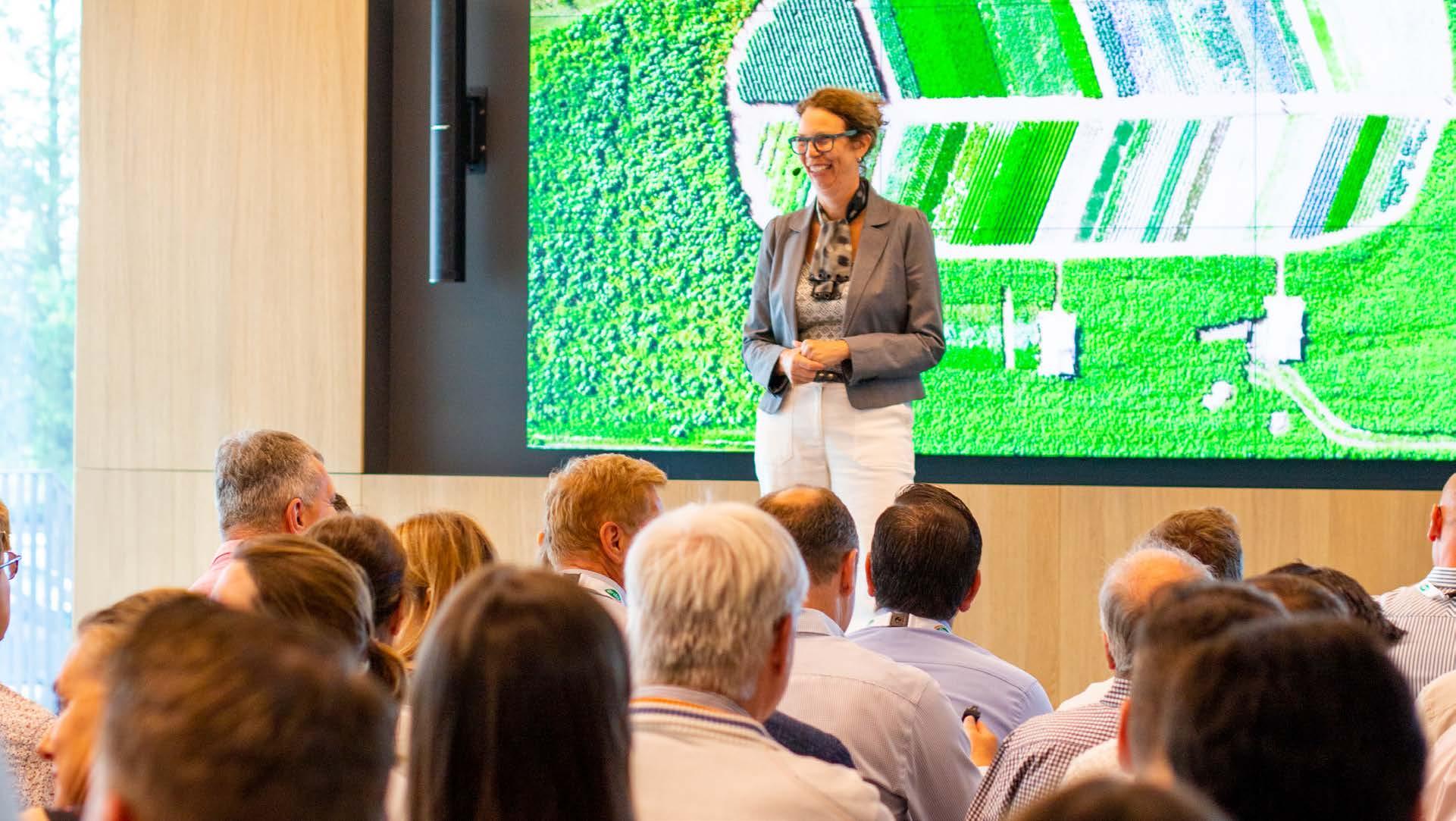
4. Summary: how does Ardo make a difference?
We aim to build enduring relationships with all stakeholders within the Ardo ecosystem and by extension in the world in which we operate:
• We aim to establish sustainable agricultural practices among our global network of growers and external suppliers.
• By cultivating trust-based relationships with our supplier partners, we are dedicated to upholding responsible sourcing standards.
• We aspire to actively engage with communities around t he world, sharing our knowledge, donating food, and supporting economic growth and development projects.
are Ardo The path to a more sustainable food system
Food
safety, quality and innovation
Respect for our employees Relationship with our stakeholders
MIMOSA+ 81
Minimal
environmental impact Agronomy
Relationship with our stakeholders
Good governance
We are Ardo The path to a more sustainable food system
Minimal environmental impact
Agronomy MIMOSA+
Food safety, quality and innovation
Respect for our employees
Relationship with our stakeholders
Key performance table
farming
Responsible sourcing - social compliance 100% of frozen food suppliers are SMETA3 audited in high risk countries by 2025
All figures are excl. the production site in La Paz (Costa Rica) and Joint Ventures at 50%
1 GLOBALG.A.P = GLOBAL Good Agricultural Practices
2 FSA = Farm Sustainability Assessment
3 SMETA= Sedex Members Ethical Trade Audit
Good governance
74% SMETA audited in high risk countries, 56.5% worldwide On track
82
Target 20/2121/22 22/23
80% of externally
certified
75%
64% for FRUIT 71.3%
Accelerate
Responsible sourcing - sustainable
Minimum
sourced fruit is GLOBALG.A.P1 and/or FSA2
by 2025,
of all externally sourced products by 2030
for FRUIT
progress
Food donations Supporting Ardo communities by donating food (kg) to foodbanks and NGO’s 153,591 157,555 79,381 Accelerate progress
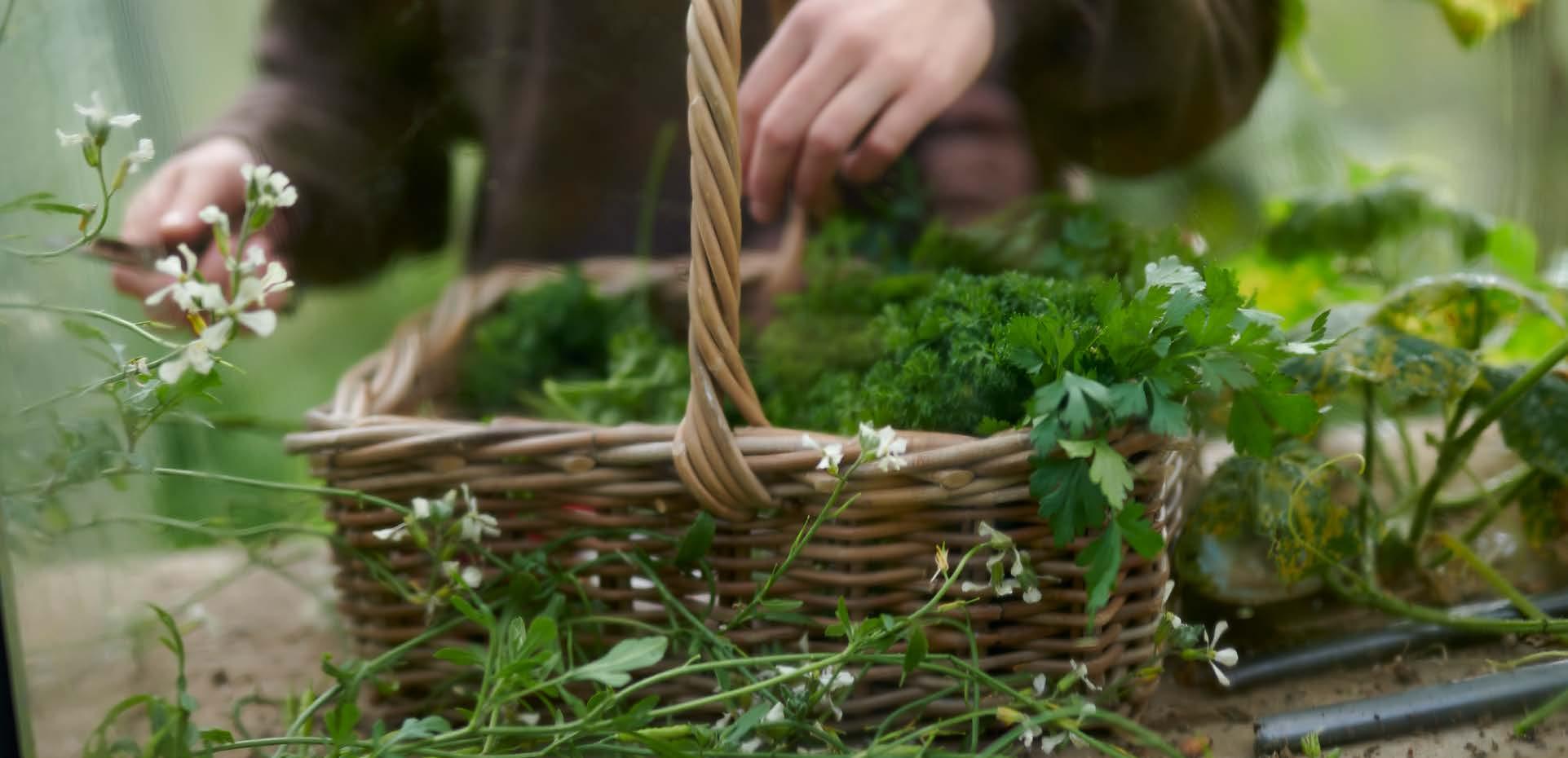
In the ever-evolving landscape of our family business, we have always applied sound corporate governance. We conduct our business with transparency, fair remuneration, respect for human rights, and environmental responsibility, encapsulating a commitment to ethical business behaviour. We have embedded this business approach in our governance framework, based on the guiding principles of the Belgian Code of Corporate Governance for non-listed companies, to formalise our long-term commitment to sustainability and ethical conduct.
83
We are Ardo The path to a more sustainable food system
Food safety, quality and innovation Respect for our employees
Relationship with our stakeholders Good governance
Minimal environmental impact Agronomy MIMOSA+
1. Principles of Good governance
2. Legal structure
The Ardo family business has evolved significantly over the last six decades. Following the merger of the two family-branches by the second generation in 2014, the family has consistently worked towards establishing a professional governance structure and preparing for the transition to the third generation.
In 2021, we appointed our first external Chairman of the Board, Mr. Jules Noten. In addition, an external Dutch CEO, Mrs. Gabrielle Kalkwijk, has been leading the management team since October 2019. The team consists of experienced professionals, including several members of the family’s third generation.
Our corporate governance is based on various principles outlined in the 2020 Belgian Code of Corporate Governance for non-listed companies, including the following best practices:
- We adopt a clear governance structure
- Our Board of Directors works efficiently and makes decisions in the best interest of our company
- We use a strict and transparent procedure for appointing Board members and evaluating their contributions, commitment and integrity
- We establish a specialised audit committee, as well as a nomination and remuneration committee, both chaired by an independent member of the Board
- We define a clear executive management structure
- We remunerate our directors and executive managers fairly and responsibly
- We treat all shareholders equally and respect their rights
- We ensure adequate disclosure of our corporate governance, with sufficient attention to transparency and public reporting
- Our codes of conduct, policies and other charters guarantee the commitment of all our associates, directors, suppliers, customers, and other business partners to ethical behaviour
Digrom Immo NV (BE)
100% daughter companies
Real estate in support of Ardo Foods NV
100% daughter companies
Production
Riward NV (BE)
Ardo Foods NV (BE)
100% daughter companies
Sales
50% / 50% Joint Ventures
Sales & production
Ardo Energy NV (BE)
Majority participation
Sales & production
Joint Venture in green energy Projects in support of Ardo Foods NV
Local sales branches
We are Ardo The path to a more sustainable food system Food safety, quality and innovation Respect for our employees Relationship with our stakeholders Minimal environmental impact Agronomy MIMOSA+ 84 Good governance
3. Board of Directors
A team with long standing experience
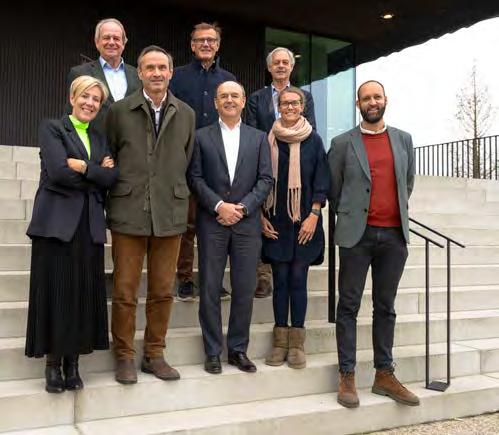
The Board of Directors is our highest decision-making body. It oversees the CEO and the Management on behalf of the shareholders.
To ensure a balanced composition of the Board of Directors, we pursue a mix of people with diverse skill sets, backgrounds, knowledge, experience, and age.
The Board consists of 9 directors:
- 4 independent directors from different industries
- 5 representatives of the shareholders
In 2021, Ardo appointed its first external Chairman of the Board, Mr. Jules Noten. He ensures the efficient preparation, deliberation and decision-making of the Board, fostering an atmosphere of trust that promotes open discussions and constructive criticism. This approach enhances support for the decisions made by the Board.
The primary goal of the Board of Directors is to preserve and continue the development of the company by creating long-term value. The main responsibilities of the Board include:
- Providing strategic direction
- Appointing and evaluating the group's top management (CEO & Executive Committee)
- Monitoring performance and risks
- Communicating the group values
- Evaluating and improving the organisation
All members of the Board of Directors think and govern in the interest of the company, regardless of whether their background is familial, shareholder or external.
We are Ardo The path to a more sustainable food system Food safety, quality and innovation Respect for our employees Relationship with our stakeholders Minimal environmental impact Agronomy MIMOSA+ 85
Good governance
From left to right, starting above:
Jules Noten, Jan Haspeslagh, Marc Haspeslagh, Conny Vandendriessche, Bernard Haspeslagh, Jan Vander Stichele, Liesbeth Haspeslagh (future board member) and Michel Haspeslagh. Ignace Haspeslagh and Stefaan Decraene are missing on the picture.
Independent directors
Jules Noten Chairman of the Board since 2021
Board member since 2020
Until 2020, Jules served as the CEO of Vandemoortele. Prior to that role, he held the position of CEO at Balta and at Massive. Previously, he had an 18-year career at Unilever. Based on his experiences at Unilever and at Vandemoortele, Jules is well-acquainted with the challenges of producing and selling frozen products. He has a strong track record of clarifying strategic focus and improving performance. Jules is deeply committed to sustainability and is passionate about food product innovation. Jules is also a member of the Board of Sioen, LRM, Bpost and Serax.
Jan Vander Stichele Board member since 2021
Jan is the family chairman and director of Lotus Bakeries. Before, he had a career as the Technical Director of Verlipack, General Manager of Lotus France and General Manager of Operations at Lotus Group. He also holds directorship positions at Beaulieu international Holding, Frigilunch, Connect+ and the Onze-Lieve-Vrouw Hospital in Aalst. Jan also serves as the Chairman of Flanders FOOD, Team Industries and Fost Plus.
Conny Vandendriessche Board member since 2021
Conny is a serial entrepreneur. She started her career in 1995 as co-founder and co-CEO of Accent Jobs, which merged into The House of HR in 2012, where she currently serves as an active shareholder and director. In 2014, she established ‘Stella P’, which focuses on promoting diversity in boards of directors.
In 2019, she founded ‘We are Jane’, a private equity fund dedicated to supporting female entrepreneurs.
Conny is also board member at Allia, Van Marcke and PIA Group.
Stefaan Decraene Board member since 2016
Stefaan has over 30 years’ international banking experience, at both an operational and a managerial level. He is the Chair of the Managing Board of Rabobank and is part of the Executive Committee of the World Business council for Sustainable Development. In his previous roles, he was CEO of DexiaBank Belgium and the member of the Dexia Group Executive Committee with responsibility for retail and commercial banking. For the past ten years, Stefaan served as a member of the Executive Committee of BNP Paribas, where he was responsible for international retail and commercial banking.
Representatives of the shareholders
Jan Haspeslagh Second generation family member
Jan is the former Chief Executive Officer of Ardo. He spent his whole career developing Ardo and establishing the commercial strategy for the company.
Bernard Haspeslagh Second generation family member
Bernard was the Chief Operations Officer of Ardo until June 2023. He has a longstanding experience in operations and agronomy. He is at the foundation of Ardo’s sustainable agriculture and production programmes.
Ignace Haspeslagh Second generation family member
Ignace is an agricultural engineer and has extensive experience working at Ardo. He was responsible for procurement for many years and during his last years at Ardo he was responsible for developing new markets for Ardo.
Marc Haspeslagh Second generation family member
Marc is a medical doctor specialised in dermapathology. He founded in 2011 Dermpat, a laboratorium for dermapathology in Ghent. He is also a researcher at Ghent University.
Michel Haspeslagh Third generation family member and board member since 2022
After a few years of experience at ING, Michel helped to develop the herb business at Ardo and was the Business Unit Director for Herbs & Ingredients from 2018 until 2022. After 2022, he decided to pursue his career outside of Ardo and started his own art Gallery 'Yet but no'. He is also board advisor for Buro Project and Wewantmore.
We are Ardo The path to a more sustainable food system Food safety, quality and innovation Respect for our employees Relationship with our stakeholders Minimal environmental impact Agronomy MIMOSA+ 86
Good governance
4. Advisory committees
True to the principles of good corporate governance, we have instated two advisory committees that support the Board of Directors in monitoring and evaluating financial and nonfinancial risks, as well as the nomination and remuneration of the management team.
Audit Committee
The Audit Committee assists and advises the Board and monitors:
- The internal control and risk management systems
- The soundness and reliability of financial reporting
- Compliance with the statutory provisions and regulations, internal procedures and corporate business principles
- The appointment, performance and independence of Ardo’s external auditors and the performance of any internal audit operations.
In order to perform its task, the audit committee may request information from any director, manager or employee. The board and management will urge these people to cooperate.
Supported by management, the Audit Committee also assesses nonfinancial risks and evaluates the ‘double materiality’ impact for our company, taking into account the company’s business plan as well as its influence on society and the environment.
Given the growing emphasis on climate in both business and society, Sustainability Risk Management (SRM) is gaining significance. At Ardo, we use SRM to maintain the proper balance between our corporate sustainable growth goals, the preservation of nature’s gifts and the environment. SRM ensures alignment between our business strategy and sustainability strategy.
The Audit Committee will monitor the reduction and avoidance of any negative environmental impact of our activities. For example, by reducing the use of natural resources, cutting carbon emissions and carefully controlling the use of plant protection products. The Audit Committee’s evaluation demonstrates a close alignment between our sustainability objectives and profit targets and endorses the sustainability goals that we are working towards.
In November 2022, we successfully concluded our first sustainability-linked loan (SLL), with the main objective of harmonising and simplifying the company’s debt structure and making the company’s financing future proof. This deal fits well with our Horizon 2025 strategy, which is based on a valuedriven approach, focusing on sustainable growth and improving profitability. Based on our dual ambition to feed the future while preserving nature’s gifts, sustainability is strongly embedded throughout our corporate strategy and day-to-day decision-making. With this deal, we incorporate sustainability into our finance strategy, an approach that was well-received by the lenders.
The setup of this SLL is linked to two environmental KPIs: Carbon footprint reduction (Scope 1 & 2) and Residue-free products, impacting the financing margin grid.
The Audit Committee consists of four members:
- Stefaan Decraene, Chairman
- Jules Noten, Member
- Jan Haspeslagh, Member
- Ignace Haspeslagh, Member
The Committee’s agenda is prepared by the Chairman in cooperation with the CFO.
Nomination and Remuneration Committee
The role of the Nomination and Remuneration Committee consists of assisting the Board in all matters relating to the (re)appointment and performance review of members of the Board and the management, as well as in all matters in which the board is looking for advice. On the other hand, their role is to lay down the general principles of remuneration policy for staff and to fix the remuneration of the members of the daily management.
The Nomination and Remuneration Committee consists of three members:
- Connie Vandendriessche, Chairwoman
- Jan Vander Stichele, Member
- Marc Haspeslagh, Member
We are Ardo The path to a more sustainable food system Food safety, quality and innovation Respect for our employees Relationship with our stakeholders Minimal environmental impact Agronomy MIMOSA+ 87 Good governance
5. Leadership team
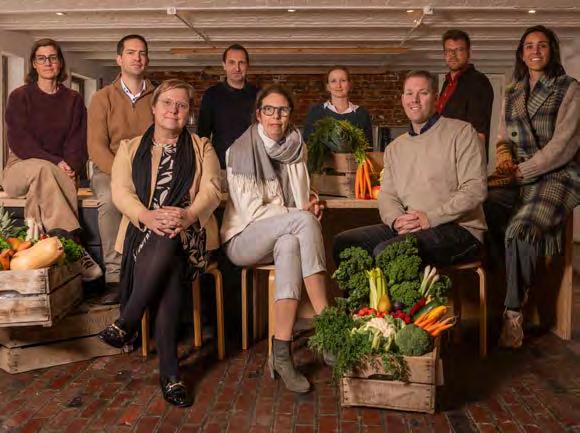
Ardo's daily operations are overseen by a dedicated team, led by CEO Gabrielle Kalkwijk. Gabrielle is further supported by a skilled and diverse management team, comprised of specialists in various domains of expertise. Together, they bring a wealth of knowledge and experience to ensure effective leadership within the organisation.
The CEO, Gabrielle Kalkwijk, is of Dutch nationality. She possesses solid operational experience in the food sector and has a strong track record as a leader of people and organisations. With her international background, Gabrielle has a good understanding of the requirements for leading a professional, international and multidimensional family business. She has a great passion for leadership and team development. Her motto is 'Achieving results by connecting people'. She is supported in the management of the company by the Executive Committee Team.
We are Ardo The path to a more sustainable food system Food safety, quality and innovation Respect for our employees Relationship with our stakeholders Minimal environmental impact Agronomy MIMOSA+ 88
Good governance
From left to right, starting above:
Olivia Verbeke, Pieter Verschraegen, Tijl Goens, Margot Haspeslagh, Klaas Mouton, Emilie Haspeslagh, Eveline Maertens, Gabrielle Kalkwijk, Jeff Preston. Davy Claerhout is missing on the picture.
Gabrielle Kalkwijk CEO since 2019
Gabrielle started her career in 1991 at the dairy company Friesland Campina. She lived and worked abroad for more than ten years; in Poland, Russia and Germany. From 2012 to 2019 she worked for the American family-owned company Dawn Foods, producing and marketing of ingredients for the bakery industry. She was also member of the Executive Board and responsible for ‘Manufacturing’ worldwide.
Davy Claerhout Chief Financial Officer since 2020
Davy is responsible for managing and leading the financial initiatives of Ardo. Davy has a longstanding career in finance: after four years working at EY, he worked at Alken-Maes in controlling for six years, after which he spent eight years at Thomas Cook, where he became the CFO for Continental Europe.
Tijl Goens Chief Operations Officer since 2023
As COO, Tijl is responsible for plant operations including group quality, agronomy, engineering, procurement, safety and continuous improvement. Tijl started his career at Deloitte and, four years later, he joined Ardo in the financial department. Since then, he has taken up several roles at Ardo. In 2018, Tijl took the responsibility of Regional Director for Benelux and Germany. He was responsible for sales and operations in both those countries.
Klaas Mouton Chief Commercial Officer since 2020
As CCO, Klaas is responsible for marketing, innovation and product development as well as sales. Before Ardo, Klaas gained almost twelve years of experience at Cargill, covering multiple commercial roles within their Food Ingredient business.
Pieter Verschraegen Chief Human Resource Officer since 2022
As CHRO, Pieter focuses on the transformation of HR to a future proof department. He started his career as Management Trainee at Carrefour. After that, he became HR Manager at Imtech NV (Construction/ telecom technology) for almost four years, whereafter he joined the EOC Group for ten years as Global HR Director.
Eveline Maertens Programme manager since 2022
Prior to joining Ardo, Eveline worked six years at Deloitte as financial auditor. After this, she worked three years at Omega Pharma and eleven years at Roularta Media Group. In both roles she worked in different areas of internal audit and finance. She joined Ardo in 2019 as Finance manager for Belgium but soon transitioned to her current role of Program manager. She was responsible for the implementation of Ardo’s transition programme (ERP). From March 2024 onwards, Eveline will be taking on the role of CFO at Ardo.
Margot Haspeslagh Third generation family member, Group Supply Chain Director since 2018
Prior to Ardo, Margot worked for almost five years at Solutia. She was responsible for scheduling and planning and joined the family business in 2012 as project manager. After becoming Group Supply Chain Director, Margot is responsible for overseeing the long-term production planning, inventory management as well as logistics and distribution.
Olivia Verbeke Director Corporate Development since 2017
Olivia started her professional career as General Manager in her own family business, after which she worked for seven years at Greif, first as Group Controller and later as Transformation and Integration Manager. Responsible for Corporate Development, Olivia oversees the development of Ardo’s corporate strategy as well as executing our Merger & Acquisition projects.
Jeff Preston Managing Director Americas since 2017
As Director Americas, Jeff oversees the growth strategy for Ardo in North and Latin America. Jeff joined the Ardo business when Ardo acquired VLM in 2017, creating ArdoVLM. He has been with the VLM organisation since 2002 in various commercial and leadership roles.
Emilie Haspeslagh Third generation family member, Sustainability Director since 2023
Prior to Ardo, Emilie worked two years at Vestas, a Danish wind turbine manufacturer. She joined the family business in the sales department, first in Germany and later in Spain. Prior to her current role, she was Business Unit Director for Fruit and Grilled & Fried products. As Sustainability Director, Emilie is responsible for developing and implementing a comprehensive sustainability strategy and oversees environmental and social responsibility initiatives.
We are Ardo The path to a more sustainable food system Food safety, quality and innovation Respect for our employees Relationship with our stakeholders Minimal environmental impact Agronomy MIMOSA+ 89 Good governance
6. Code of Conduct for employees and suppliers
At Ardo, we take responsibility together. We actively promote a culture centred on respect for business ethics, human and labour rights, safety and environmental sustainability. This commitment is twofold: it fosters a harmonious atmosphere among our colleagues internally and we extend these principles to our valued supplier partners externally.
Safeguarding integrity
Since the very beginning, our business practices have been guided by integrity, honesty, fair dealing and strict adherence to all applicable laws. Consequently, every Ardo employee is required to fully understand and adhere to our Code of Conduct in their daily work. The primary objective is to promote a culture of respect for business ethics, human and labour rights, safety and the environment.
We foster a transparent business culture by encouraging employees to report potential instances of fraud, bribery, corruption, or other unethical behaviour promptly. This implies that they should not be concerned about retaliation. Whistleblowers are assured that they will be treated fairly and their allegations will be investigated thoroughly and objectively.
To ensure awareness, we regularly inform our employees about our anti-bribery, fraud and corruption policy. This information is distributed in various ways, including our onboarding information package, company posters and our intranet. Moreover, an excerpt from the whistleblowing procedure is accessible on our website to inform third parties and provide direct access to our grievance mechanisms.
Implementing our Supplier Code of Conduct: Together we take responsibility
The Supplier Code of Conduct compels our supplier partners to endorse the core values that need to be embedded in every aspect of conducting business. By adhering to these values, we jointly commit to achieving ethical business conduct. This ensures that we meet our business objectives while creating a positive social impact and reducing our ecological footprint. It fosters a harmonious atmosphere among our colleagues internally and we extend these principles to our valued supplier partners externally.
One of the main objectives of our Supplier Code of Conduct is to stimulate responsible sourcing. It establishes conditions and expectations for our suppliers, producers, external manufacturers and other supply chain stakeholders regarding labour, ethical and legal compliance, environment and (food) safety, based on the following guiding principles:
1. Obey the law.
2. Conduct business with integrity.
3. Keep accurate and honest records.
4. Honour business obligations.
5. Treat people with dignity and respect.
6. Protect Ardo’s information, assets and interests.
7. Minimise environmental impact.
8. Ensure quality and food safety.
Our goal is to build trusting relationships with carefully selected suppliers and partners who adhere to these eight principles, ensure that all parties have a long-term, sustainable and successful future.
We are Ardo The path to a more sustainable food system Food safety, quality and innovation Respect for our employees Relationship with our stakeholders Minimal environmental impact Agronomy MIMOSA+ 90 Good governance
7. Sustainability governance
To implement our sustainability strategy and achieve our sustainability goals, we have created a governance structure that oversees our sustainability efforts at Group level.
Our corporate sustainability programme is governed by:
Group Sustainability Director, Emilie Haspeslagh, active since 2011 within Ardo mainly in commercial and business unit roles. She took on the responsibility of Sustainability Director on 1st of January 2023.
Group Sustainability Coordinator, Stephanie Cobbaert, recently joined the team. She is fully committed to harmonising our sustainability strategy throughout the Ardo Group and supporting the implementation of Ardo’s sustainability strategy.
Sustainability Working Group, comprises members of the HR, agronomy, engineering, procurement, marketing and innovation departments. This working group is responsible for implementing our sustainability strategy and overseeing various actions and campaigns.
Monthly Sustainability Committee focuses on:
- KPI tracking: Monitoring and evaluating sustainability KPIs.
- Project management: Overseeing and following-up the progress of sustainability projects such as double materiality assessment, carbon footprint measurements or decarbonisation roadmap.
- MIMOSA+ implementation: scaling up the regenerative agriculture practices in our supply base.
- Fostering awareness: Promoting a culture of responsibility.
- CSR Reporting.
The members of the Sustainability Committee are:
Emilie Haspeslagh (Sustainability Director), Tijl Goens (COO), Gabrielle Kalkwijk (CEO), Pieter Verschraegen (CHRO), Emmanuel Jadin (Agronomy Director)
Our global sustainability strategy is integrated into our commercial and operational strategies. We encourage our various sites and countries to set up local sustainability programmes, focusing on key local priorities and challenges.

We are Ardo The path to a more sustainable food system Food safety, quality and innovation Respect for our employees Relationship with our stakeholders Minimal environmental impact Agronomy MIMOSA+ 91 Good governance
ESRS and GRI reference table
BP-1 General basis for preparation of the sustainability statements
BP-2 Disclosures in relation to specific circumstances
GOV-1 The role of the administrative, management and supervisory bodies
GOV-2 Information provided to and sustainability matters addressed by the undertaking’s administrative, management and supervisory bodies
GOV-3 Integration of sustainability-related performance in incentive schemes
p 2, 13, 14, 84
p 84
2-12, 2-13, 2-14, 2-17 and 405-1p 85-89, 91
p 87
GOV-4 Statement on sustainability due diligence p 87
GOV-5 Risk management and internal controls over sustainability reporting
SBM-1 Market position, strategy, business model(s) and value chain
ESRS 2: General disclosures
ESRS E1: Climate change
p 87
2-7, 2-22 and 201-1 p 3, 4, 7-17 SBM-2 Interests and views of stakeholders
p 25-26 SBM-3 Material impacts, risks and opportunities and their interaction with strategy and business model(s)
IRO-1 Description of the processes to identify and assess material impacts, risks and opportunities
p 24-27
p 24-27
IRO-2 Disclosure Requirements in ESRS covered by the undertaking’s sustainability statements p 24-27
ESRS E4: Biodiversity and ecosystems E4-3
E5-2
policies
p 29-32
ESRS S2: Workers in the value chain
ESRS S4: Consumers and end-users
ESRS G1: Business conduct
and resources related to resource use and circular economy
to
indicators
Training and skills development indicators
S1-14 Health and safety indicators 403-8, 403-9 and 403-10 p 69
S2-4 Taking action on material impacts on value chain workers, and approaches to mitigating material risks and pursuing material opportunities related to value chain workers, and effectiveness of those actions 3-3 p 76-77
S2-5 Targets related to managing material negative impacts, advancing positive impacts, and managing material risks and opportunities 3-3 p 82
S4-4 Taking action on material impacts on consumers and end-users, and approaches to mitigating material risks and pursuing material opportunities related to consumers and end-users, and effectiveness of those actions 3-3 p 56-59
S4-5 Targets related to managing material negative impacts, advancing positive impacts, and managing material risks and opportunities 3-3 p 64
G1-1 Corporate culture and business conduct policies 2-12, 2-23, 2-24, 2-26, 3-3 and 205-2p 90
G1-2 Management of relationships with suppliers 308-1, 308-2, 414-1 and 414-2 p 76-77, 90
G1-3 Prevention and detection of corruption or bribery 2-16, 2-26, 3-3 and 205-1 p 90
92 Topic ESRS disclosure Corresponding GRI disclosure/s Location of relevant information in this report
2-2
2-4
2-9,
2-12,
2-13 and 2-16 p 85-89, 91
2-19
2-14
2-6,
2-19
3-2
3-1
3-3
Actions
in relation
3-3
Metrics in relation to material sustainability
3-3
Tracking effectiveness of policies and actions through targets 3-3 p 27
MDR-P Policies adopted to manage material sustainability matters
p 27 MDR-A
and resources
to material sustainability matters
p 27 MDR-M
matters
p 27 MDR-T
E1-2 Policies
3-3
3-3
E1-5 Energy consumption and mix 302-1, 302-2 and 302-3 p 32, 39 E1-6 Gross scopes 1, 2, 3 and total GHG emissions 305-1, 305-2, 305-3 and 305-4 p 29, 37, 39 E1-9 Potential financial effects from material physical and transition risks and potential climate-related opportunities 201-2 p 42-52
E3: Water and marine resources E3-2 Actions and resources related to water and marine resources 3-3 p 33-35, 48 E3-3 Targets related to water and marine resources 3-3
E3-4 Water consumption 303-3 p 33-35, 39,
53
related to climate change mitigation and adaptation
p 29-32 E1-3 Actions and resources in relation to climate change
ESRS
p 39, 53
48,
Actions
3-3
Targets related to biodiversity and ecosystems 3-3
and resources related to biodiversity and ecosystems
p 46-47 E4-4
p 46-47, 53
Actions
3-3
306-2
Targets
3-3
Resource inflows 301-1
ESRS E5: Resource use and circular economy Resource outflows 306-3,
and
p 33-35 E5-3
related to resource use and circular economy
p 39 E5-4
and 301-2 p 36 E5-5
306-4 and 306-5 p 33-36, 39
S1-5 Targets related
managing material negative
advancing positive
and opportunities 3-3 p 73 S1-6 Characteristics of the undertaking’s employees 2-7
401-1
ESRS S1: Own workforce
impacts,
impacts, and managing material risks
and
p 66
Diversity
2-9
S1-9
and 405-1 p 68
402-2,
S1-13
404-1 and 404-3 p 71
FOLLOW ARDO AT WWW.ARDO.COM
ARDO FOODS NV - WEZESTRAAT 61, 8850 ARDOOIE (BELGIUM)














































































 We are Ardo
We are Ardo




















































































 We are Ardo The path to a more sustainable food system
Food safety, quality and innovation
Relationship with our stakeholders Good governance
We are Ardo The path to a more sustainable food system
Food safety, quality and innovation
Relationship with our stakeholders Good governance


























